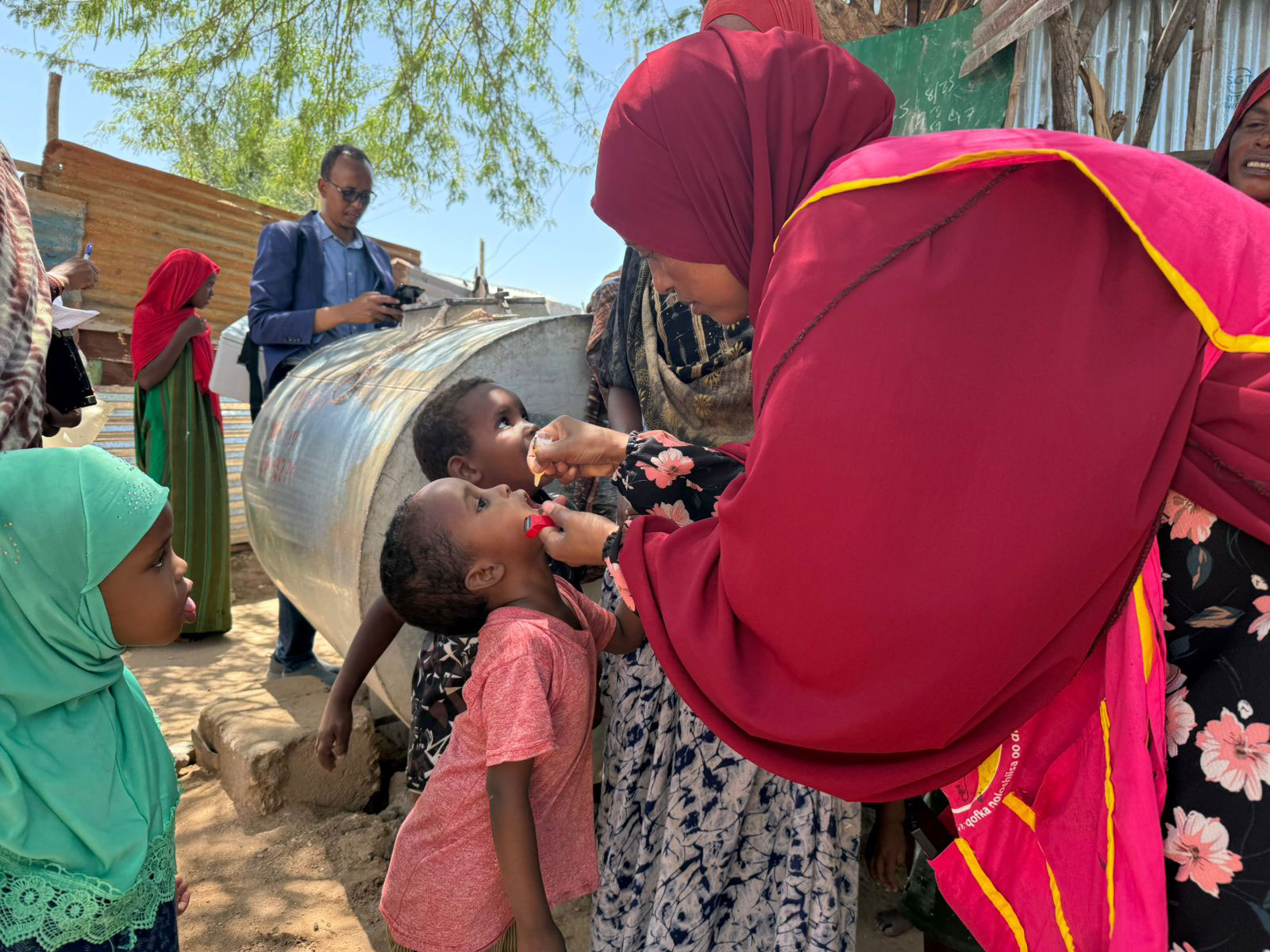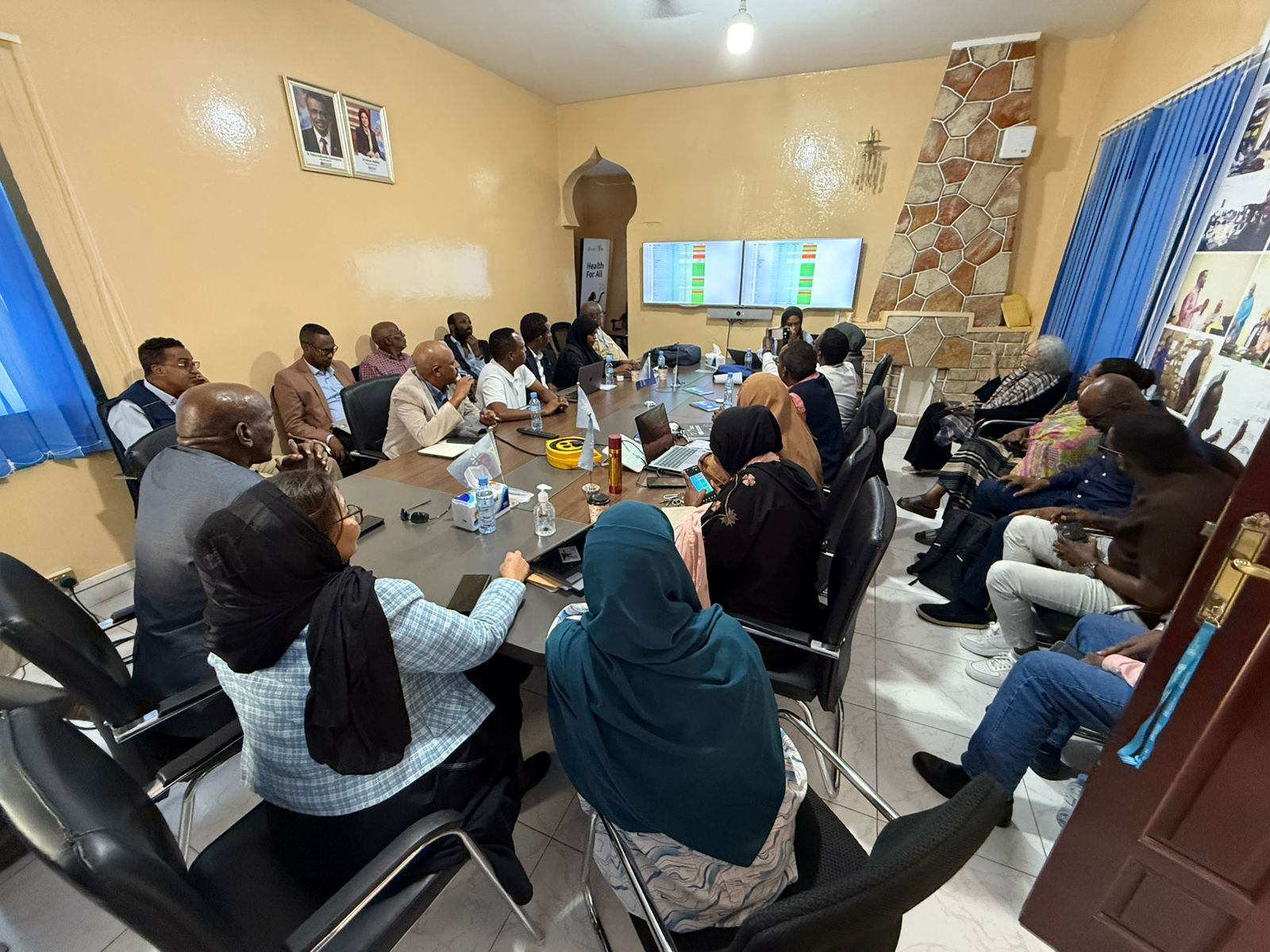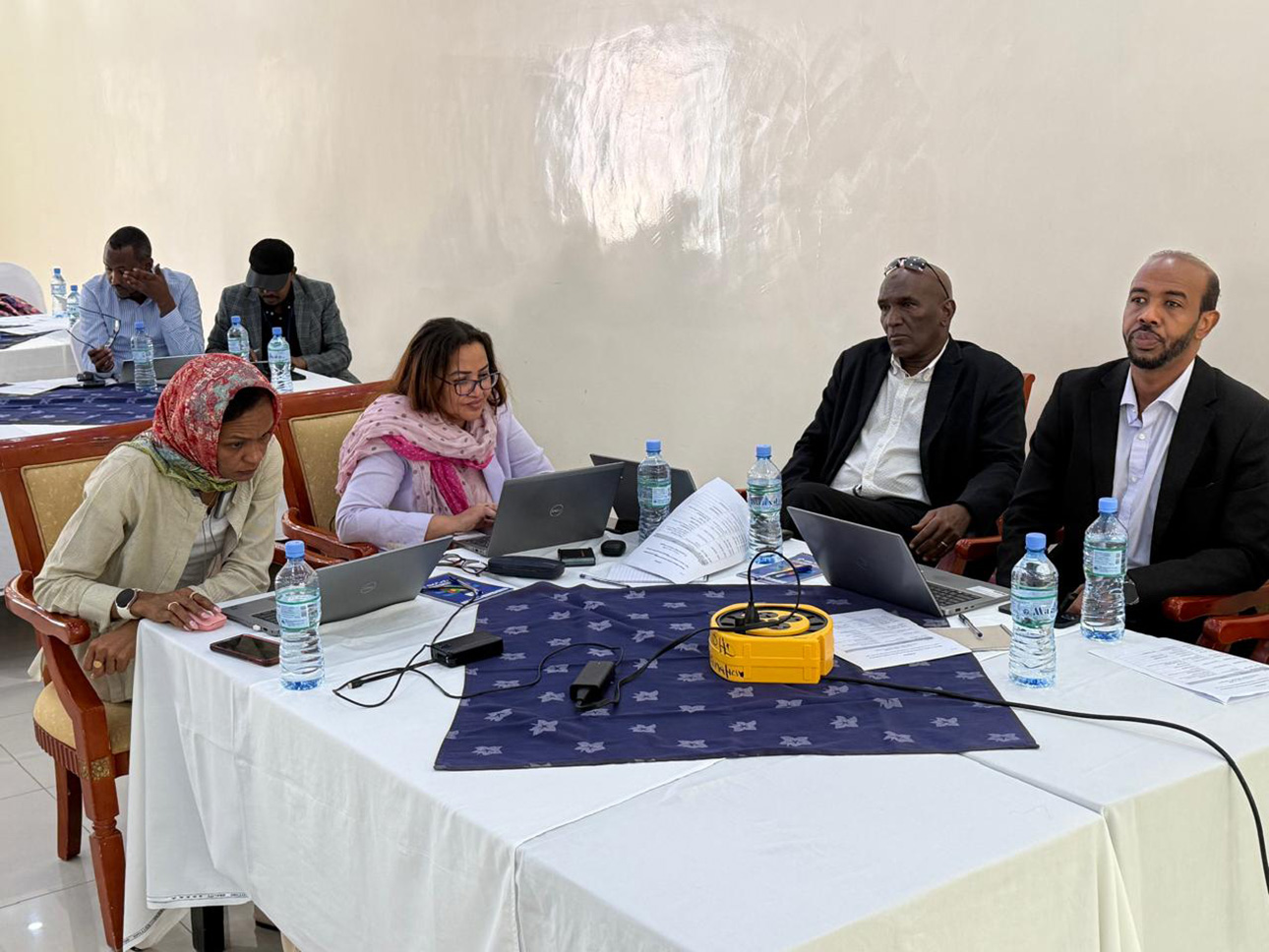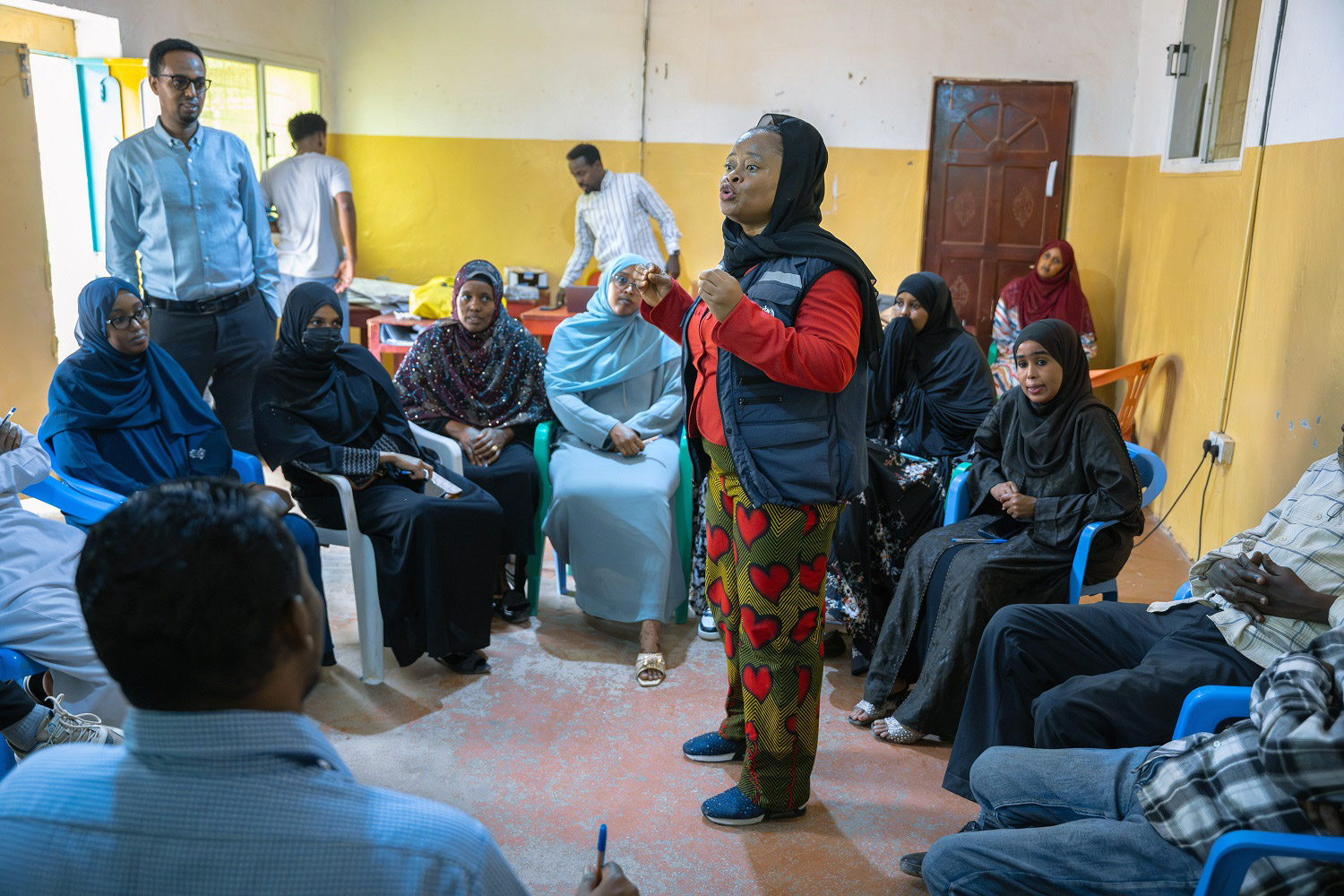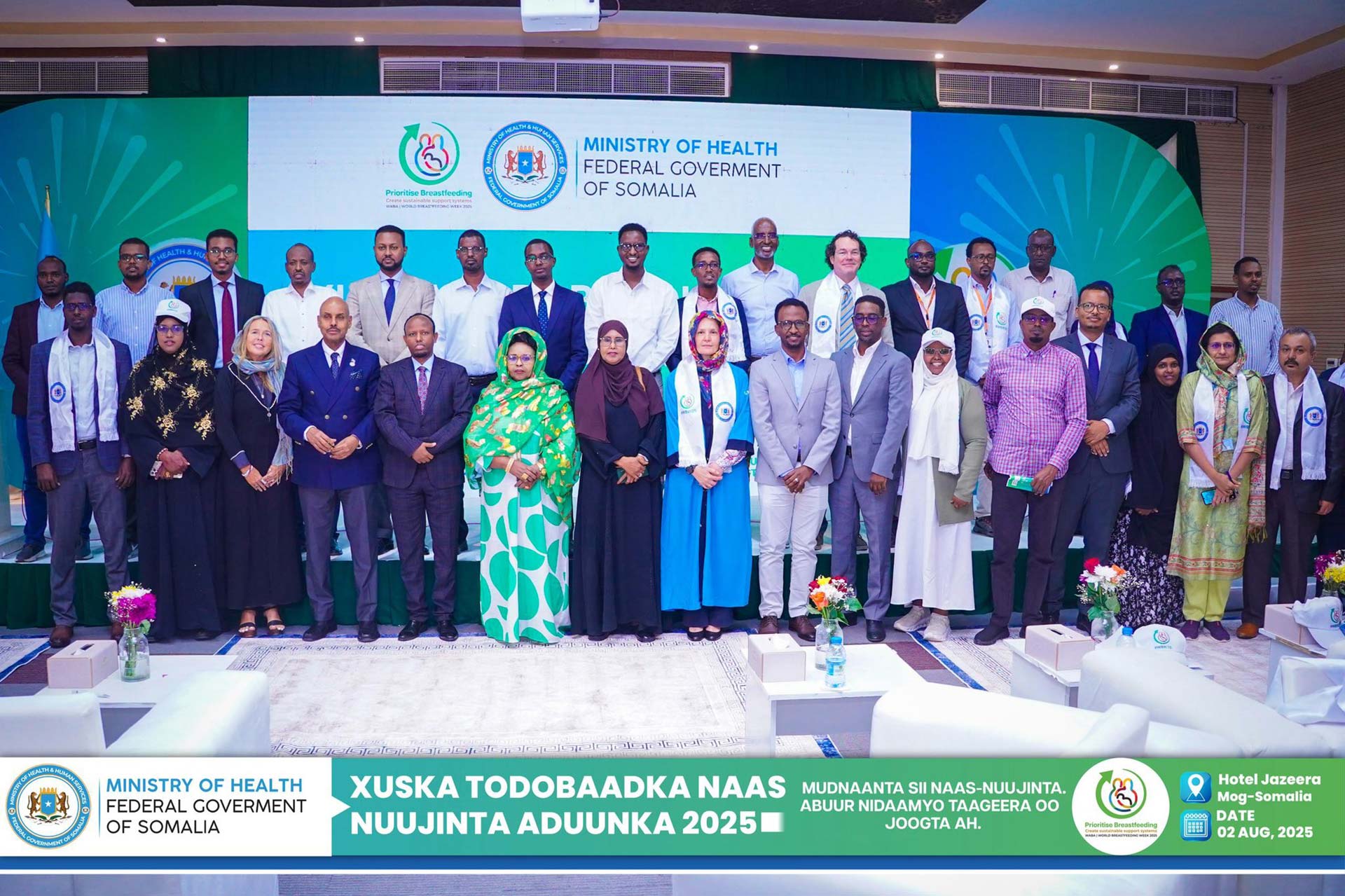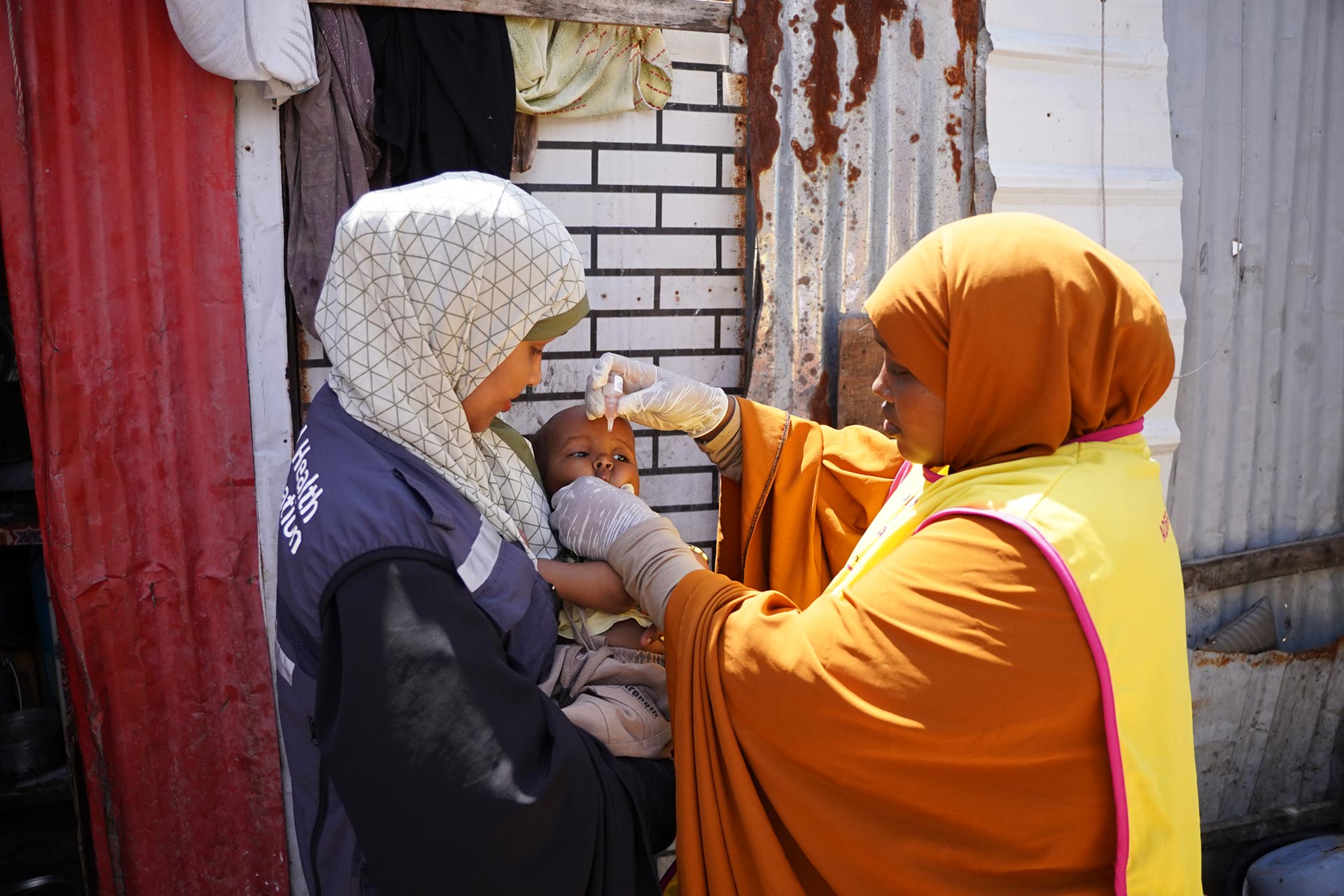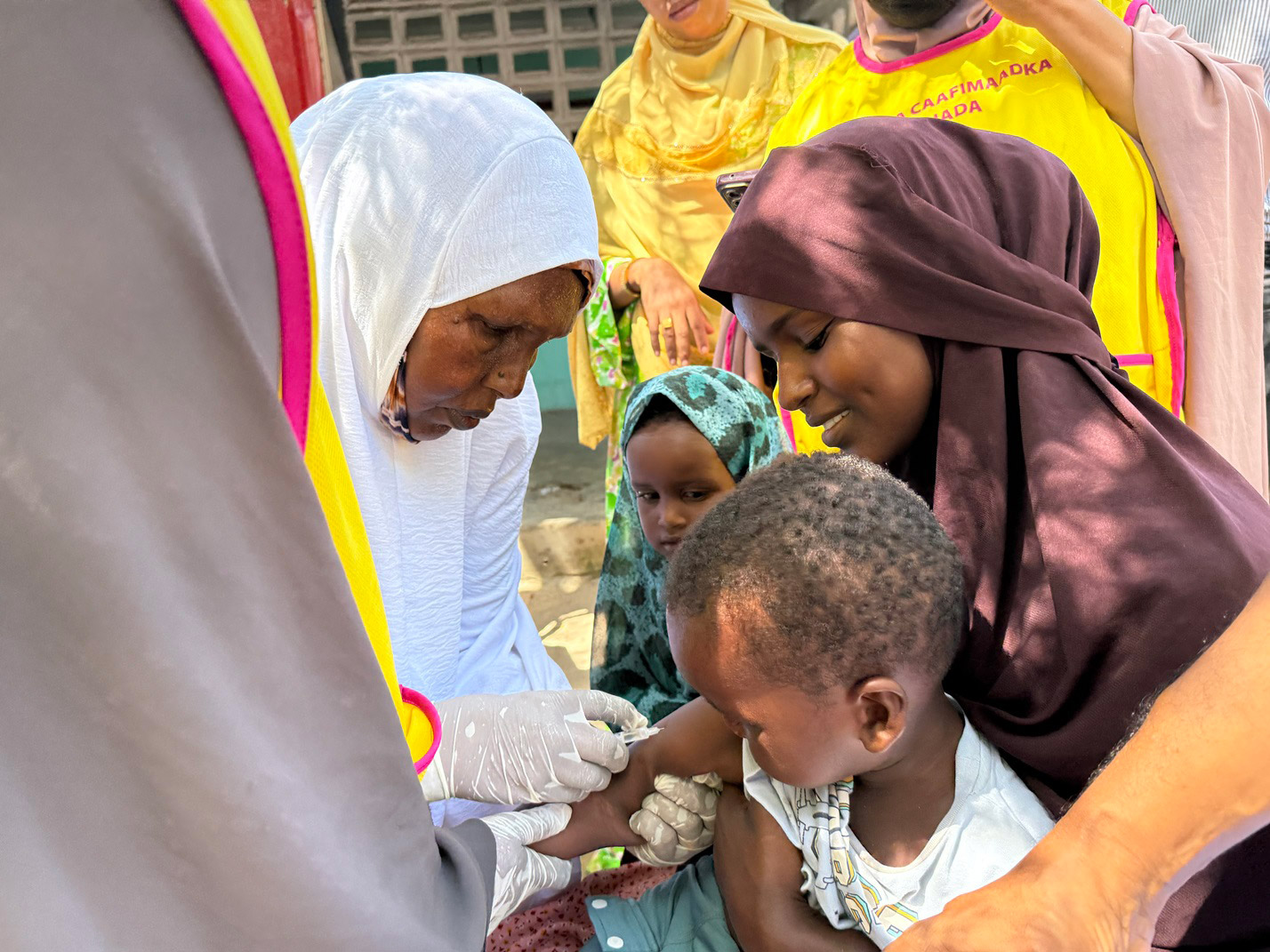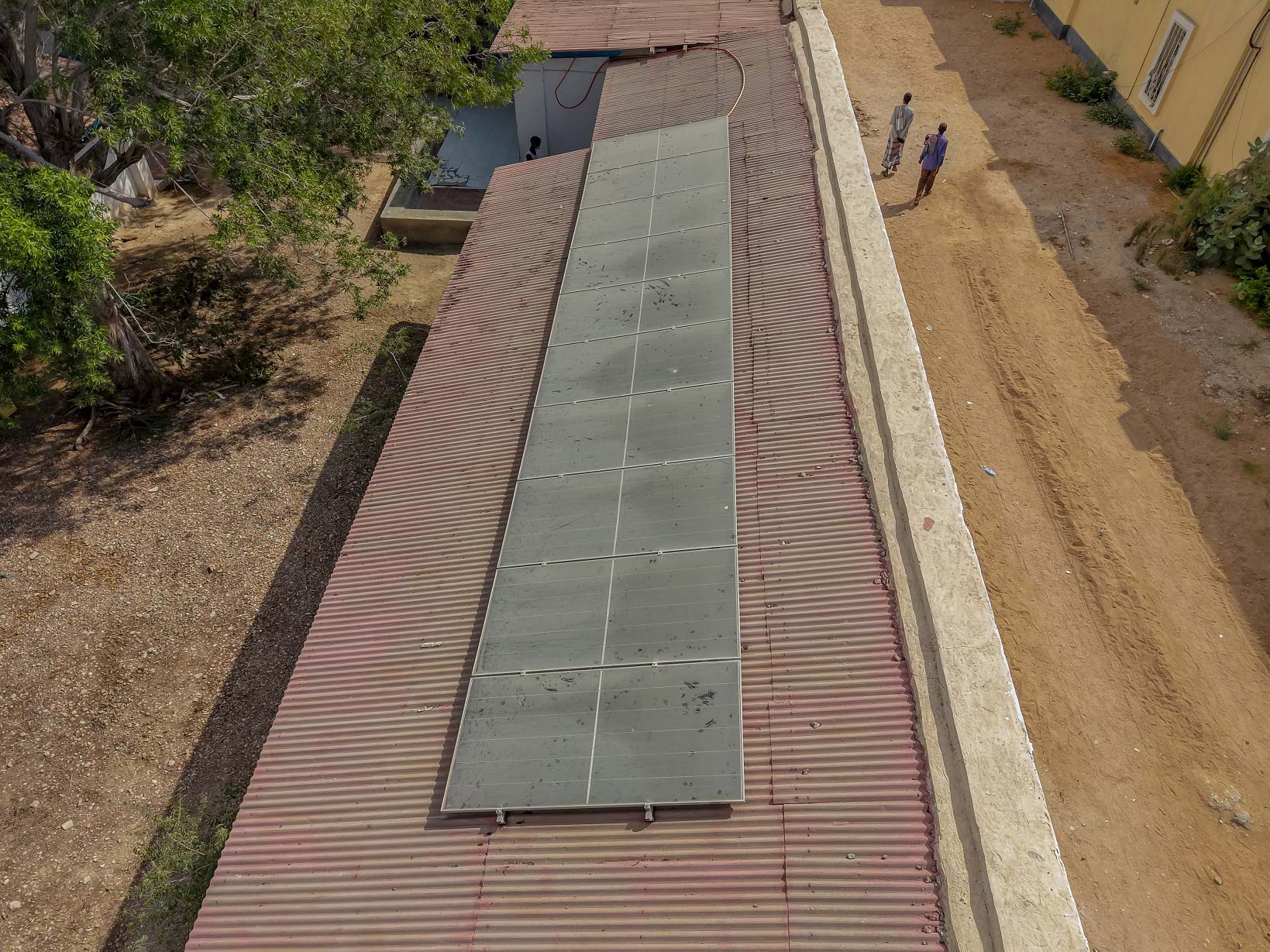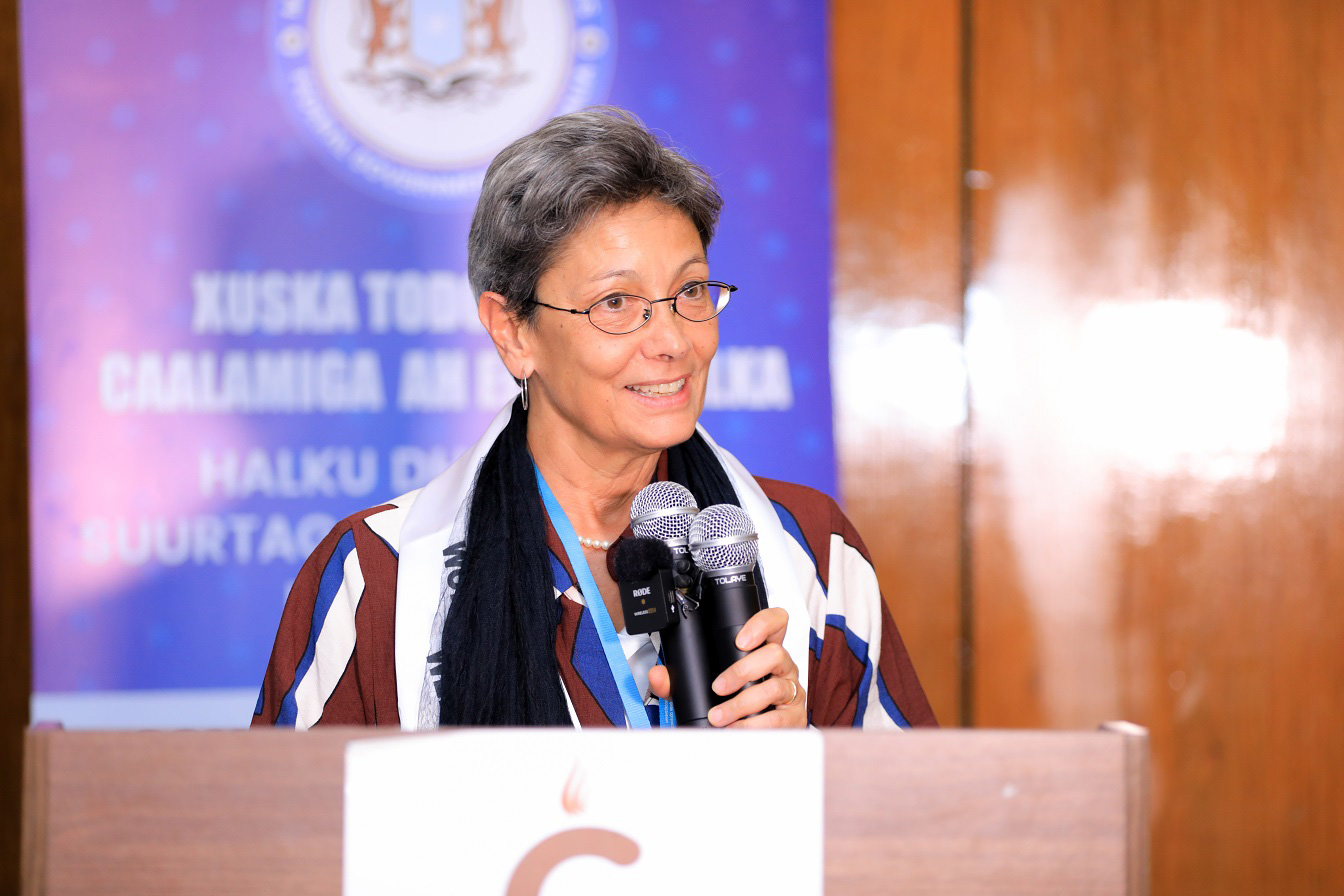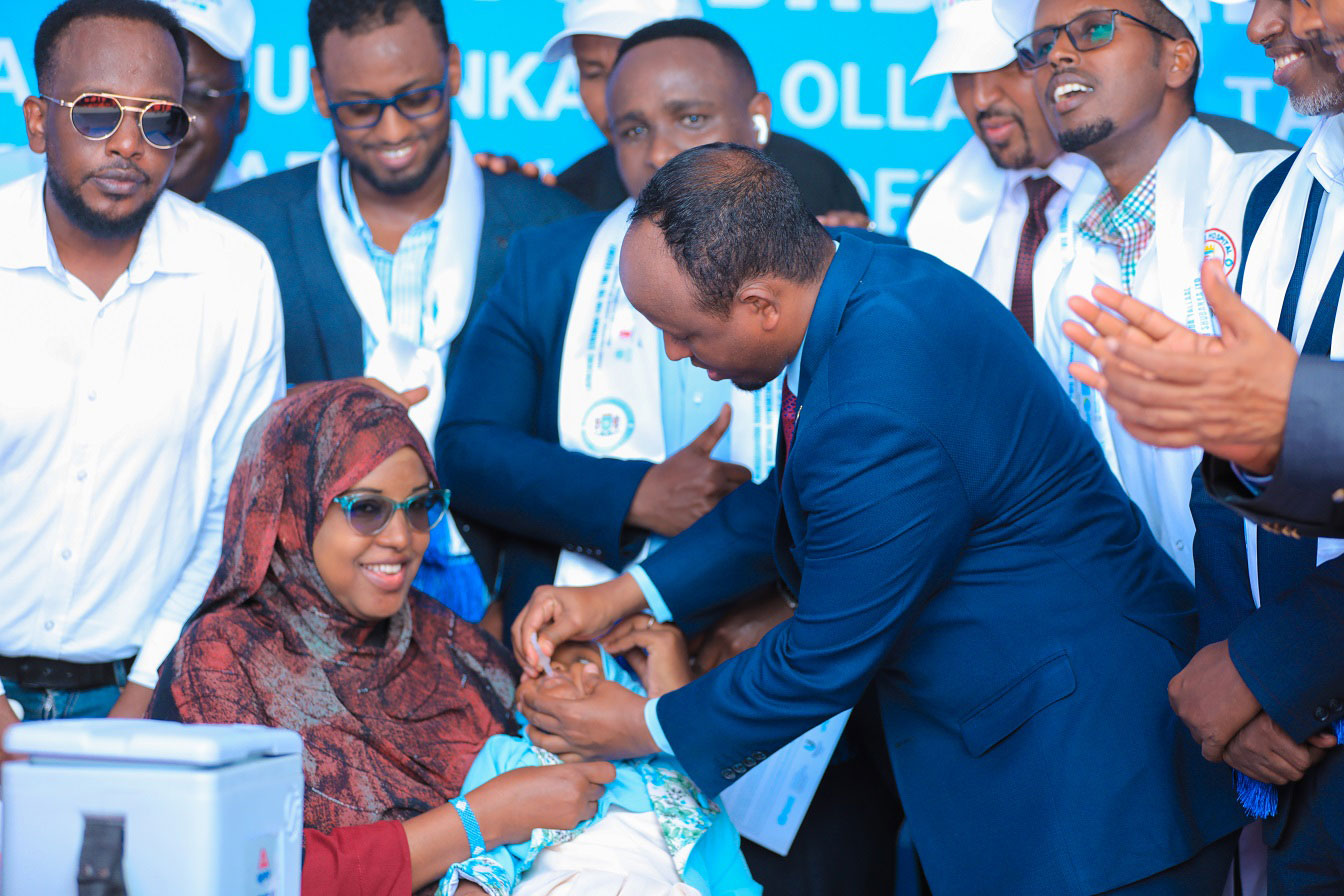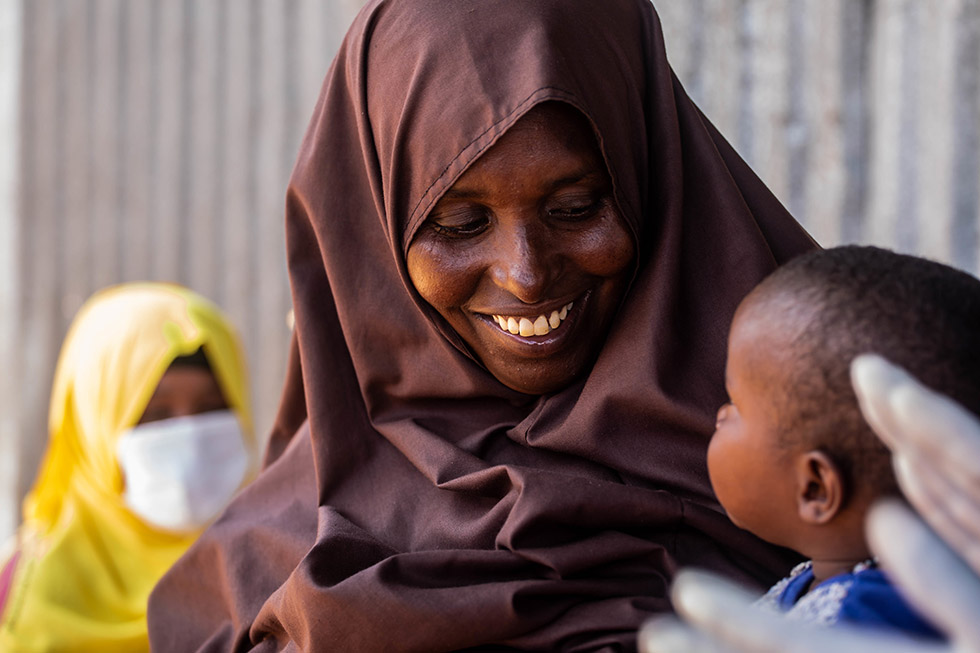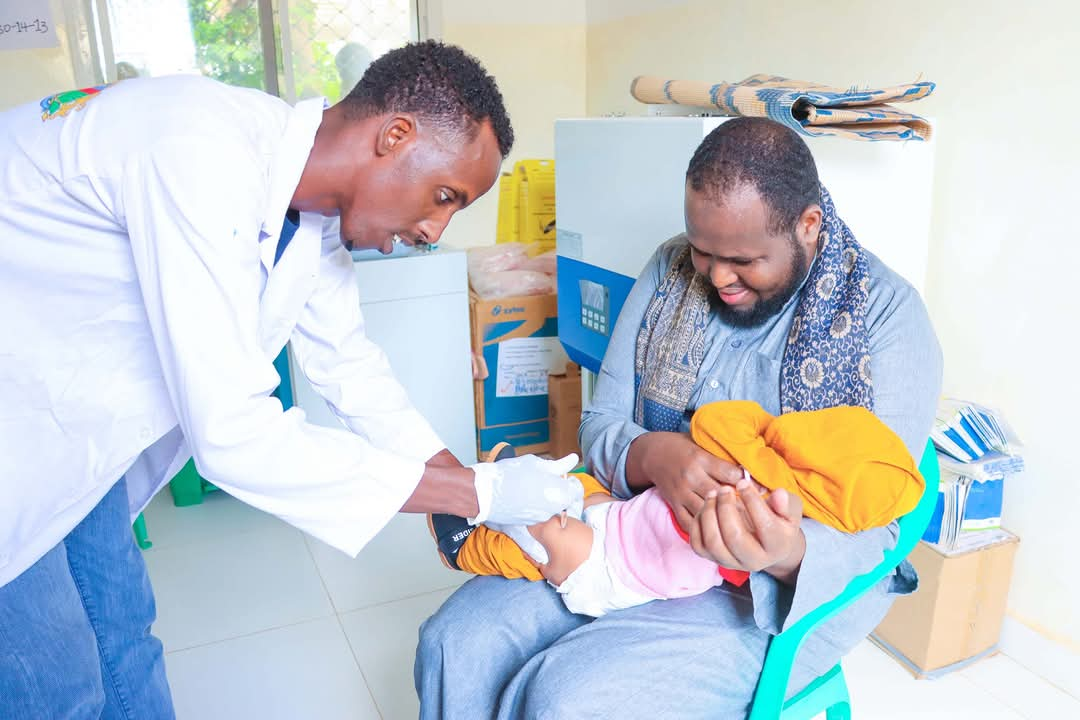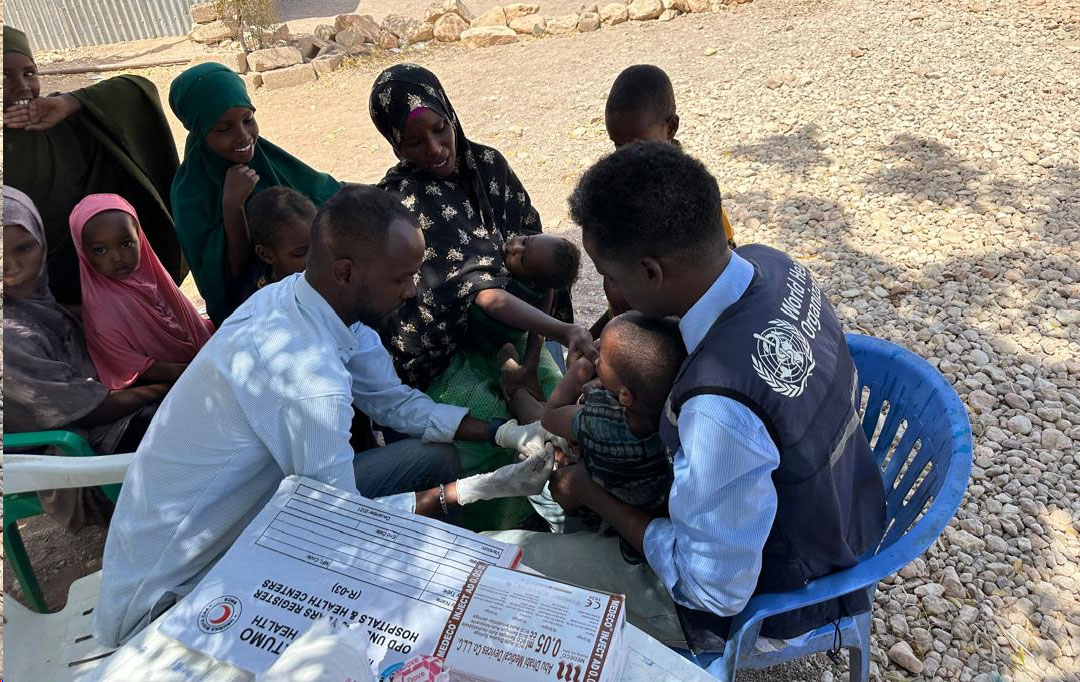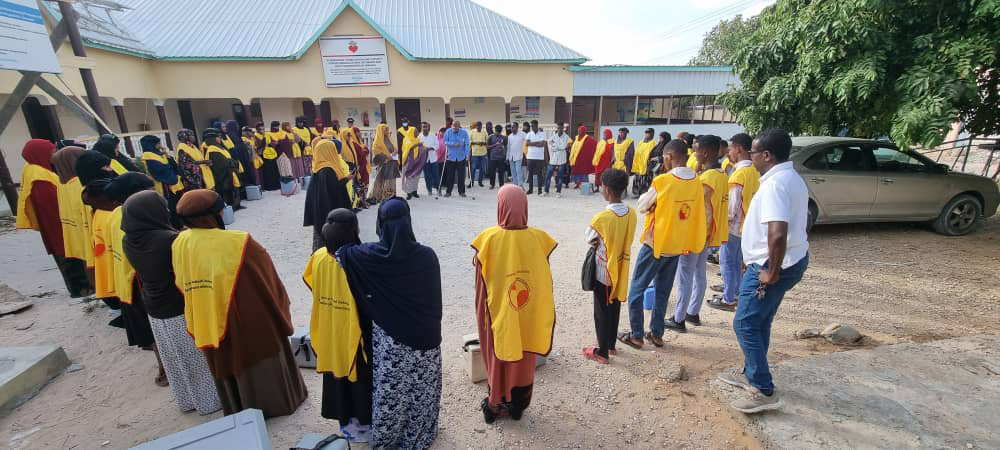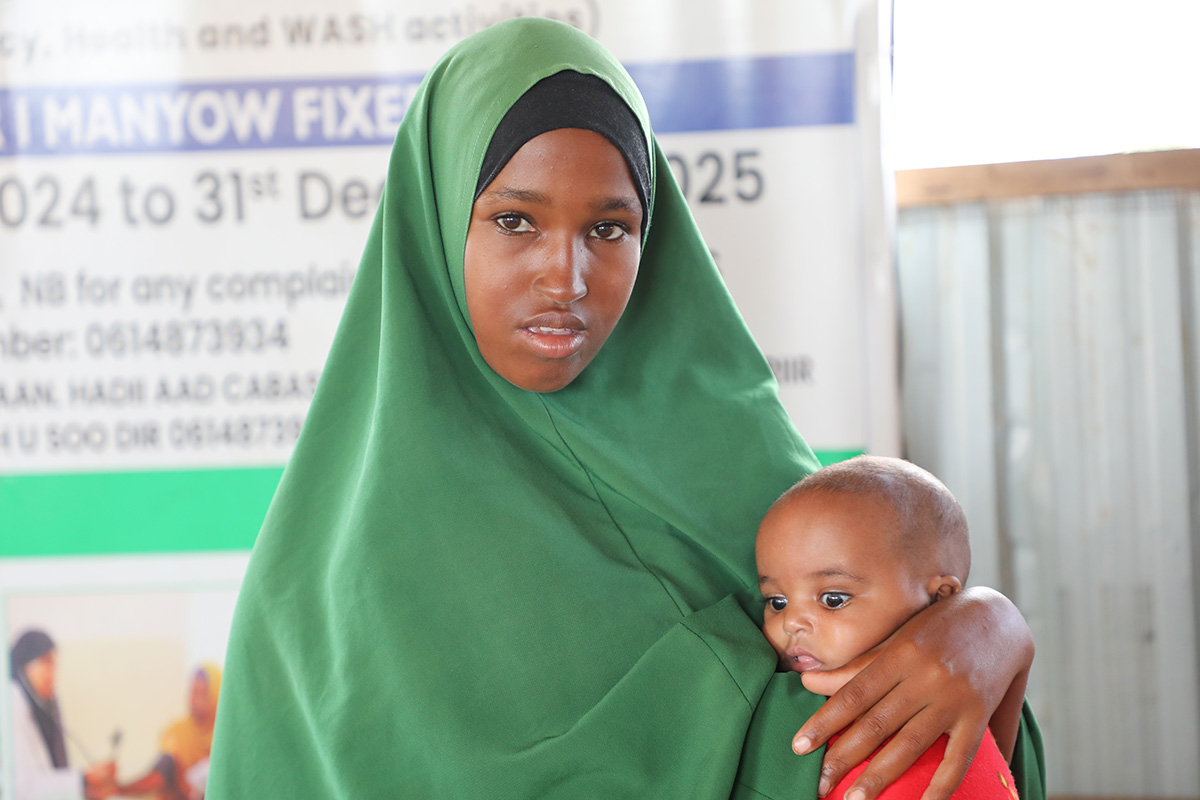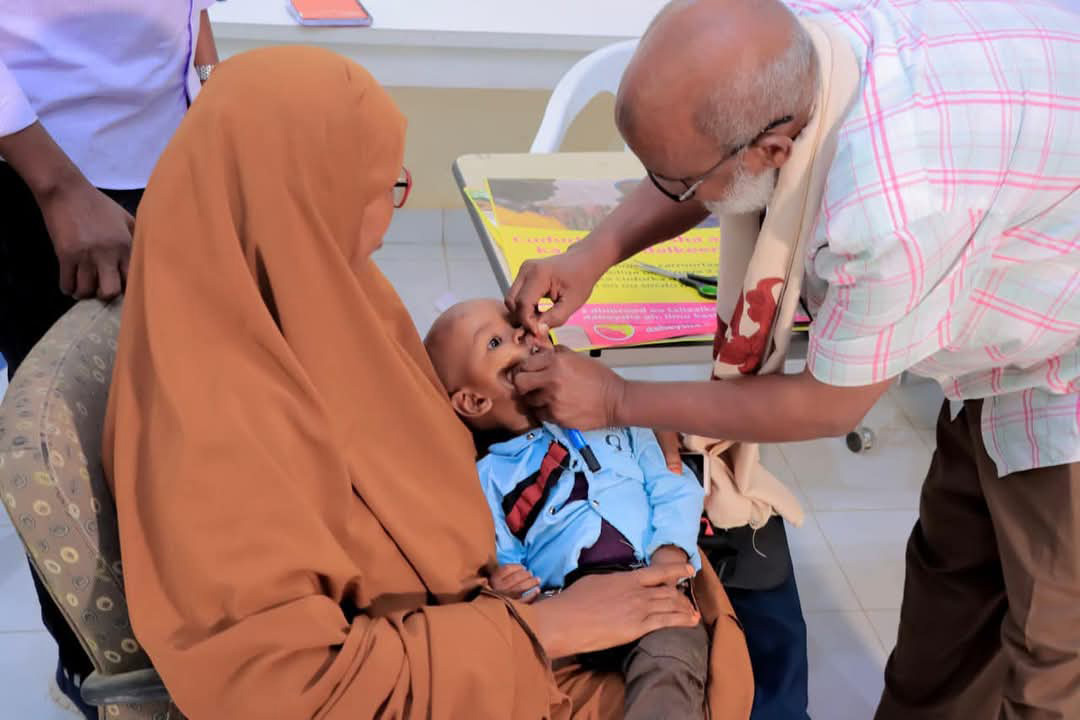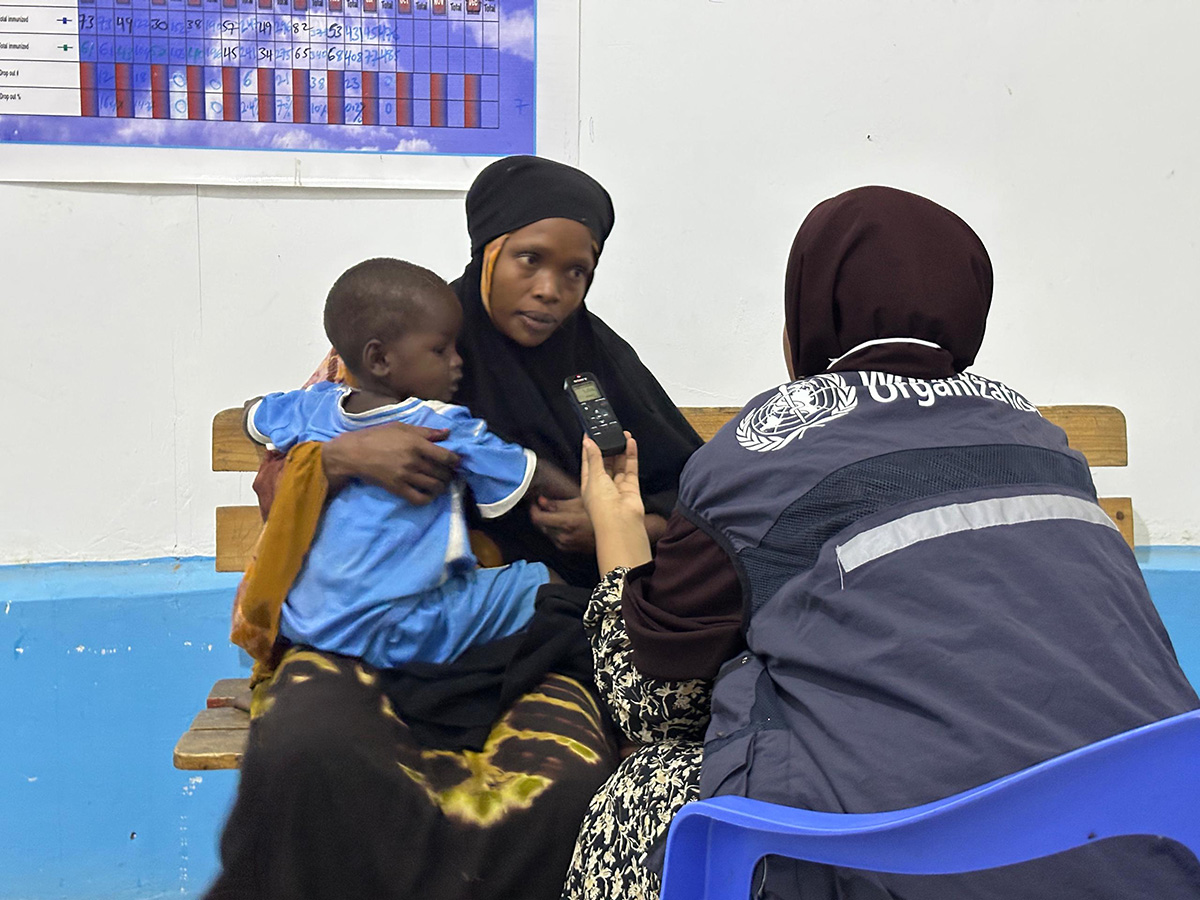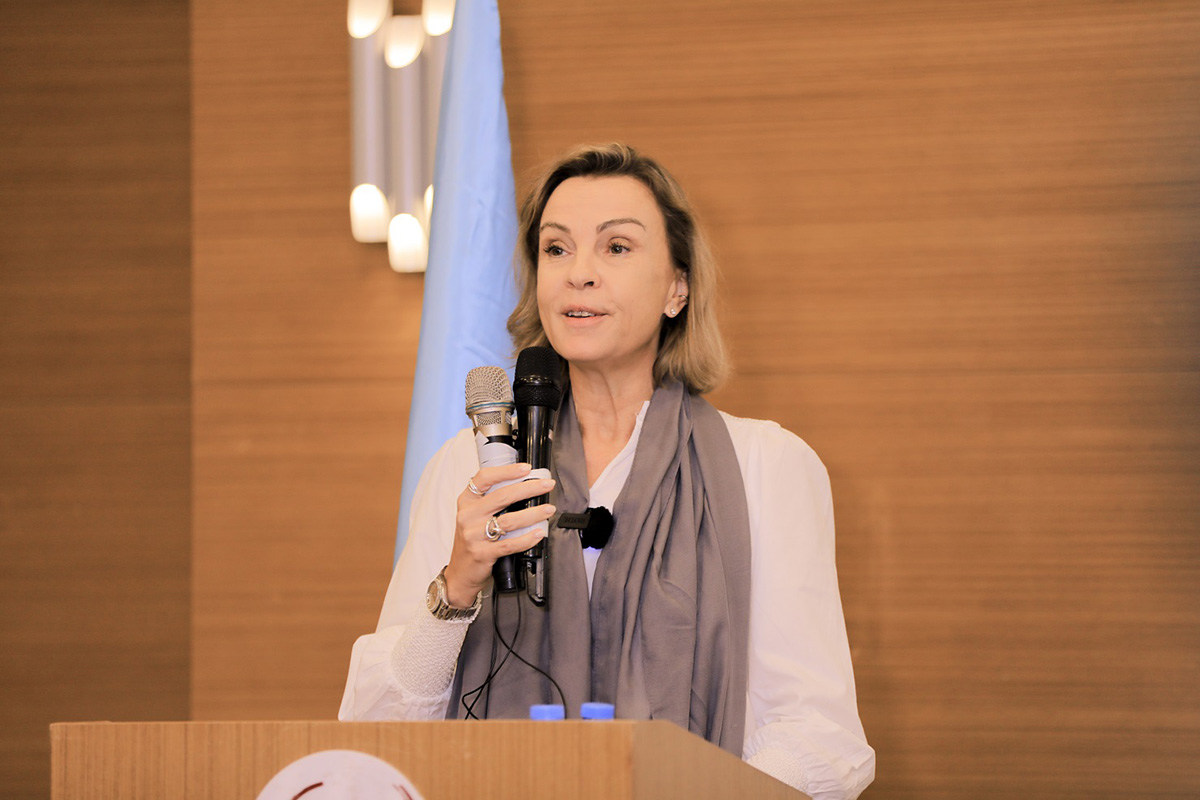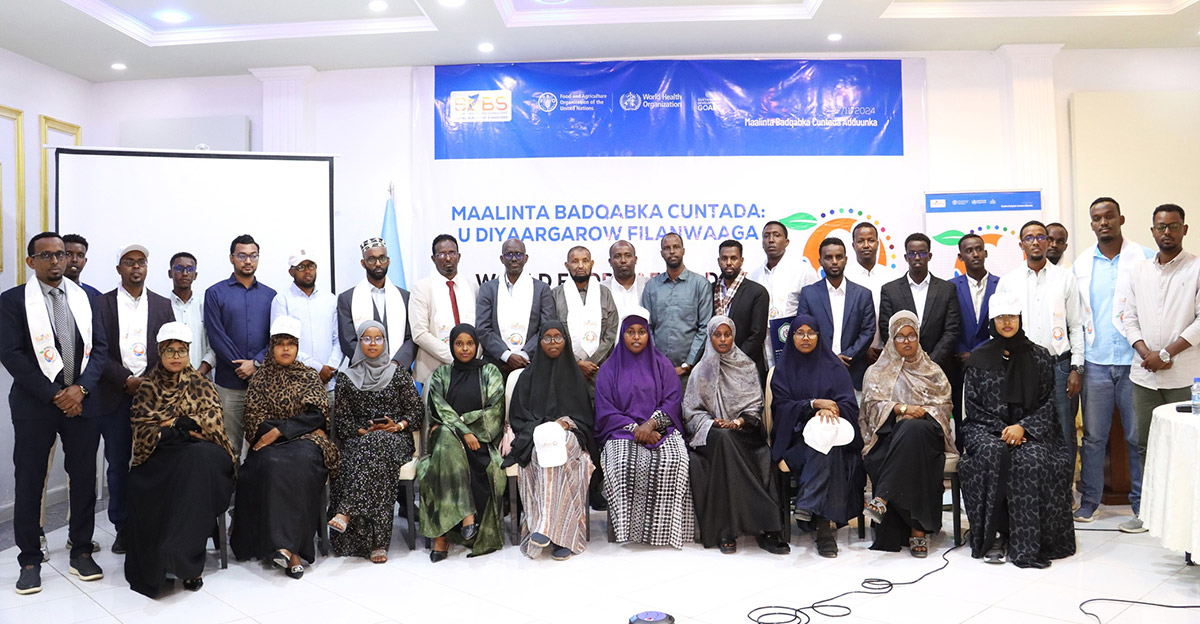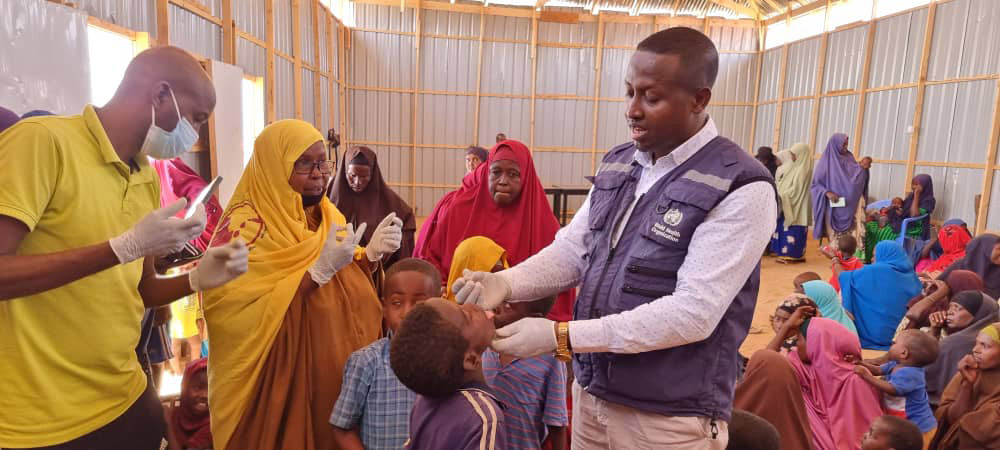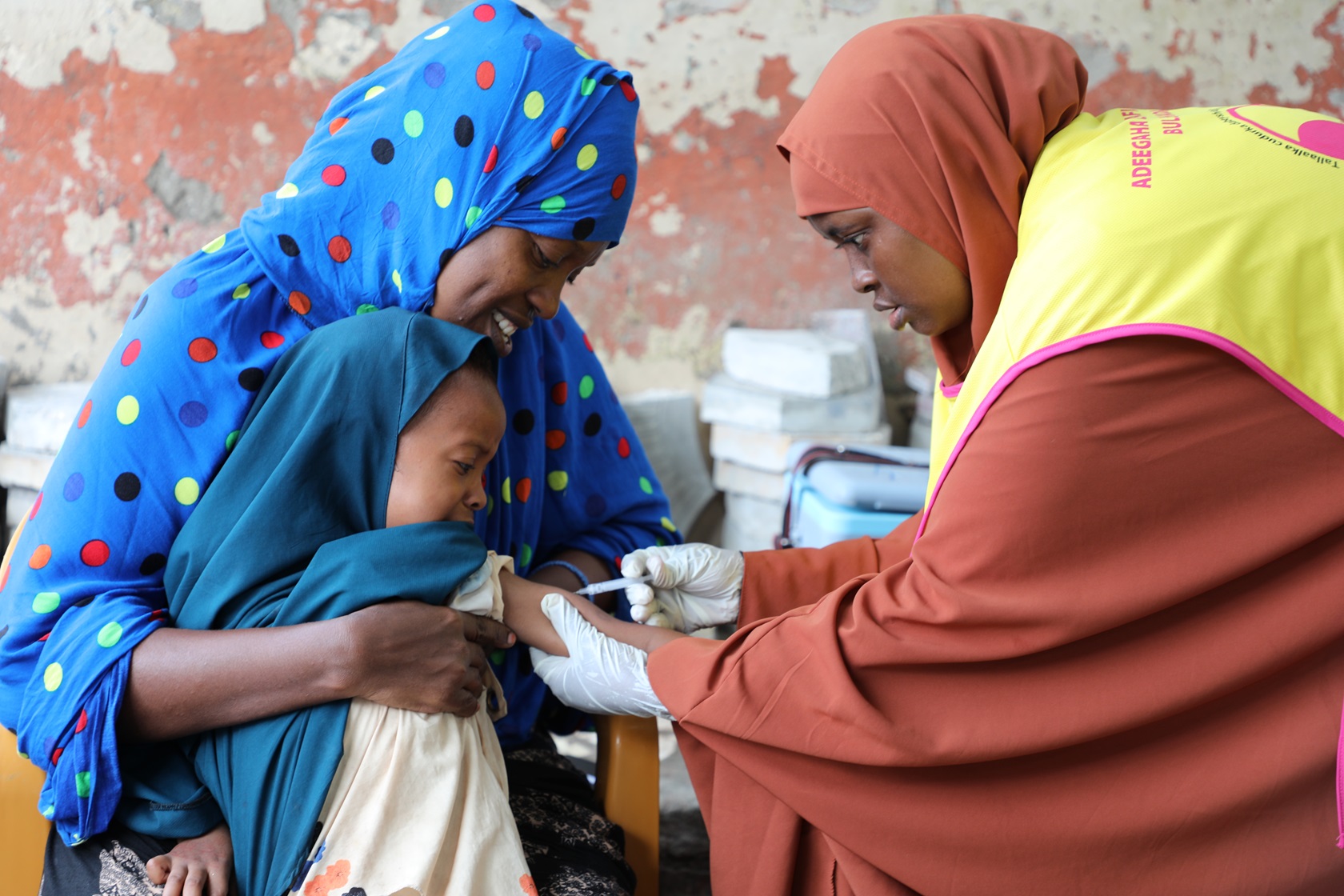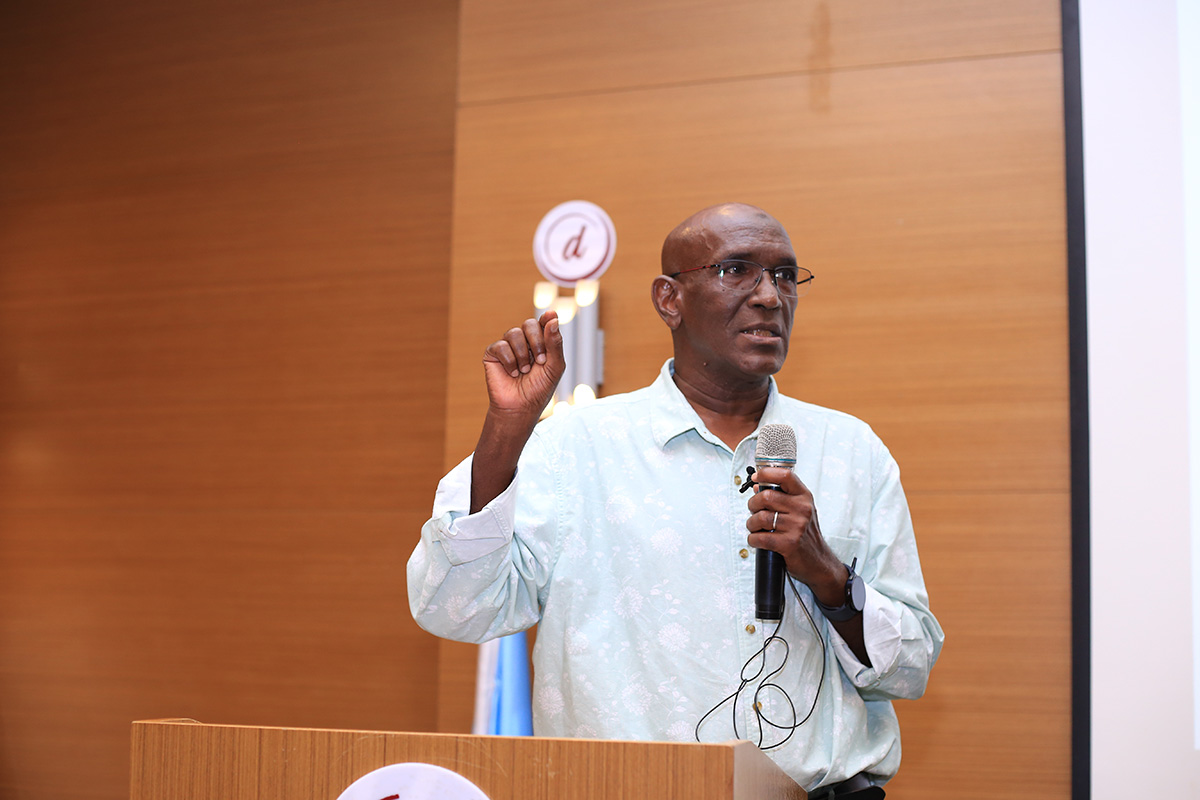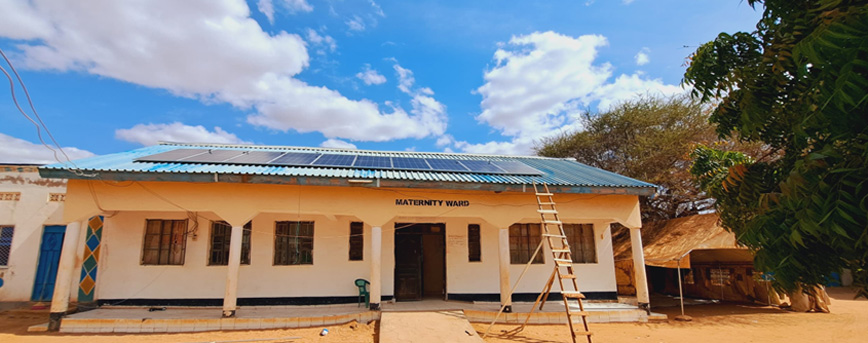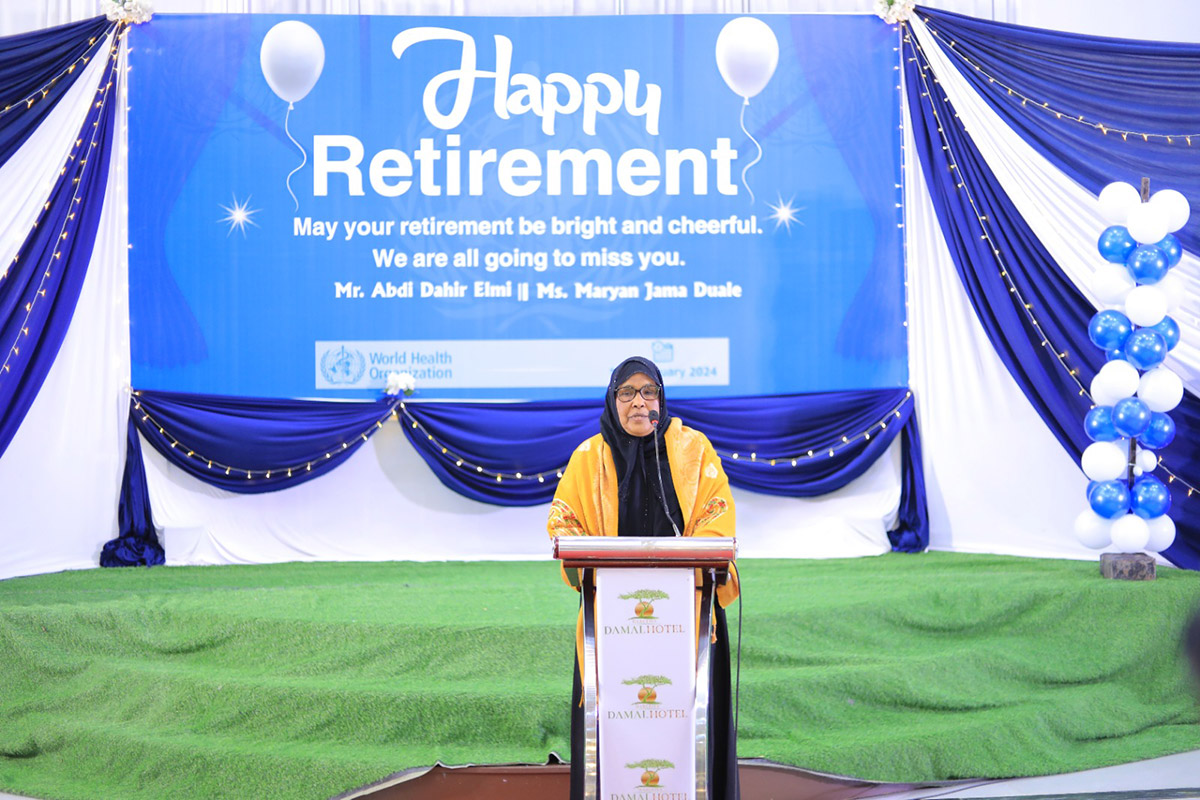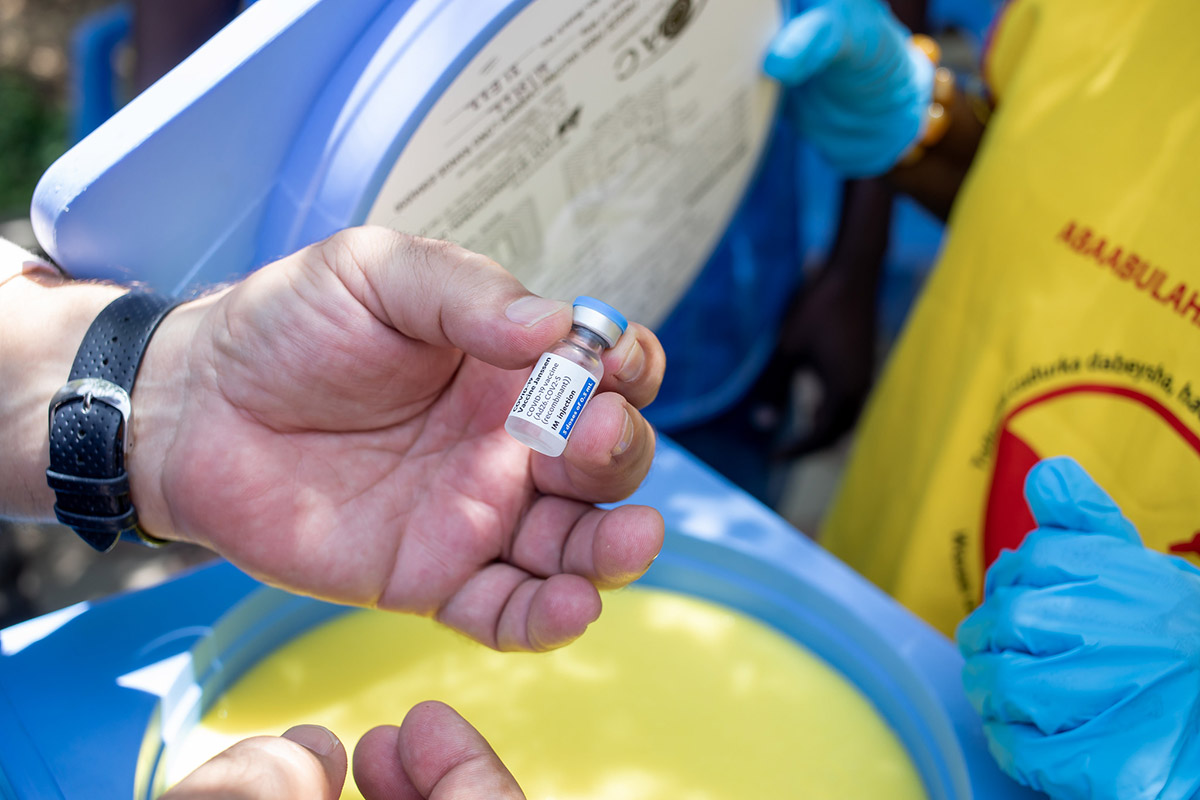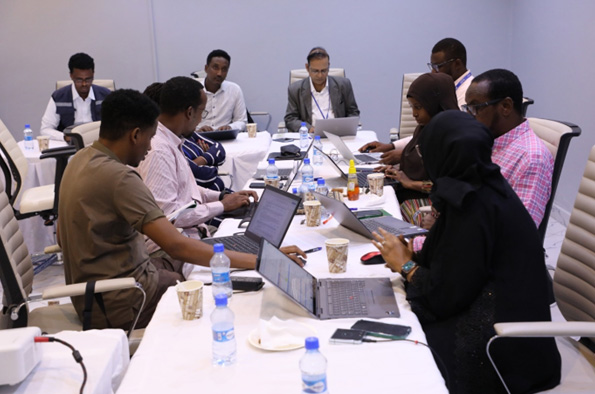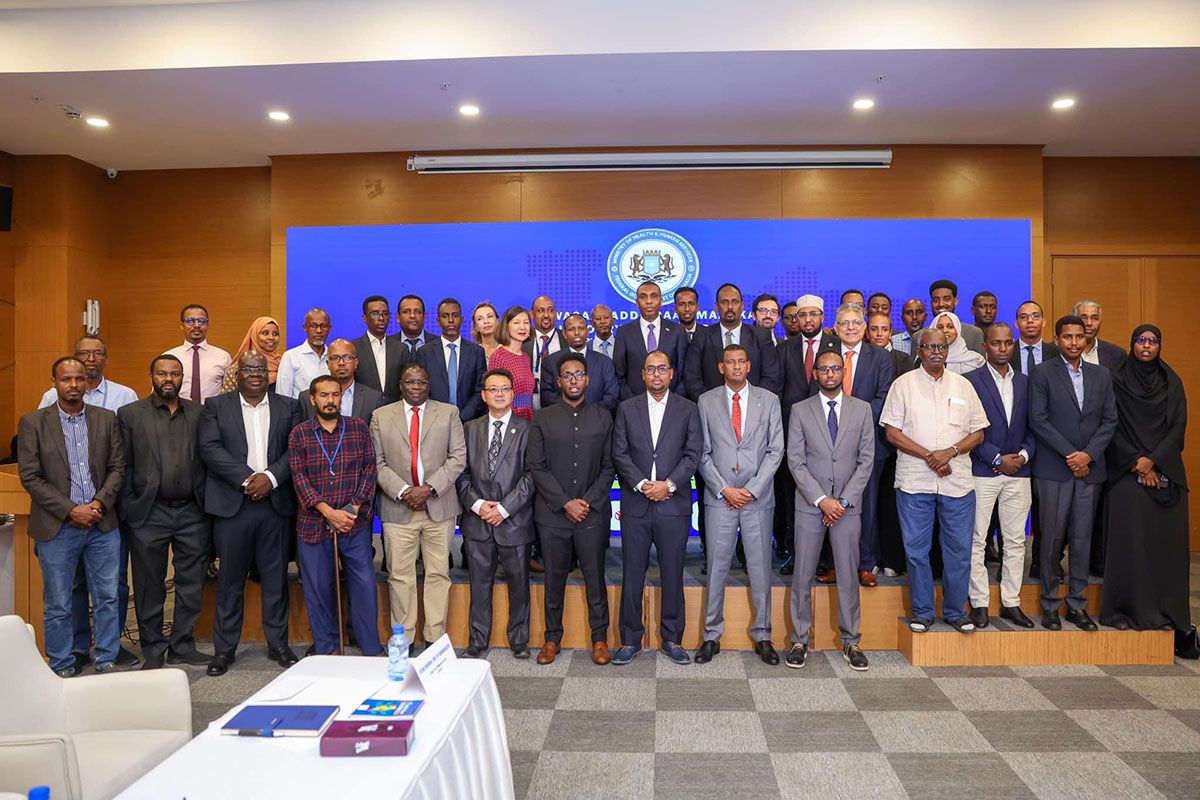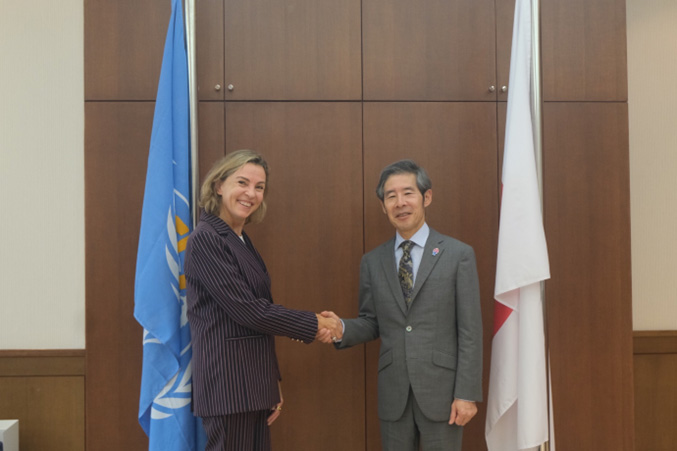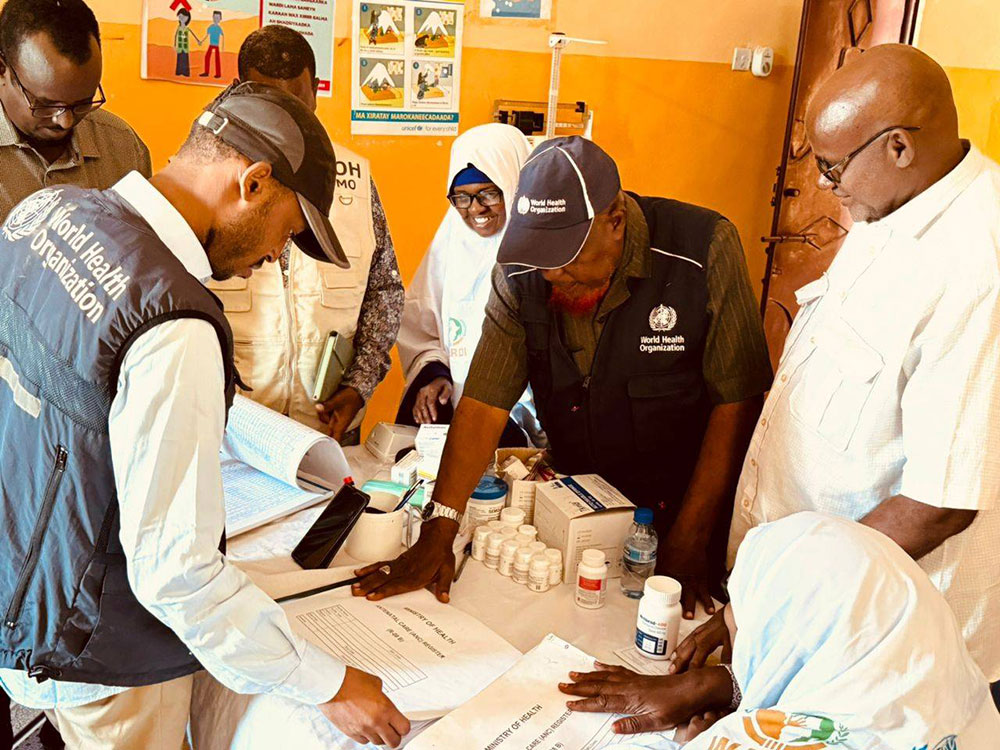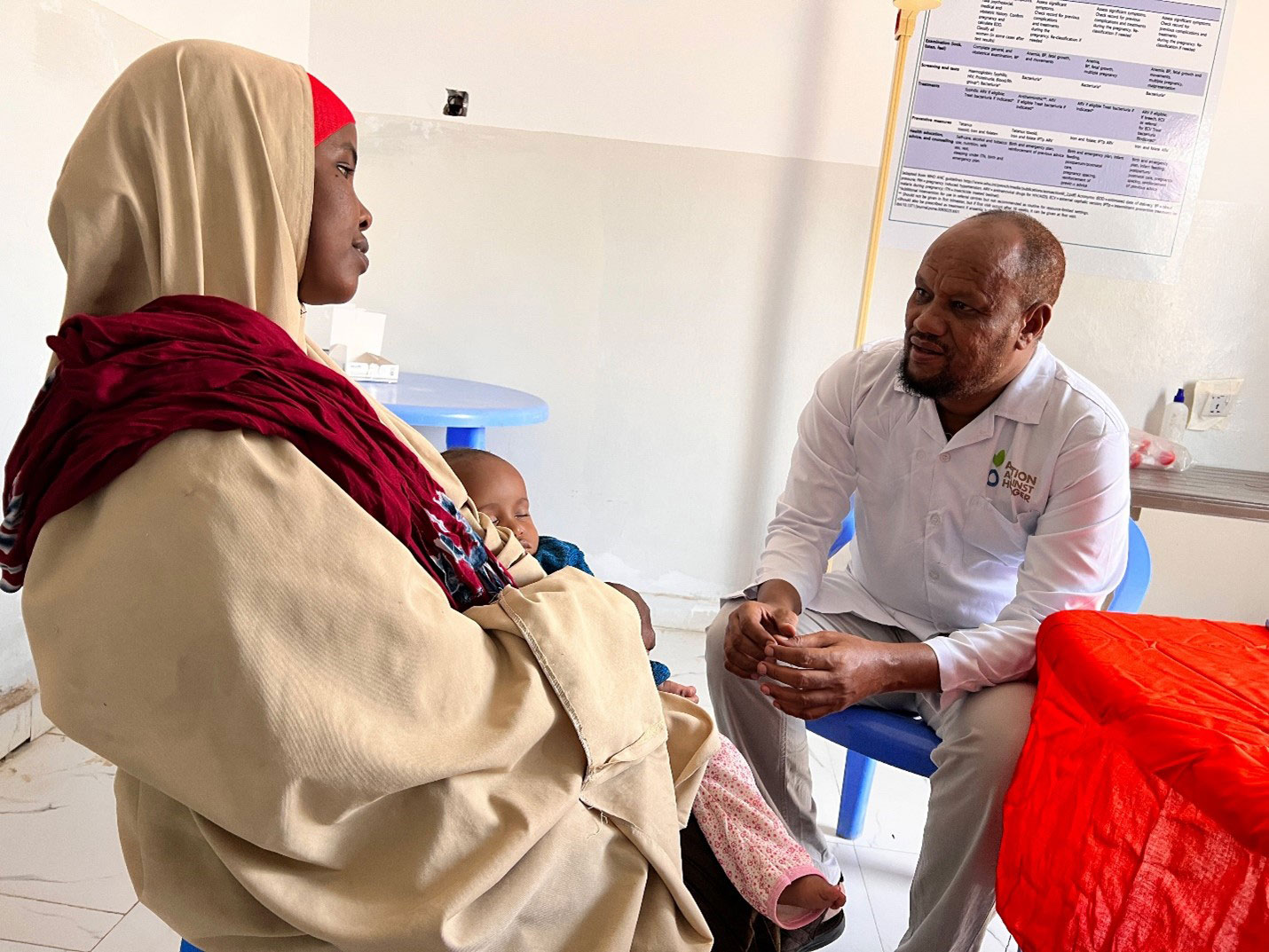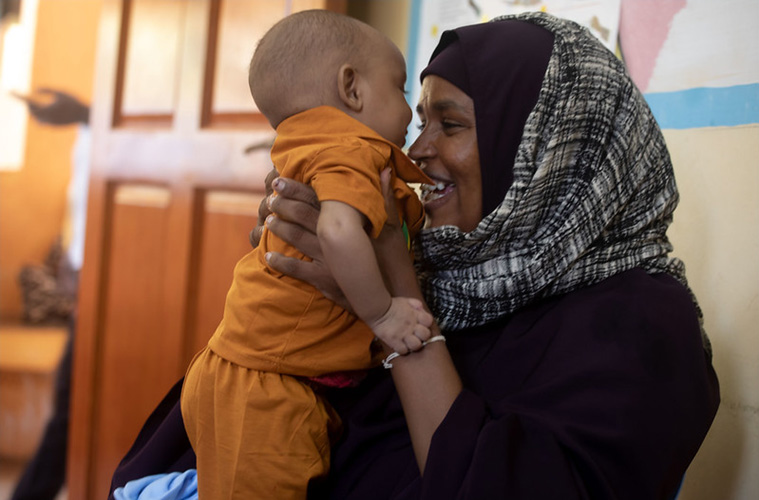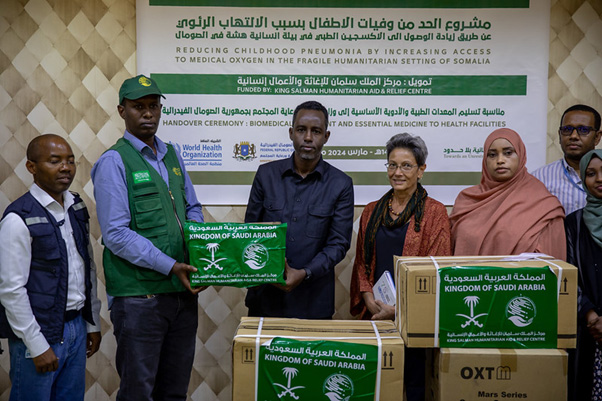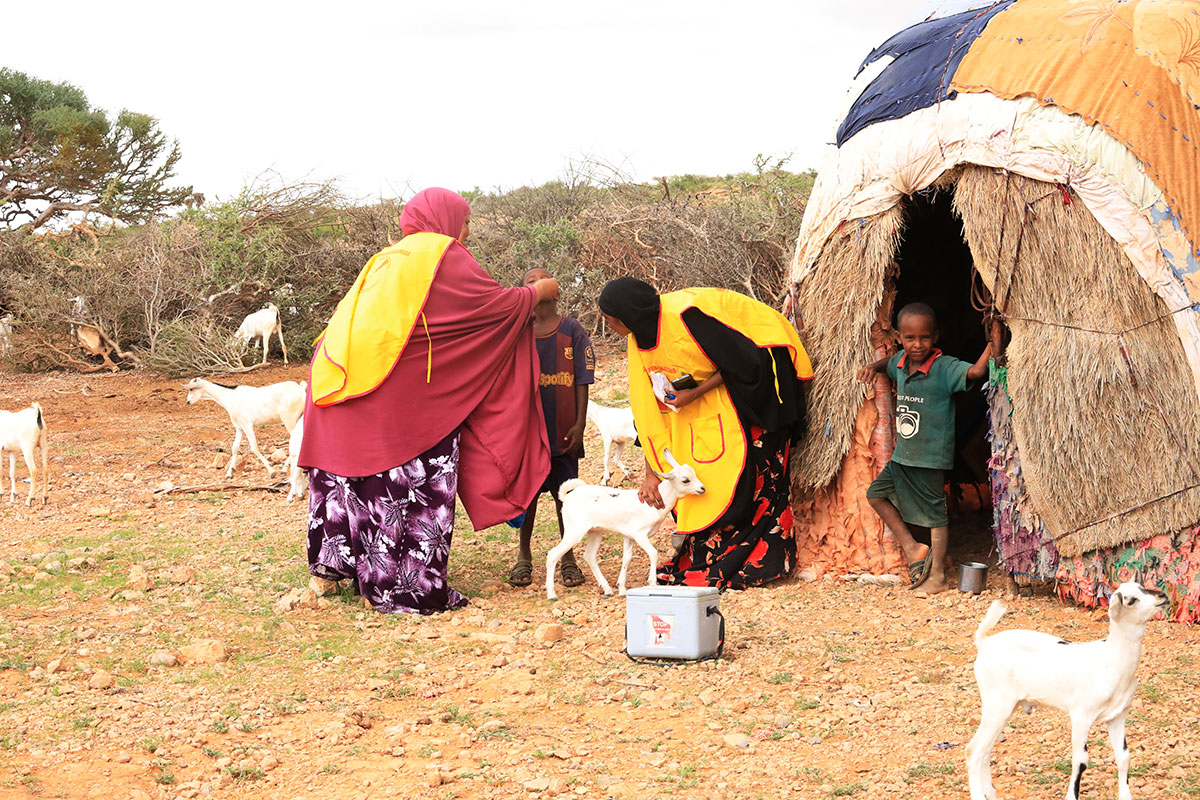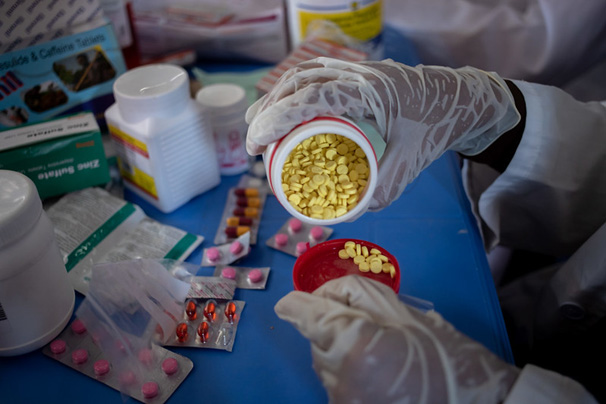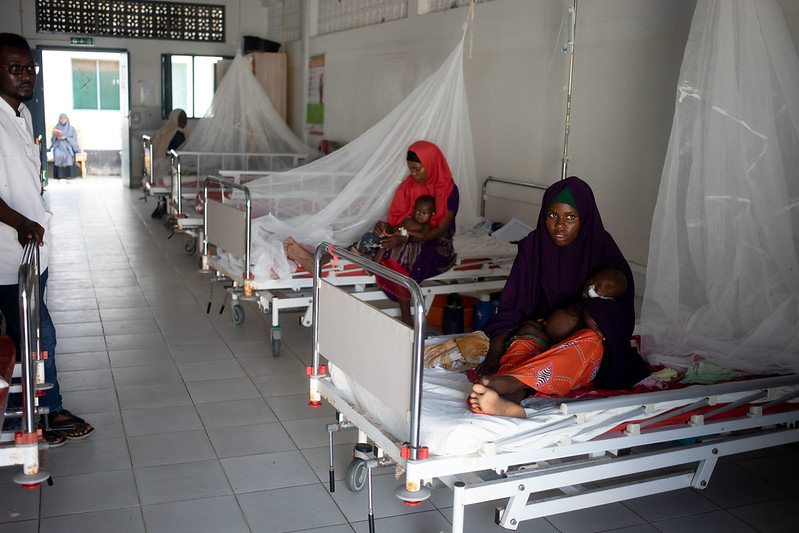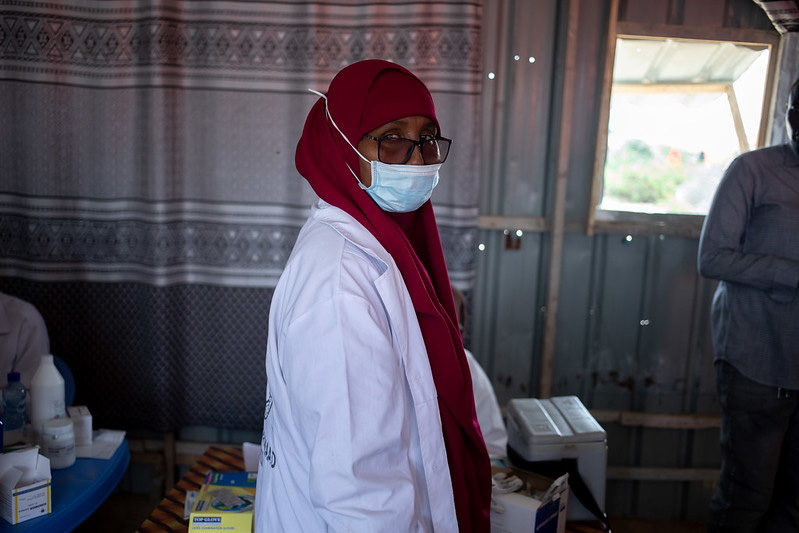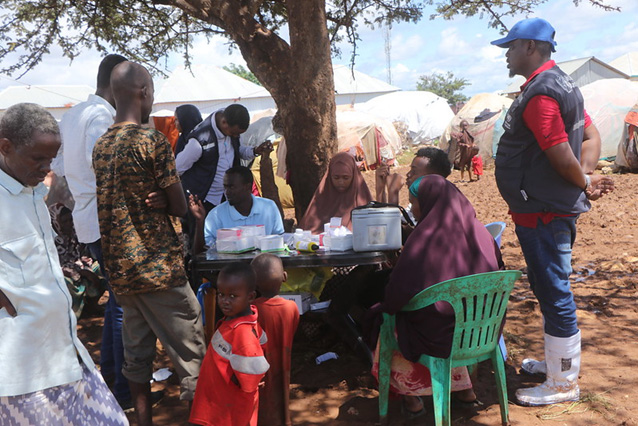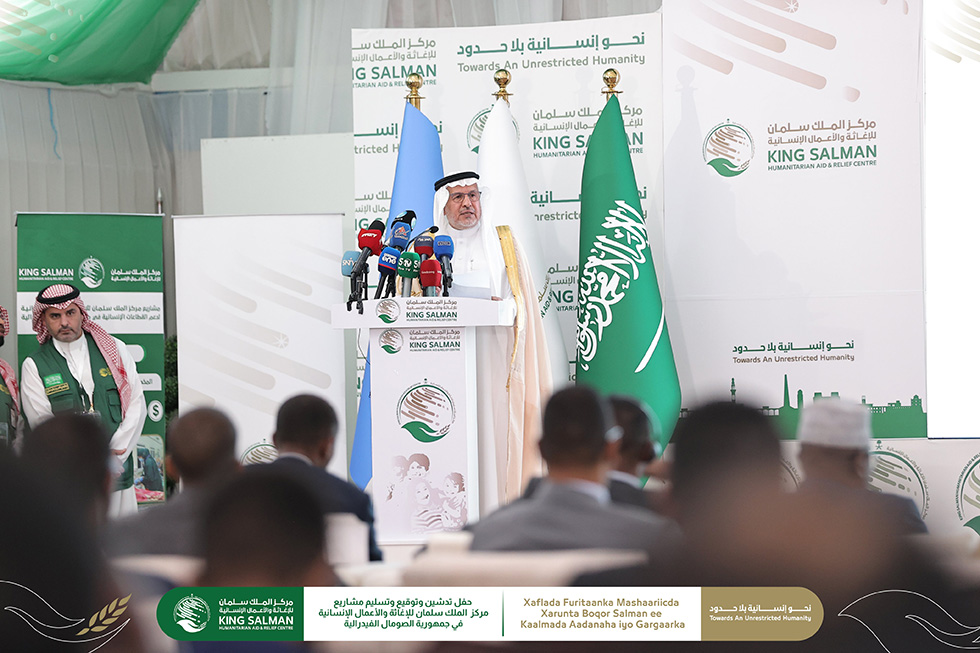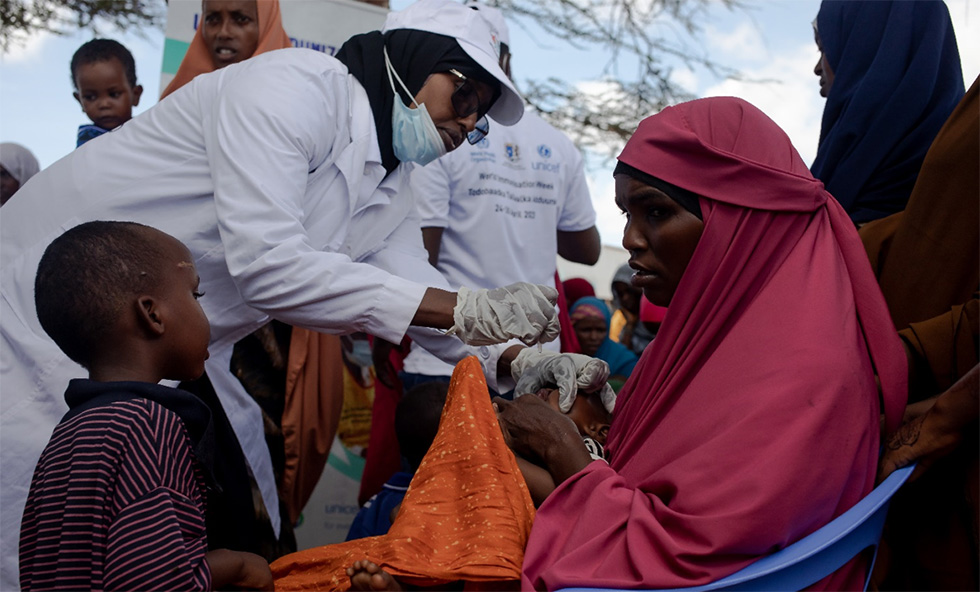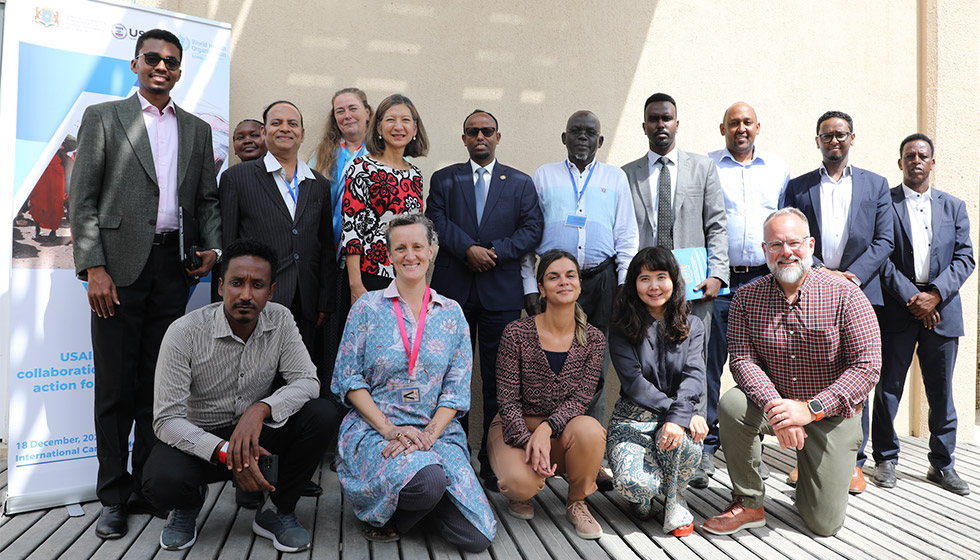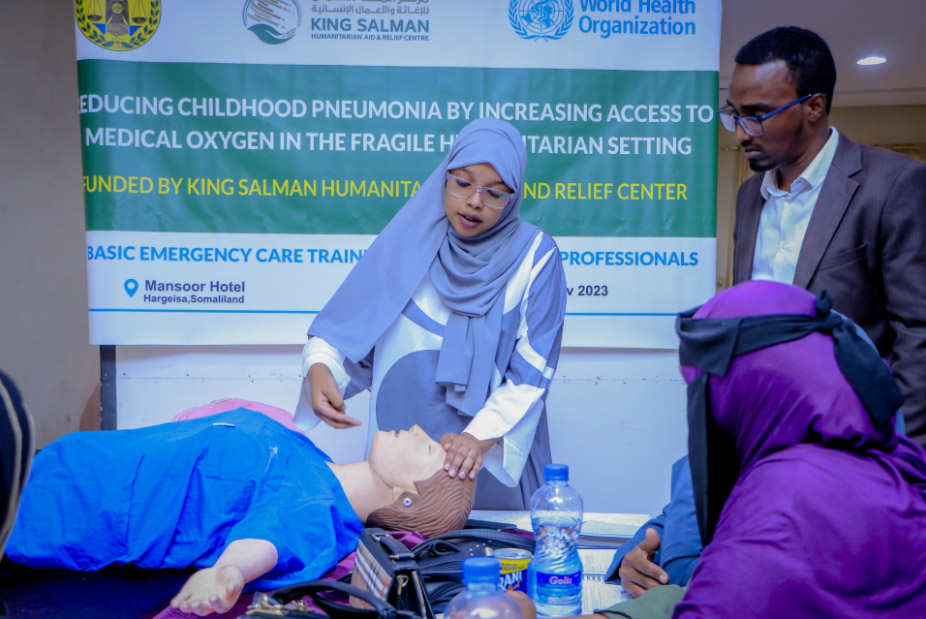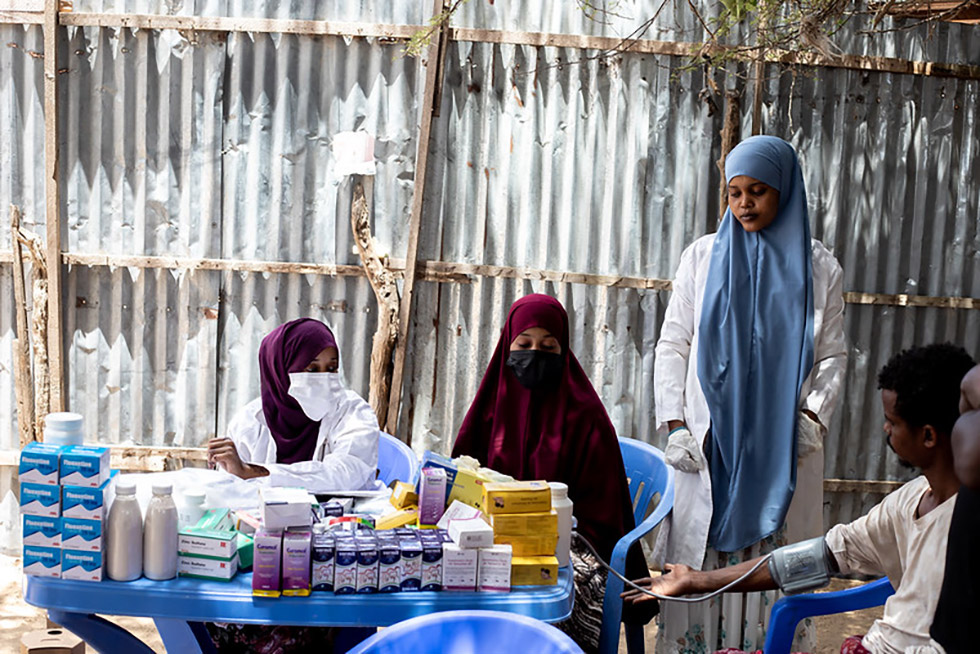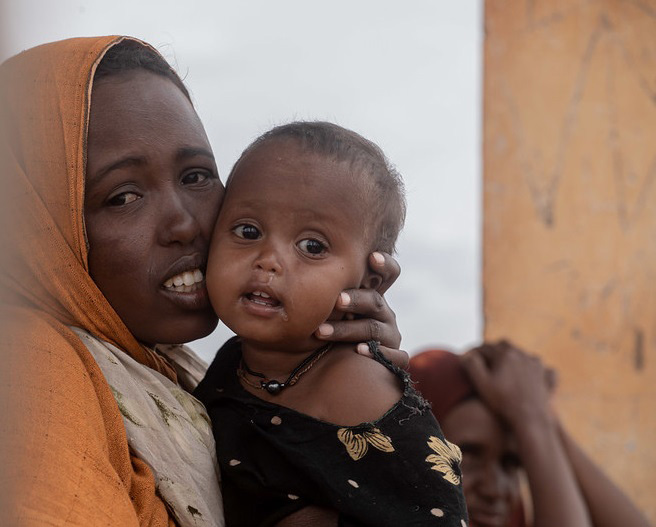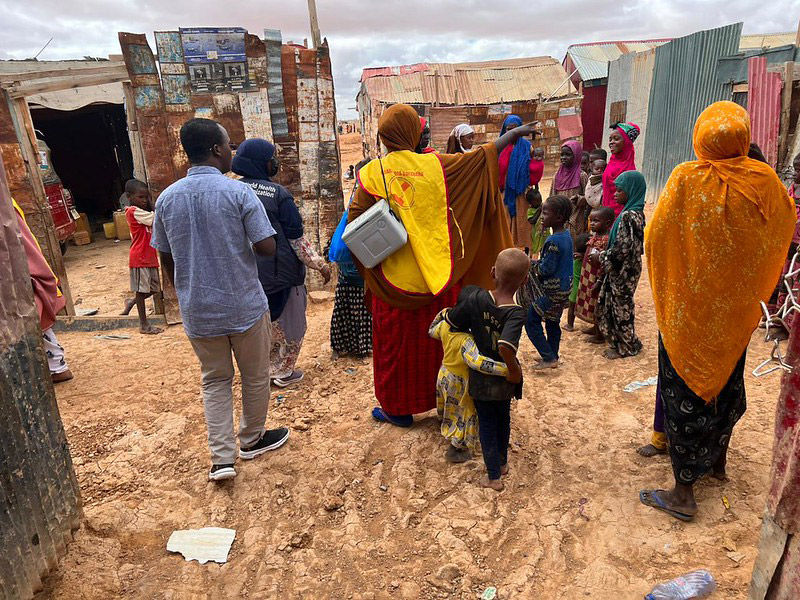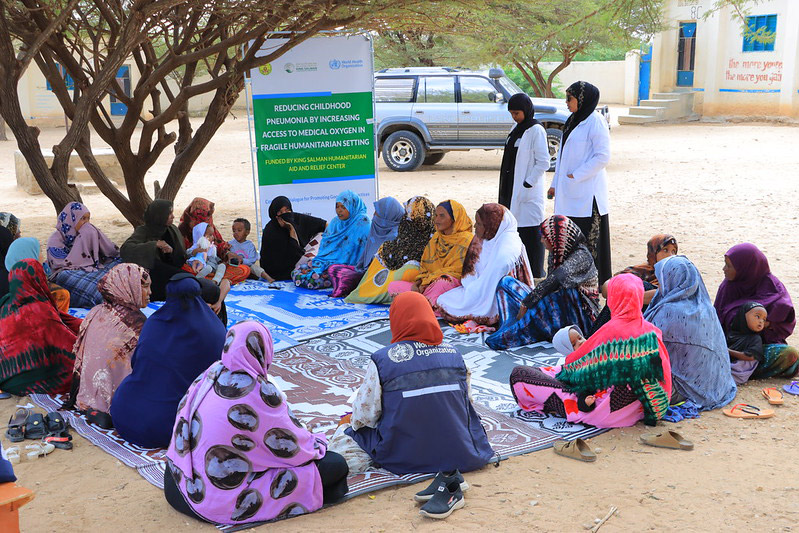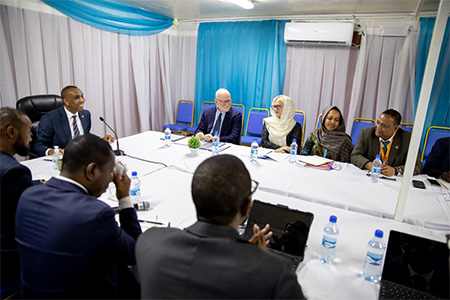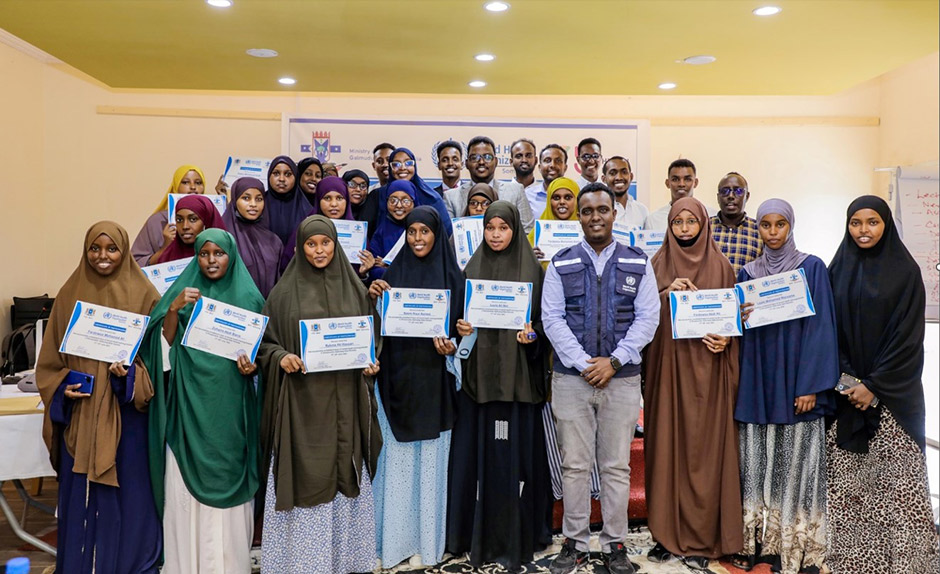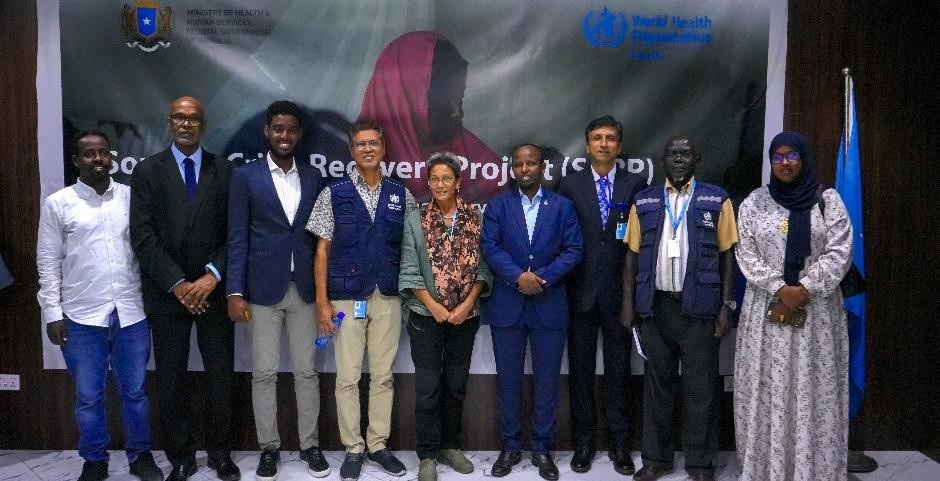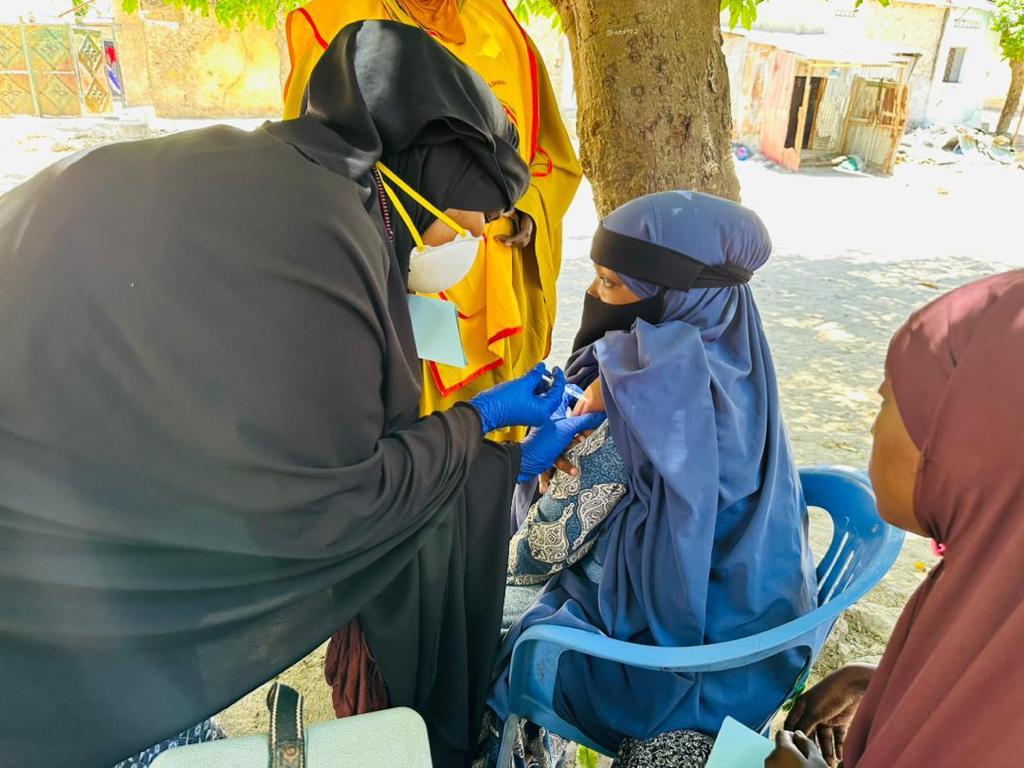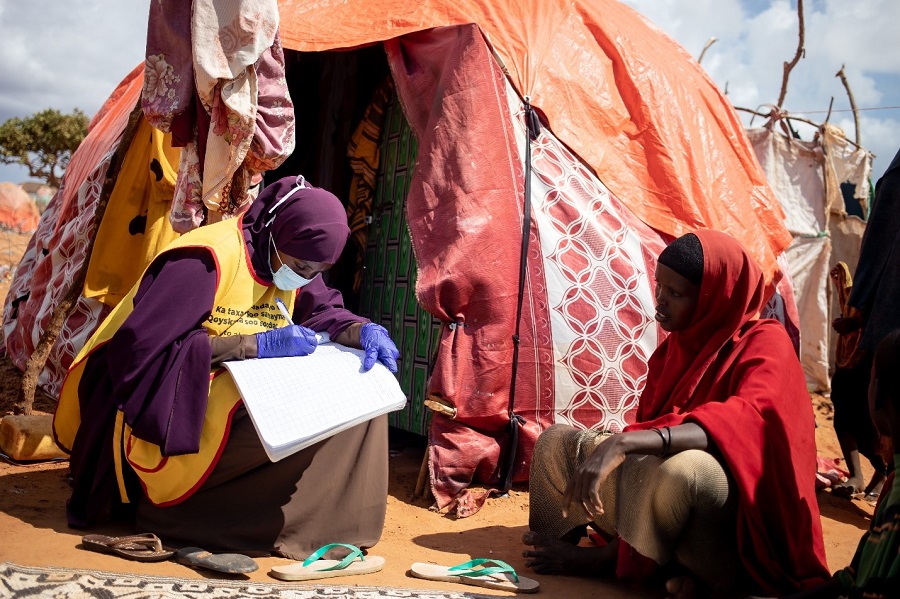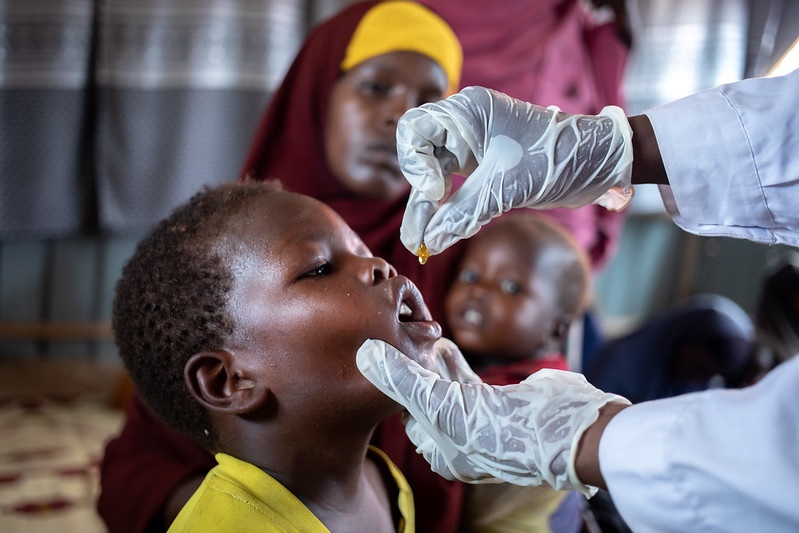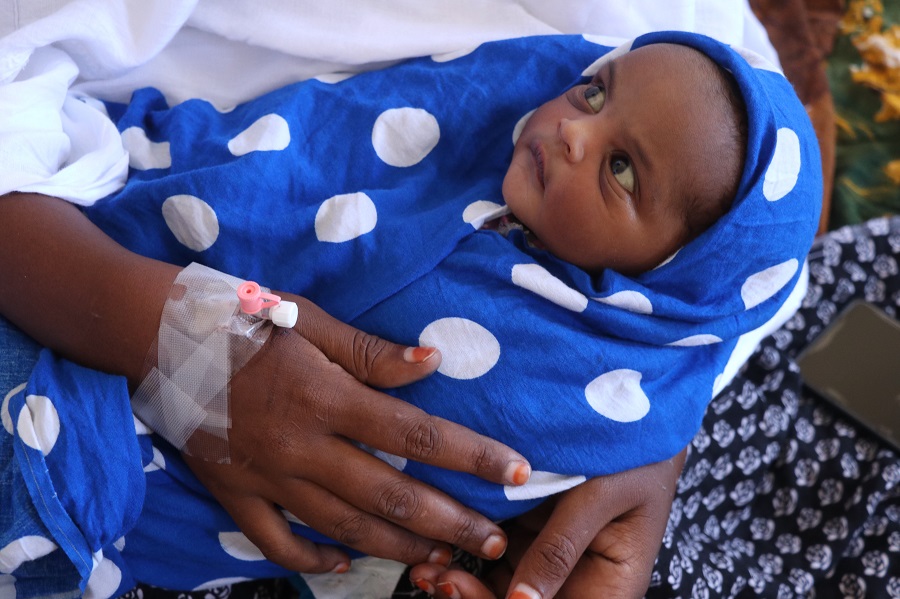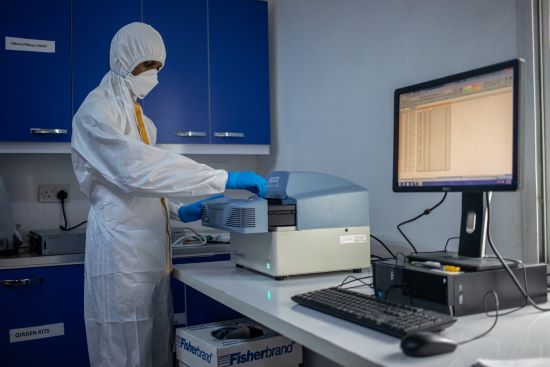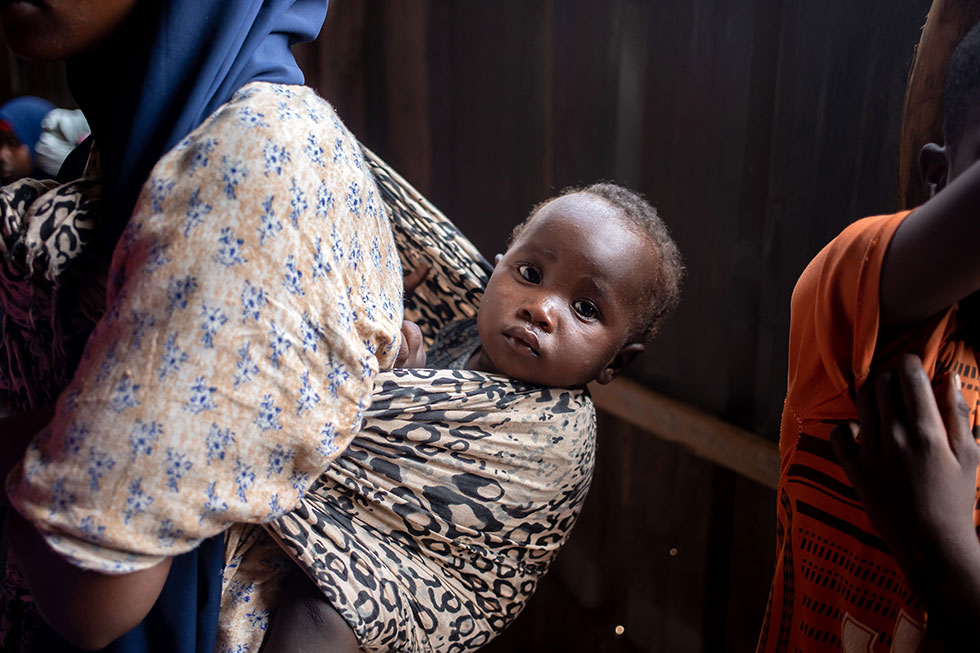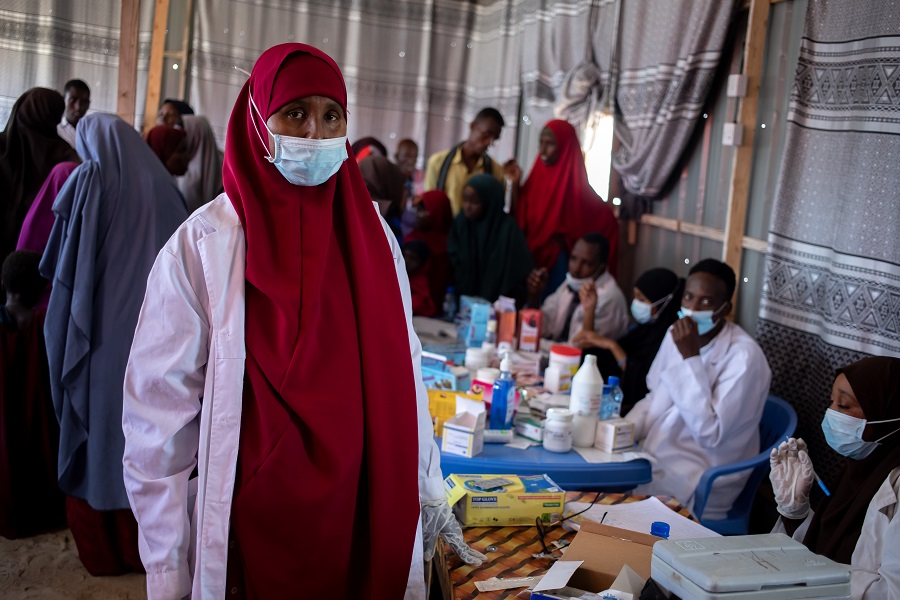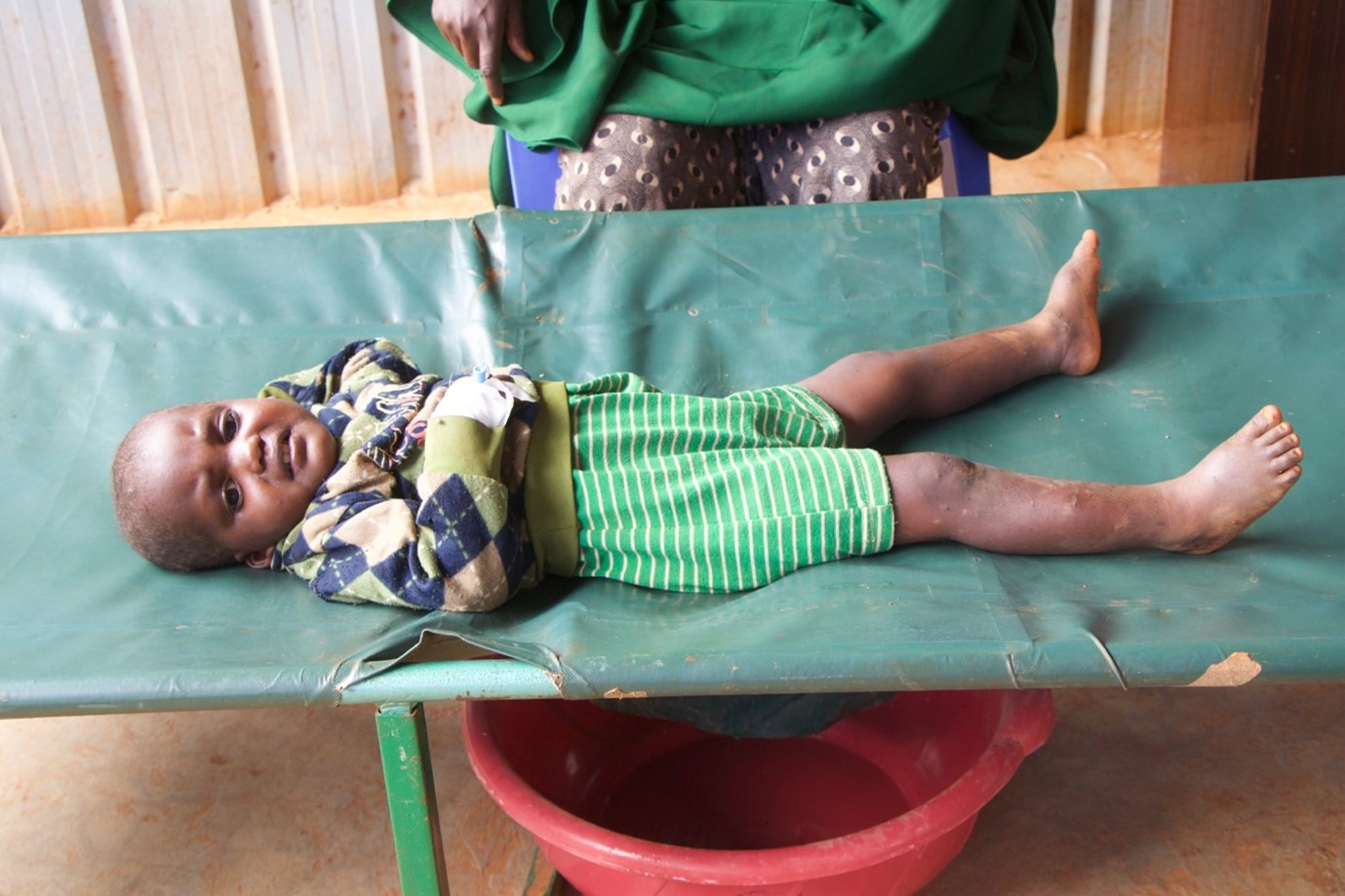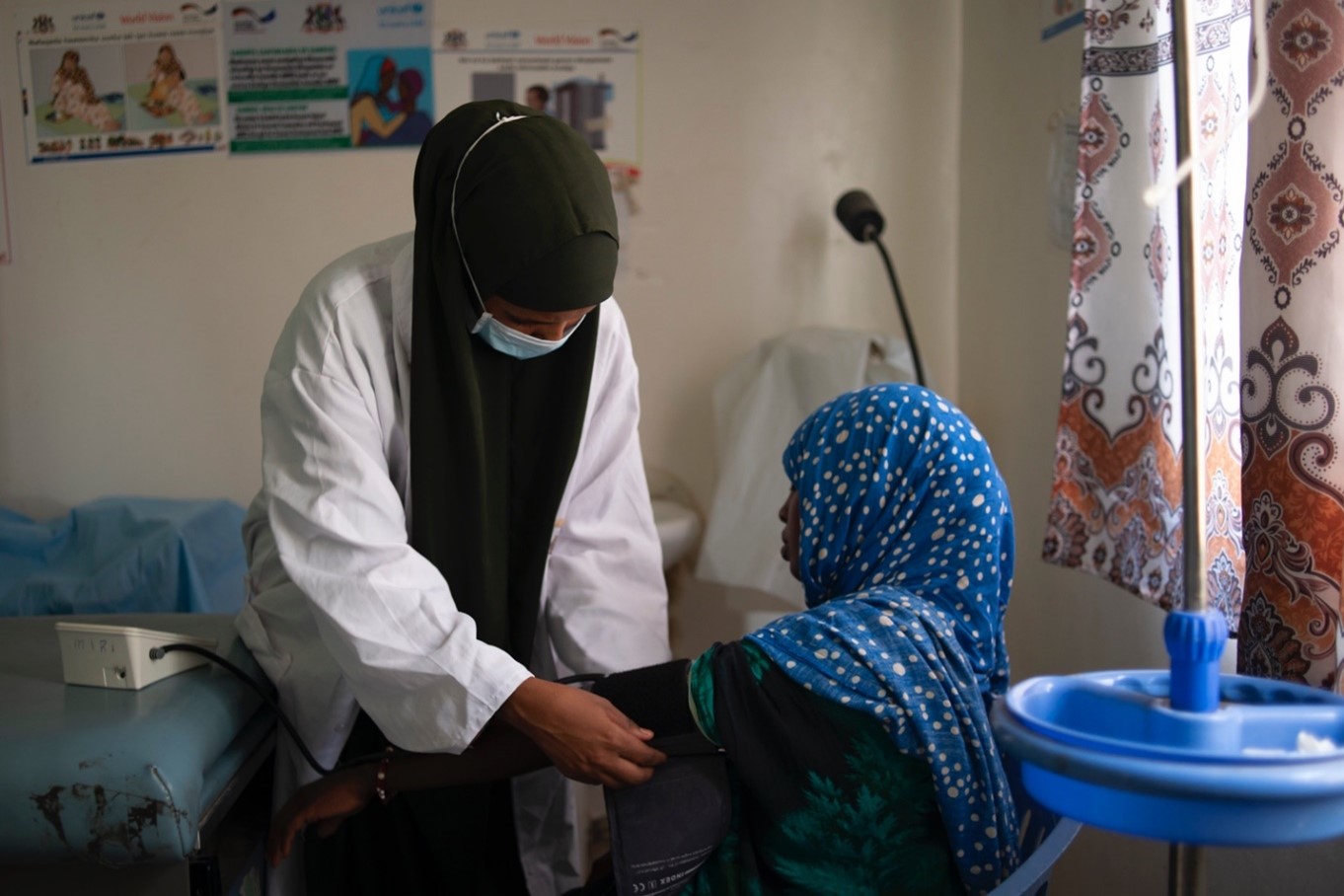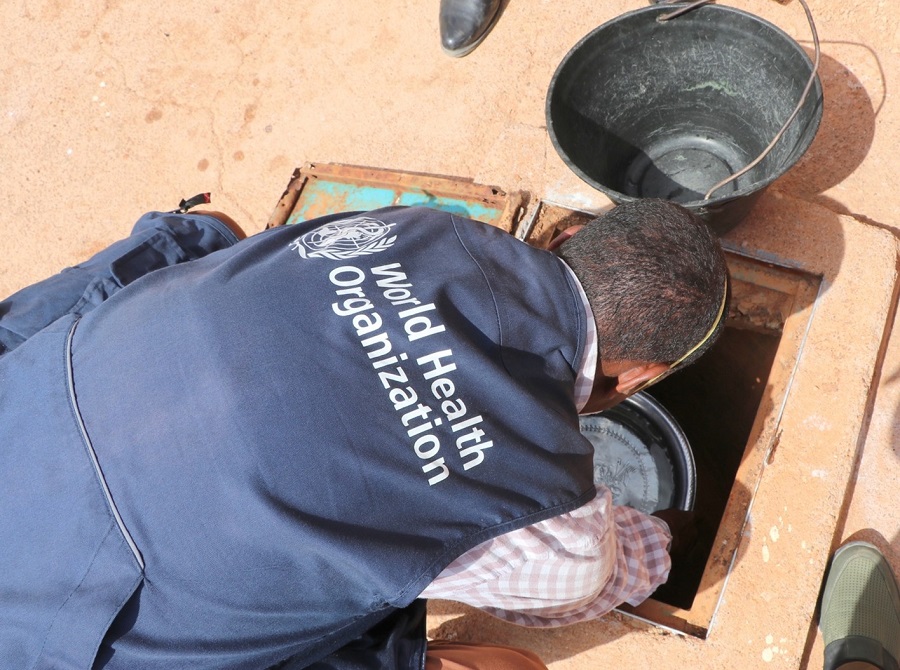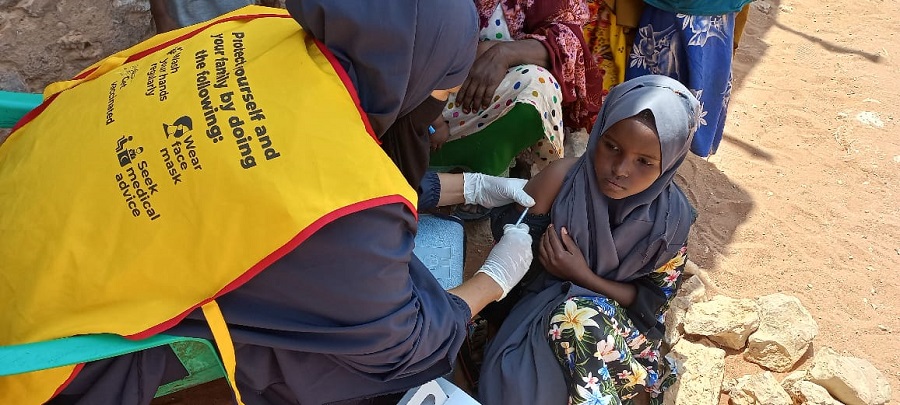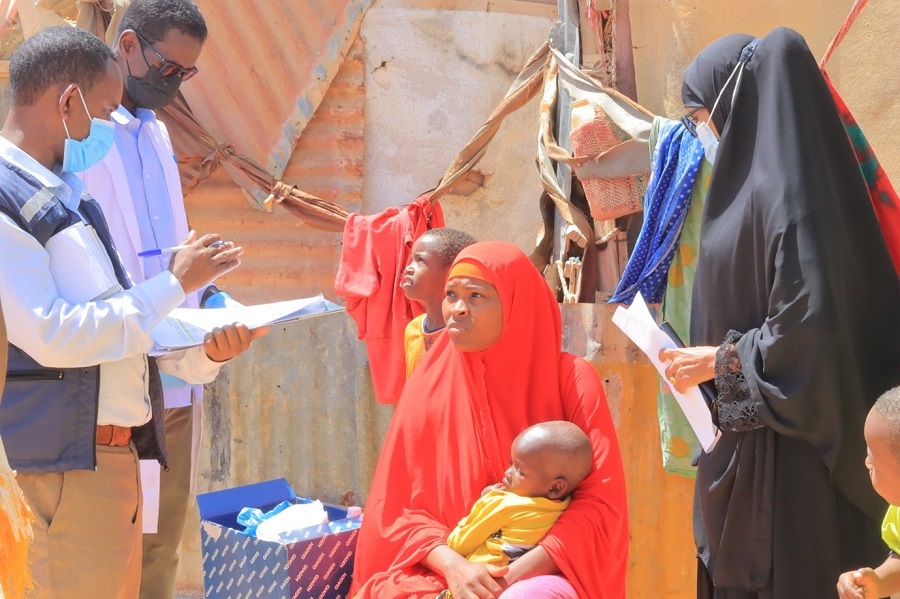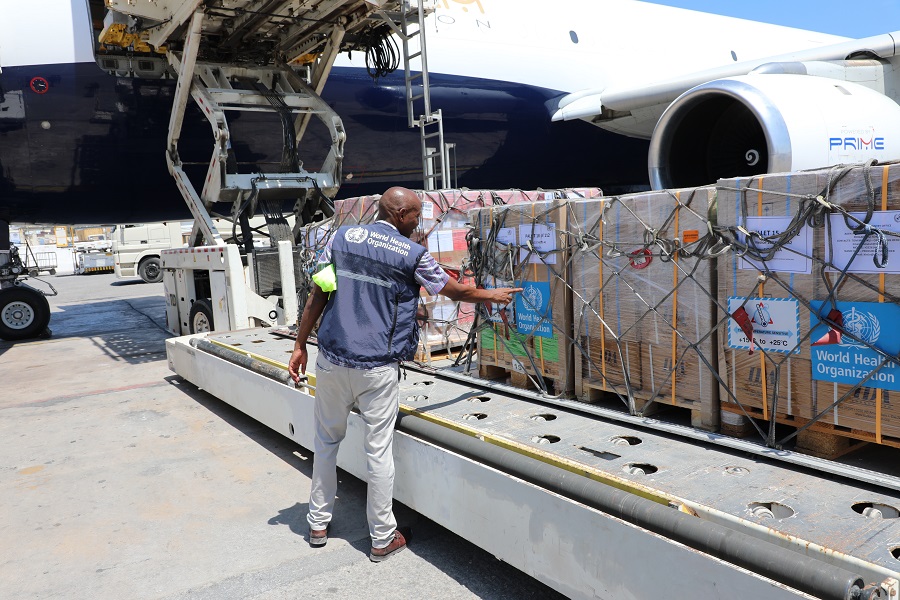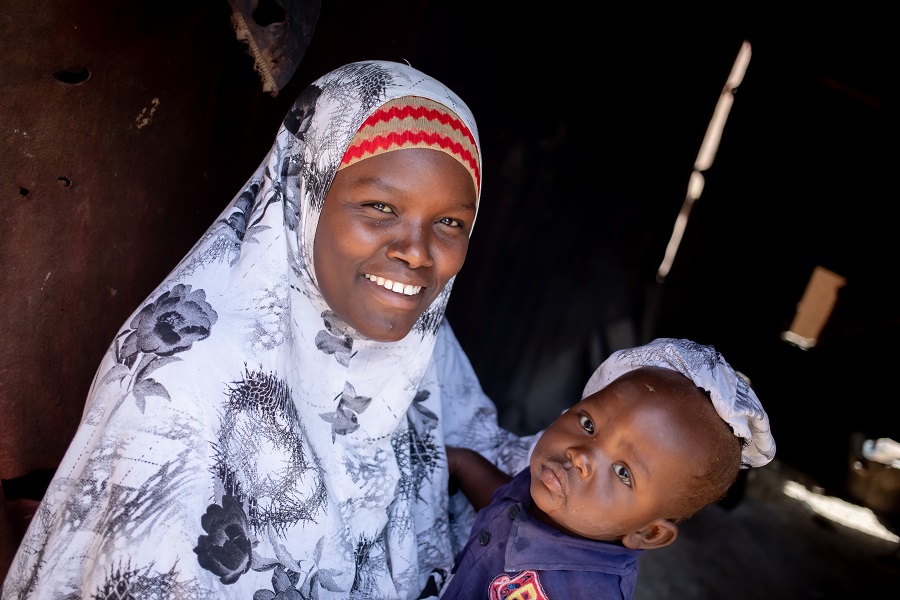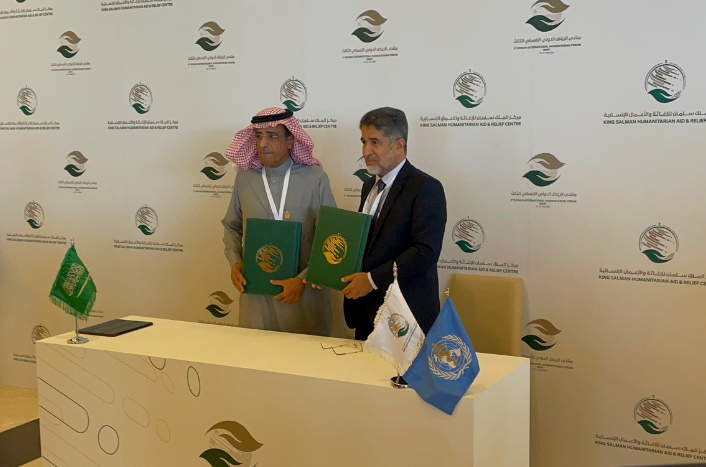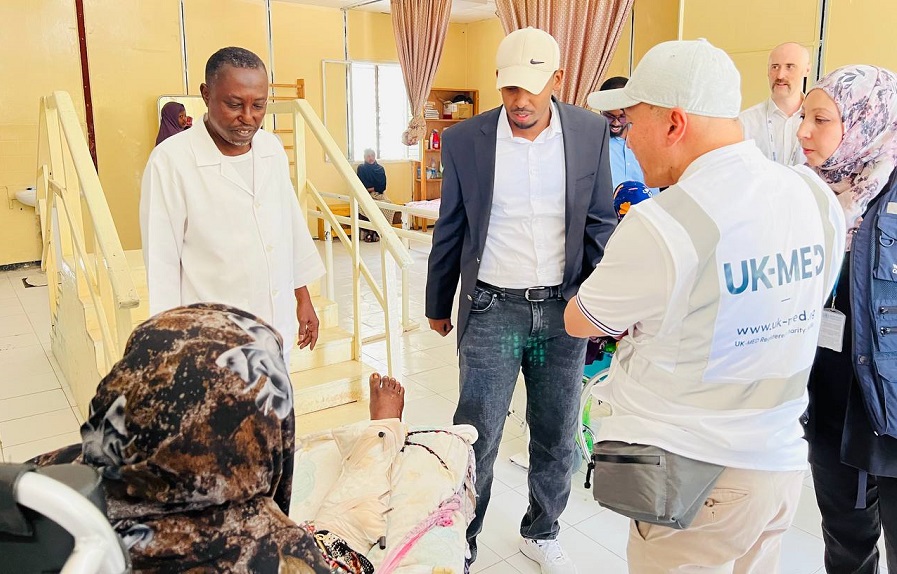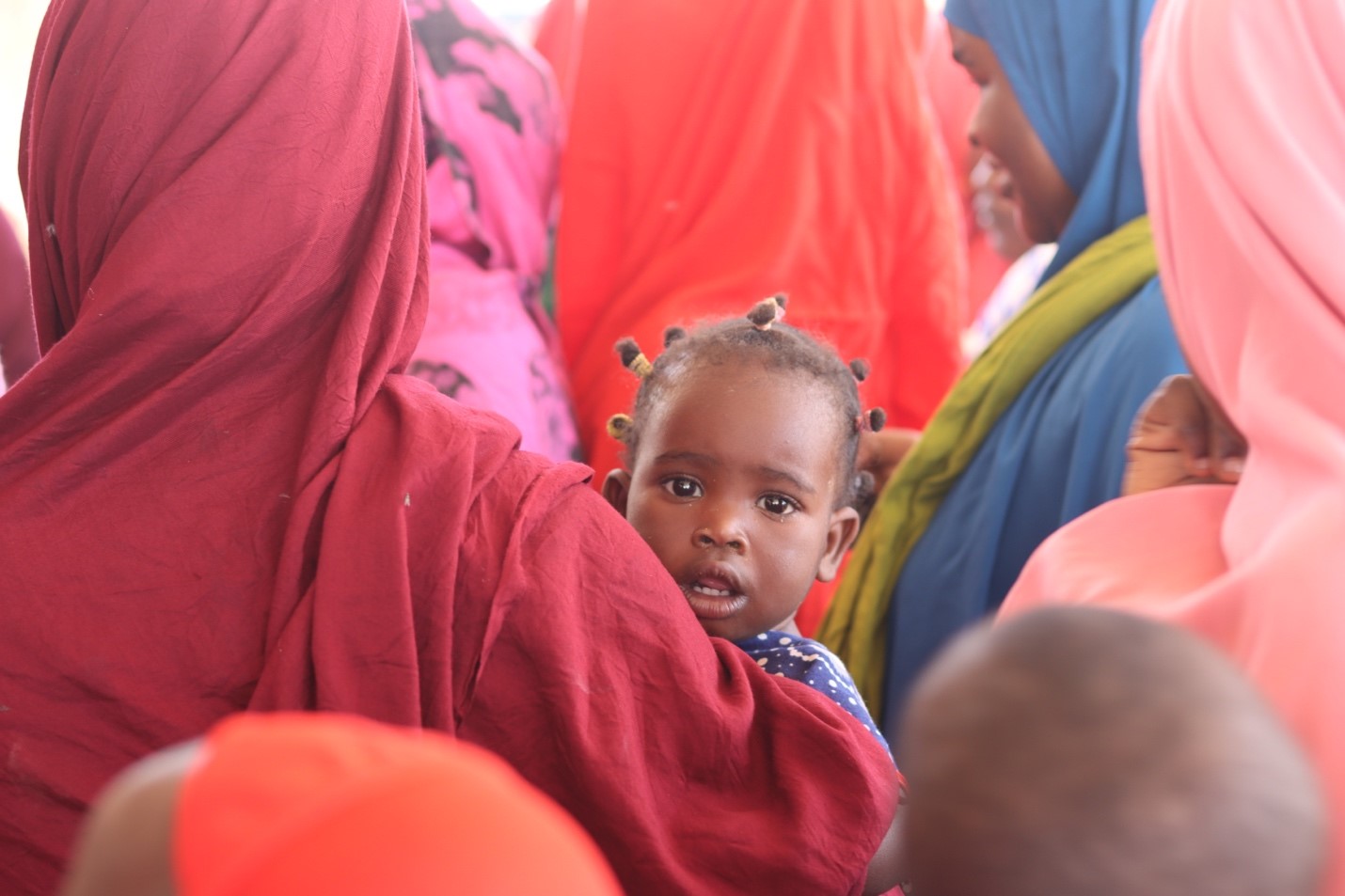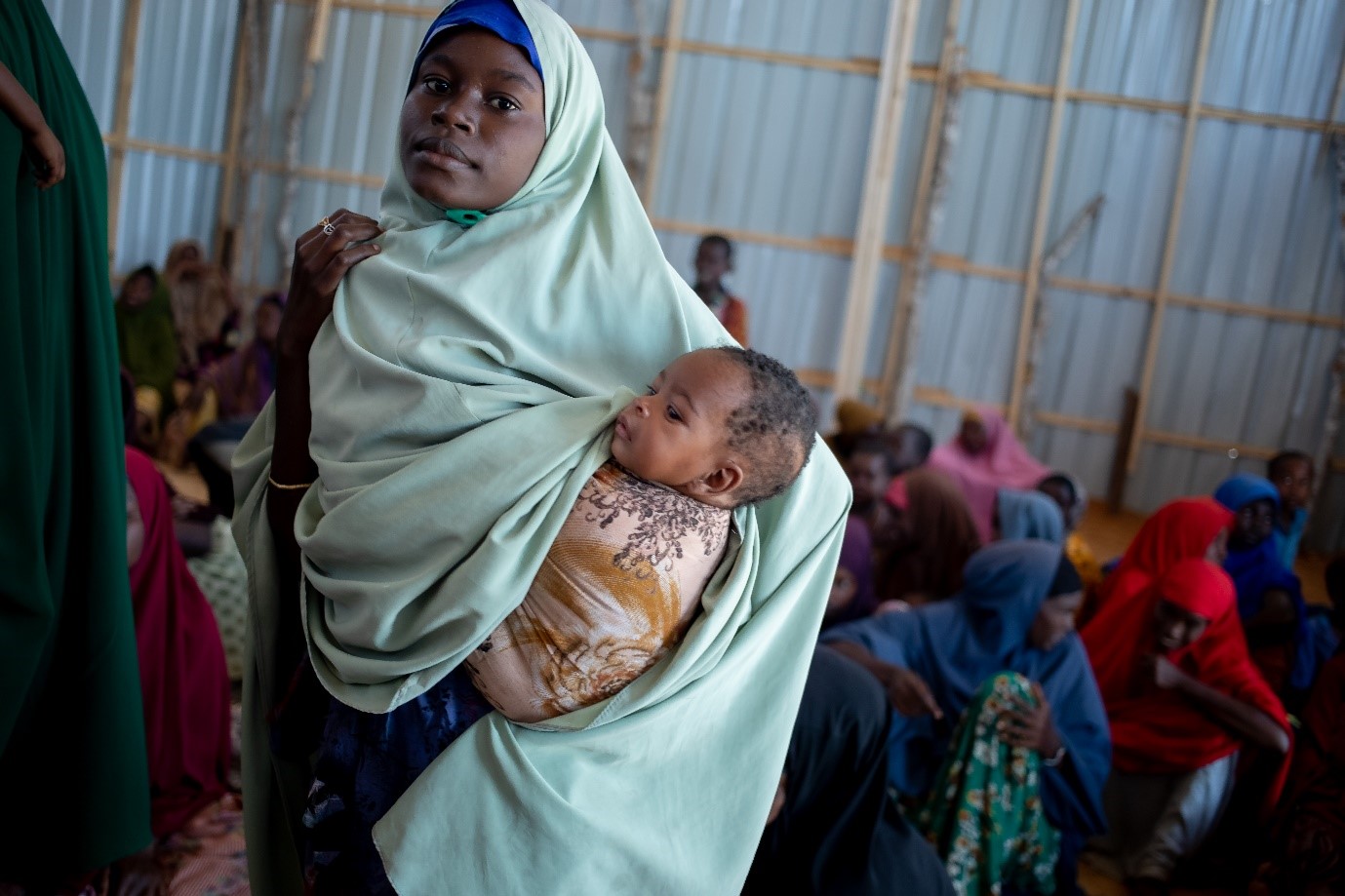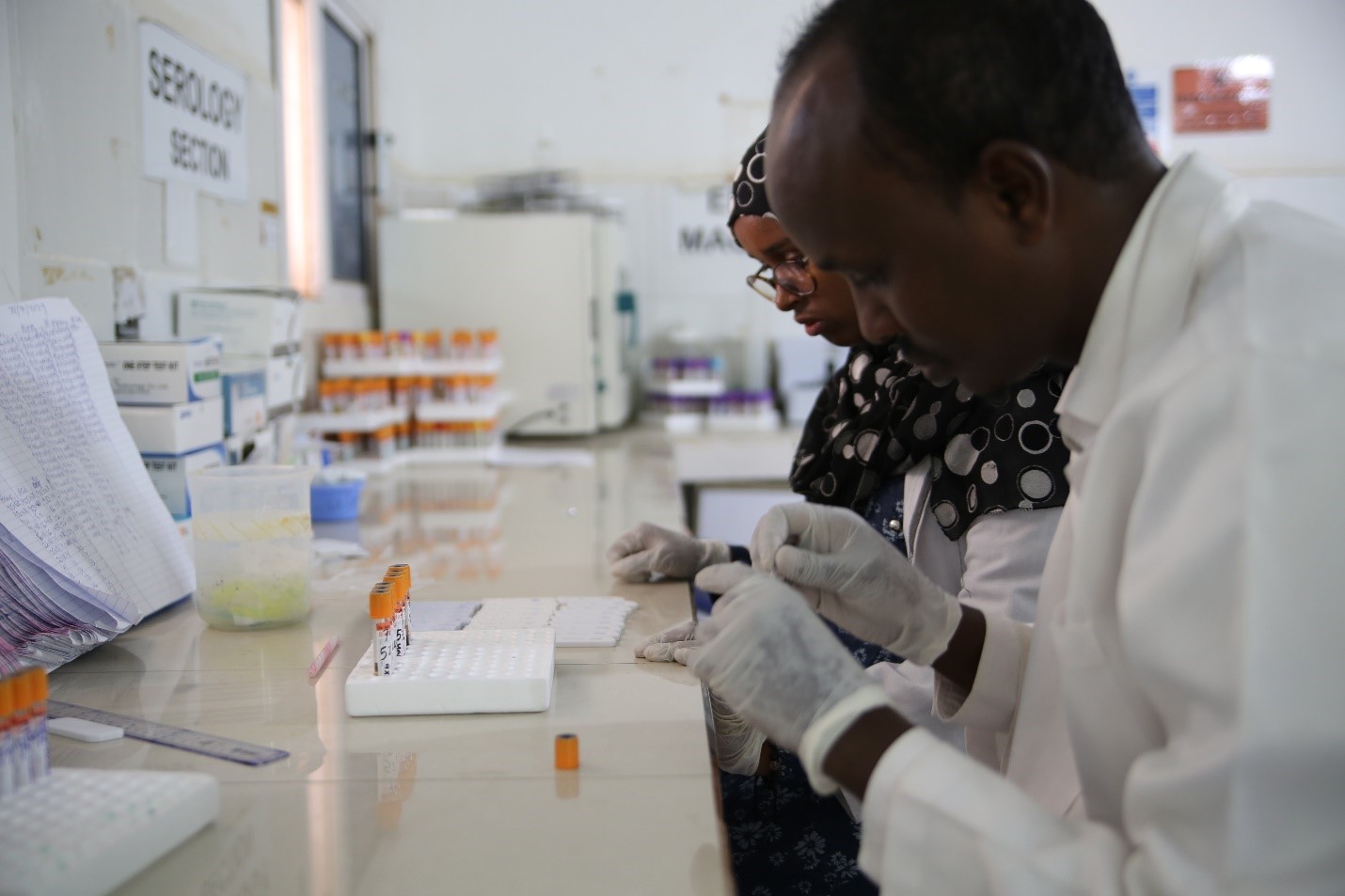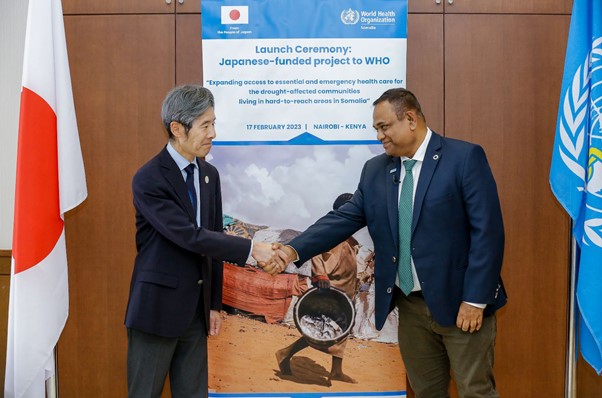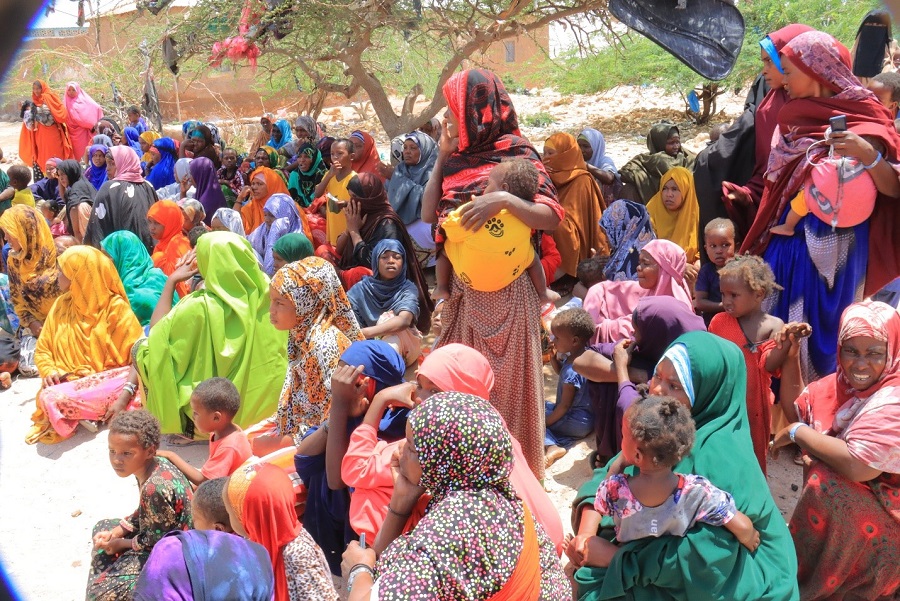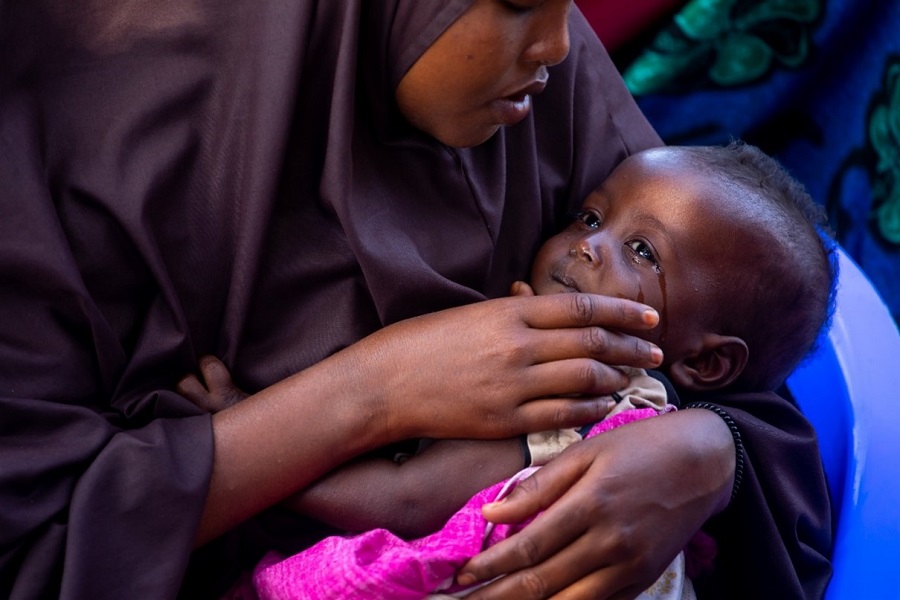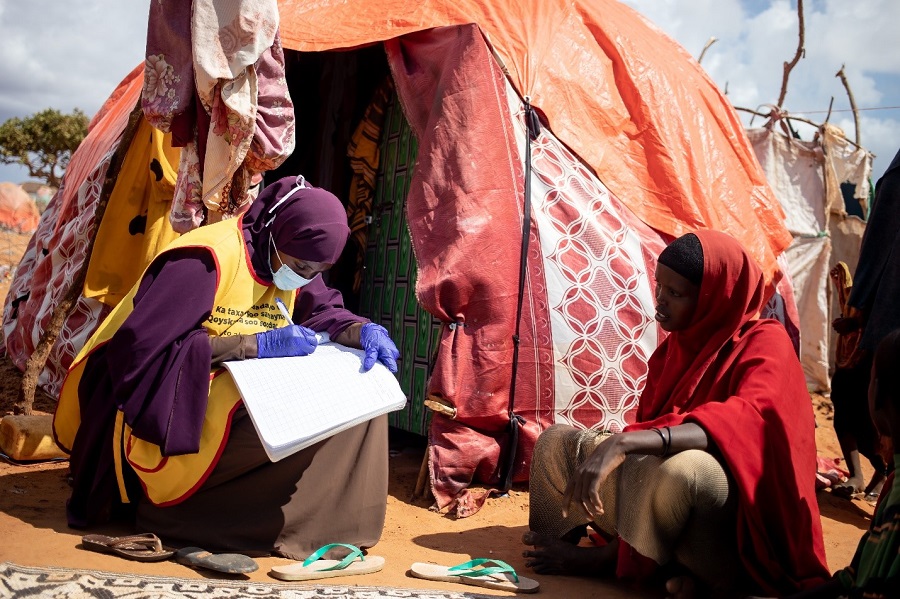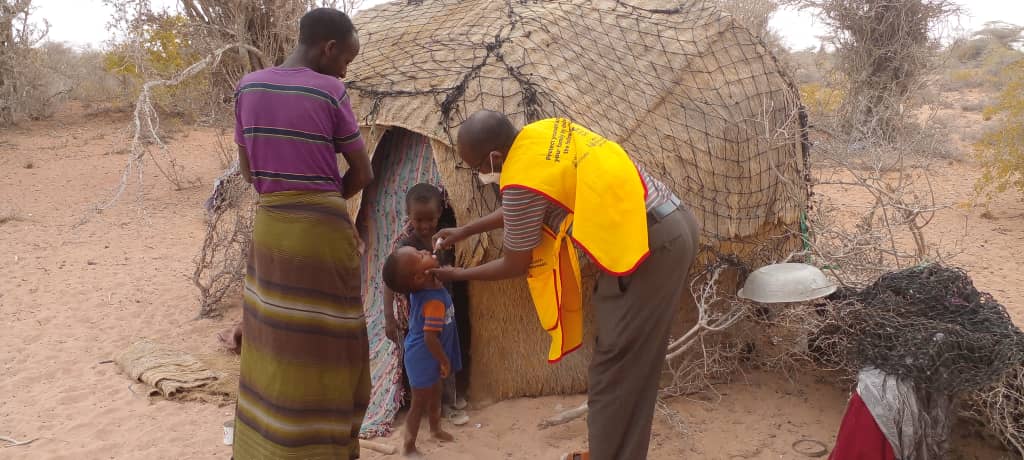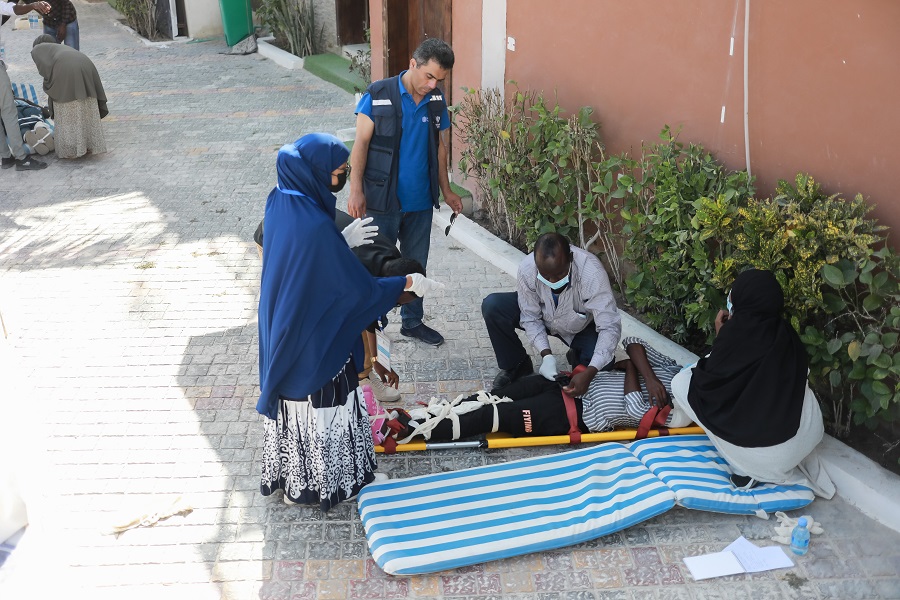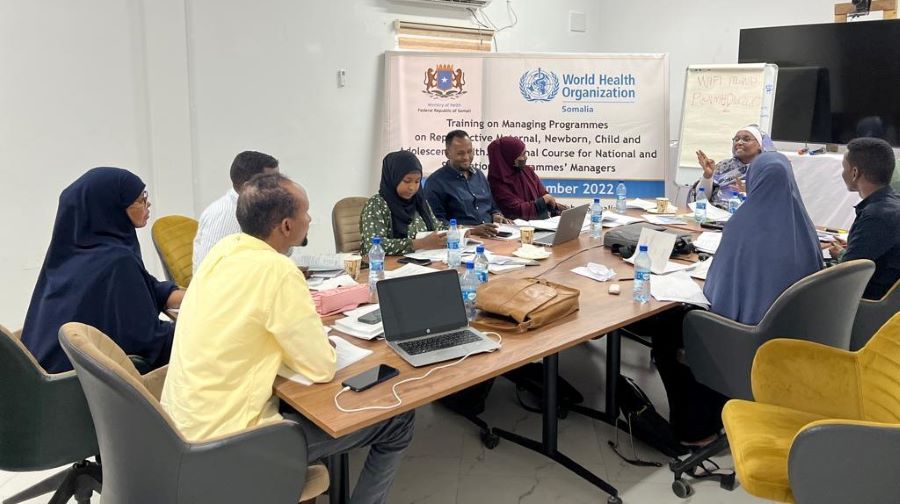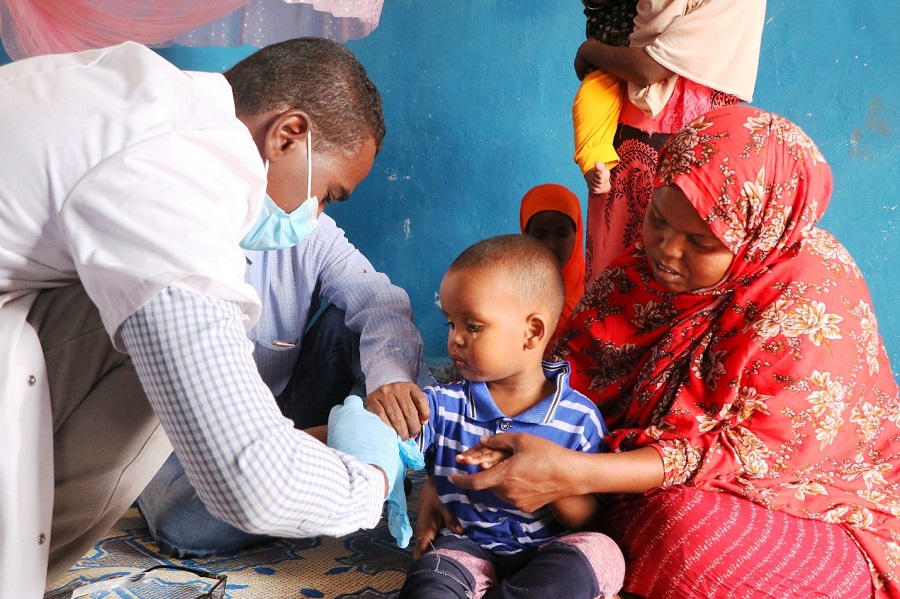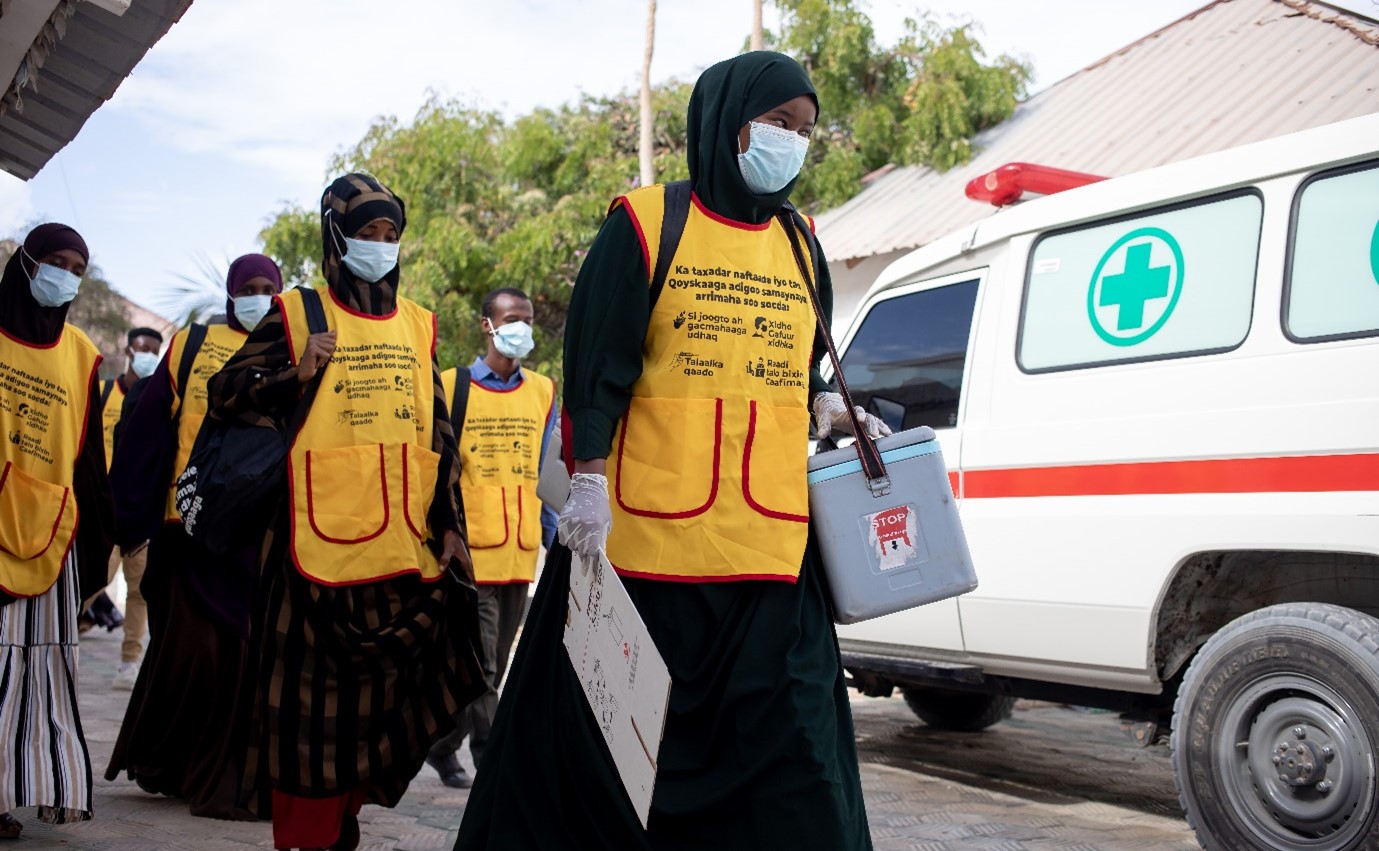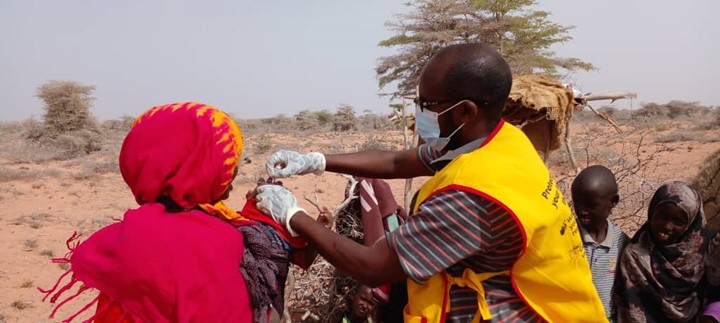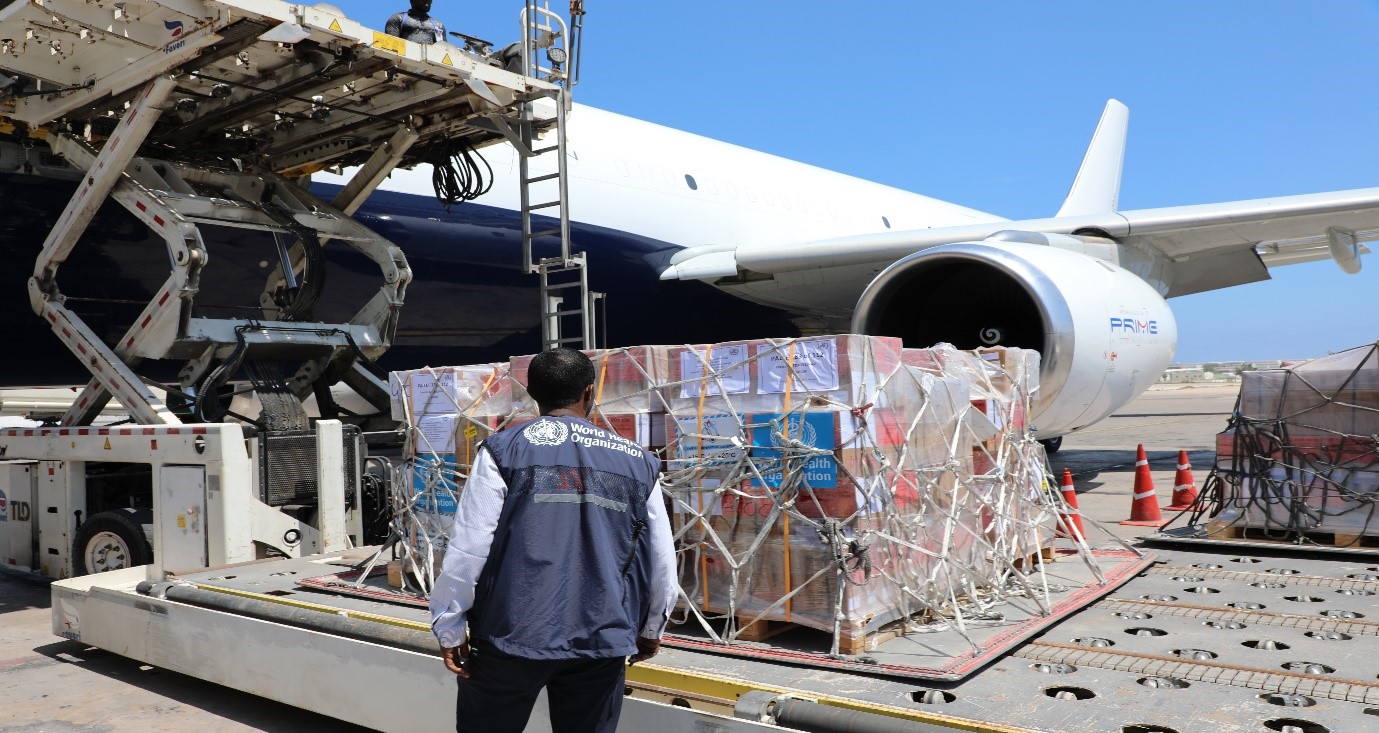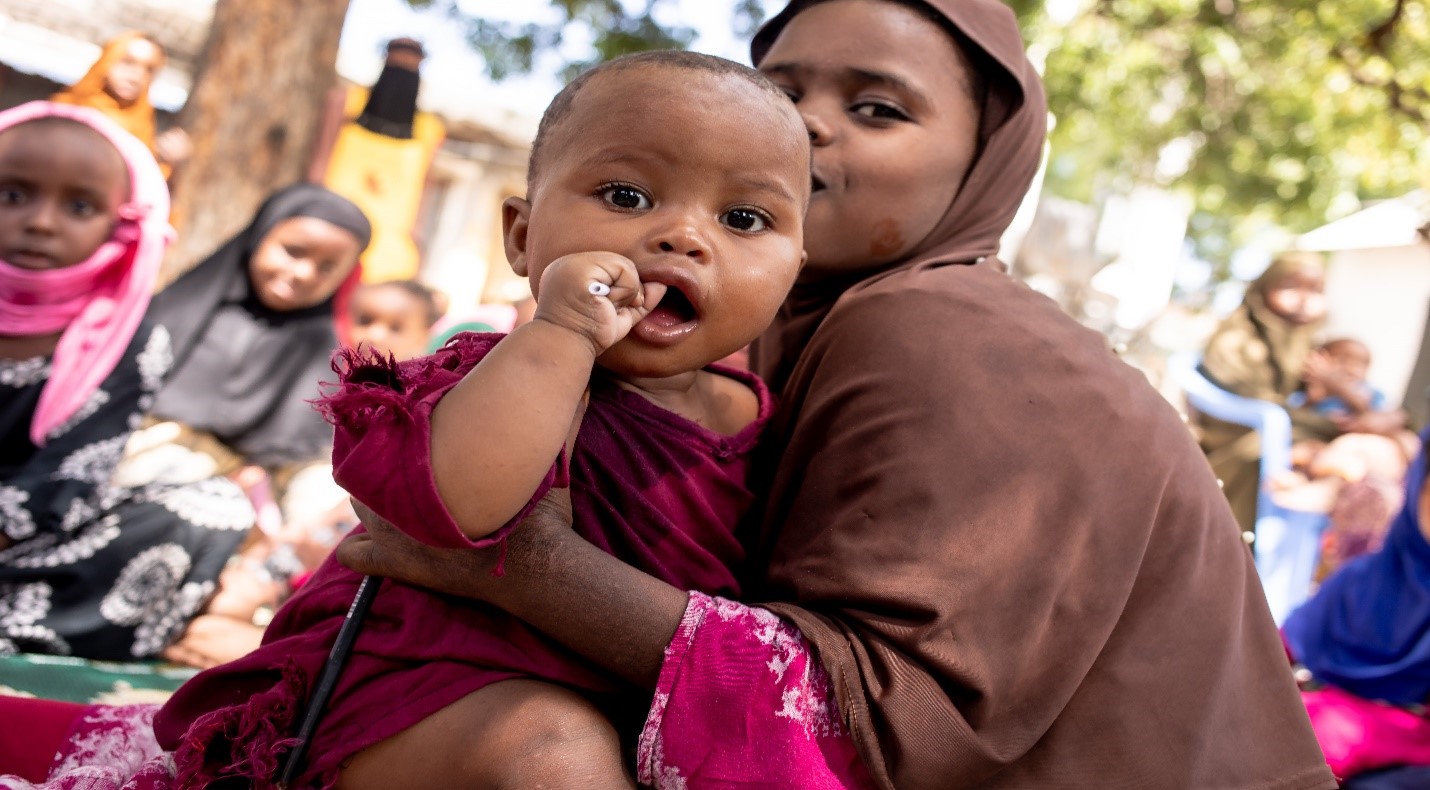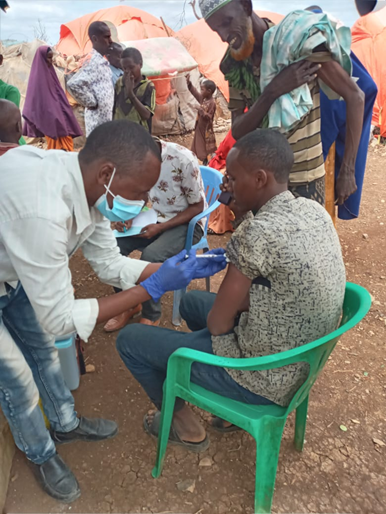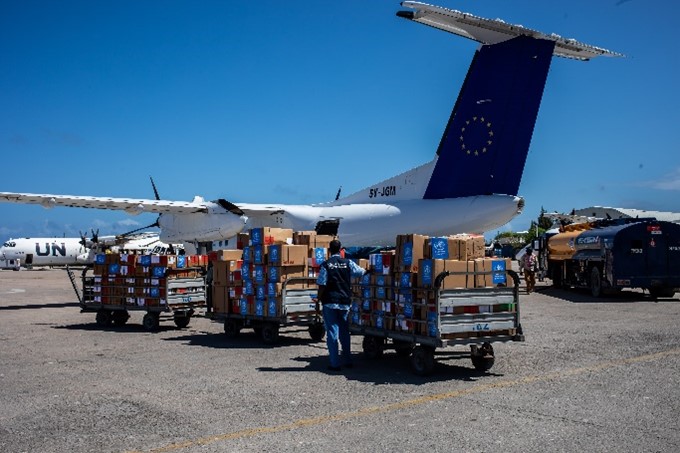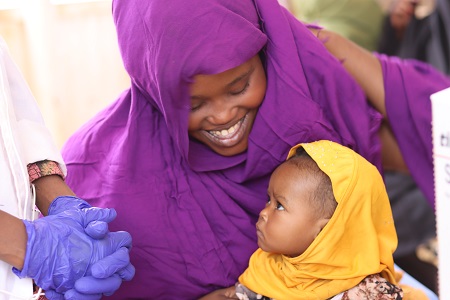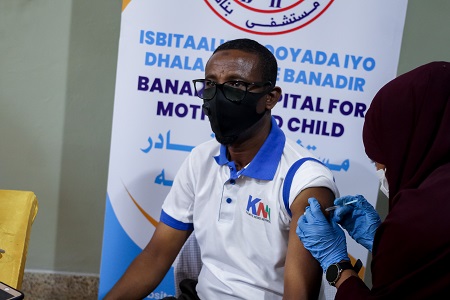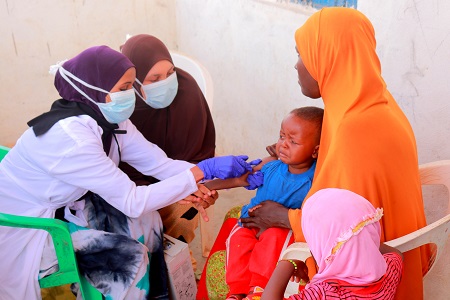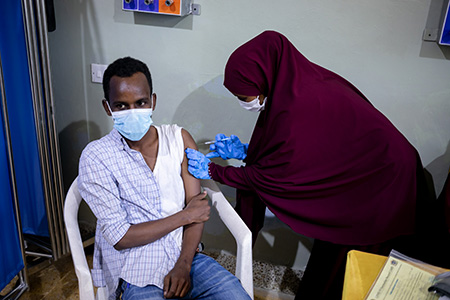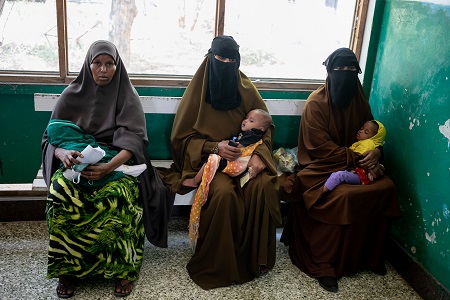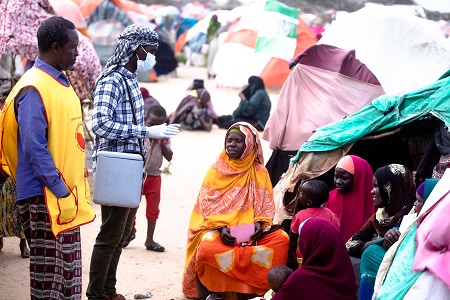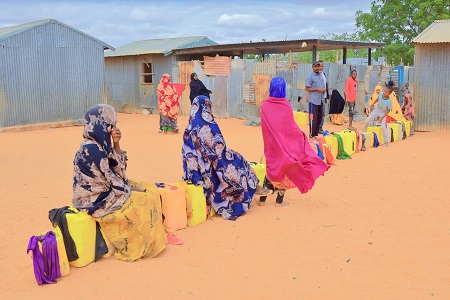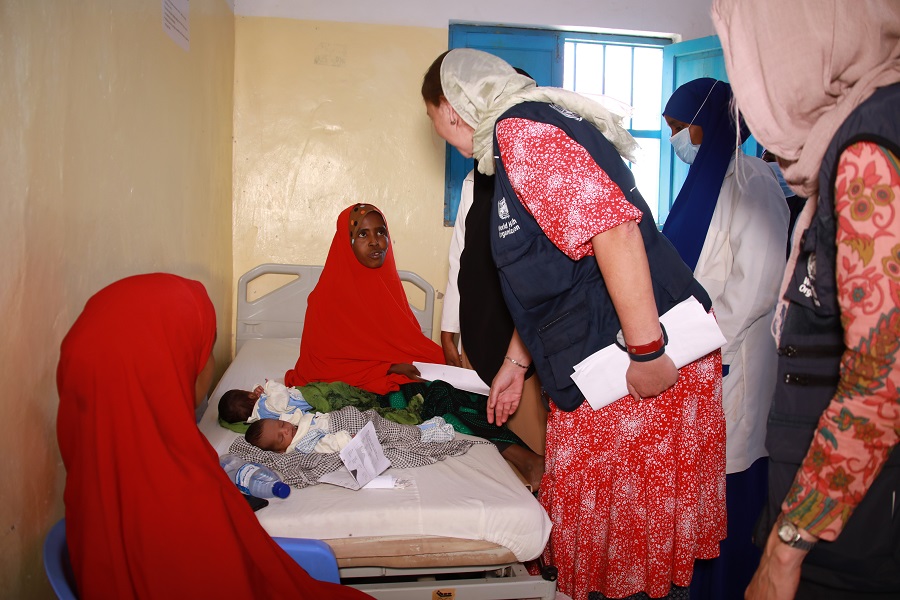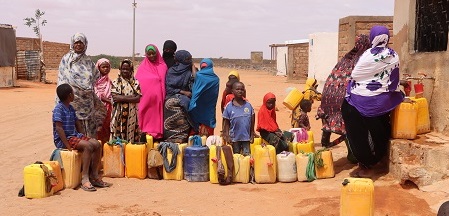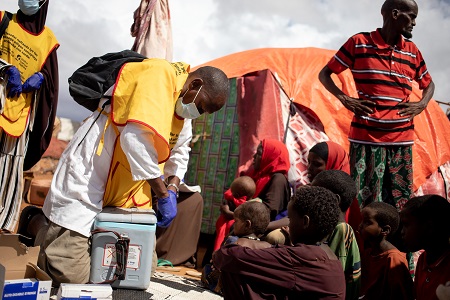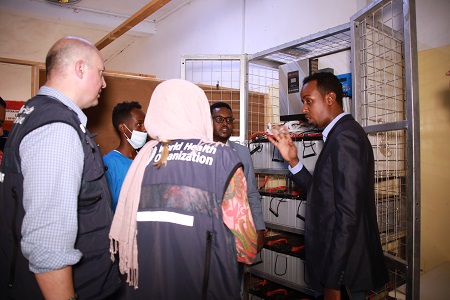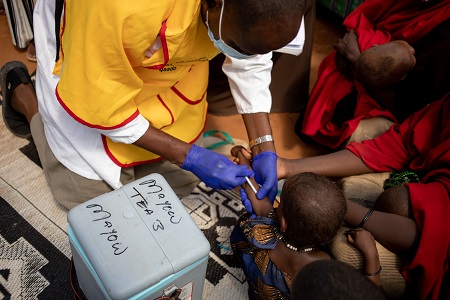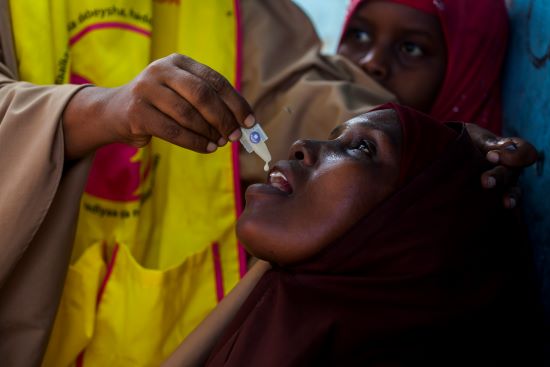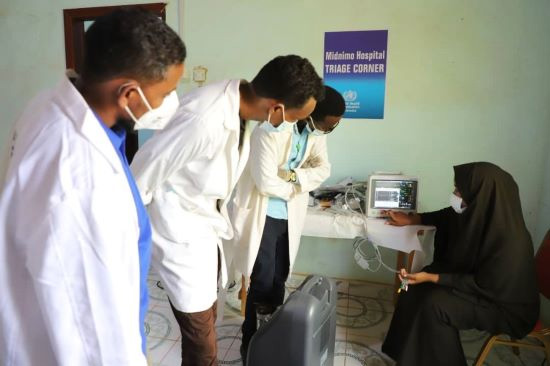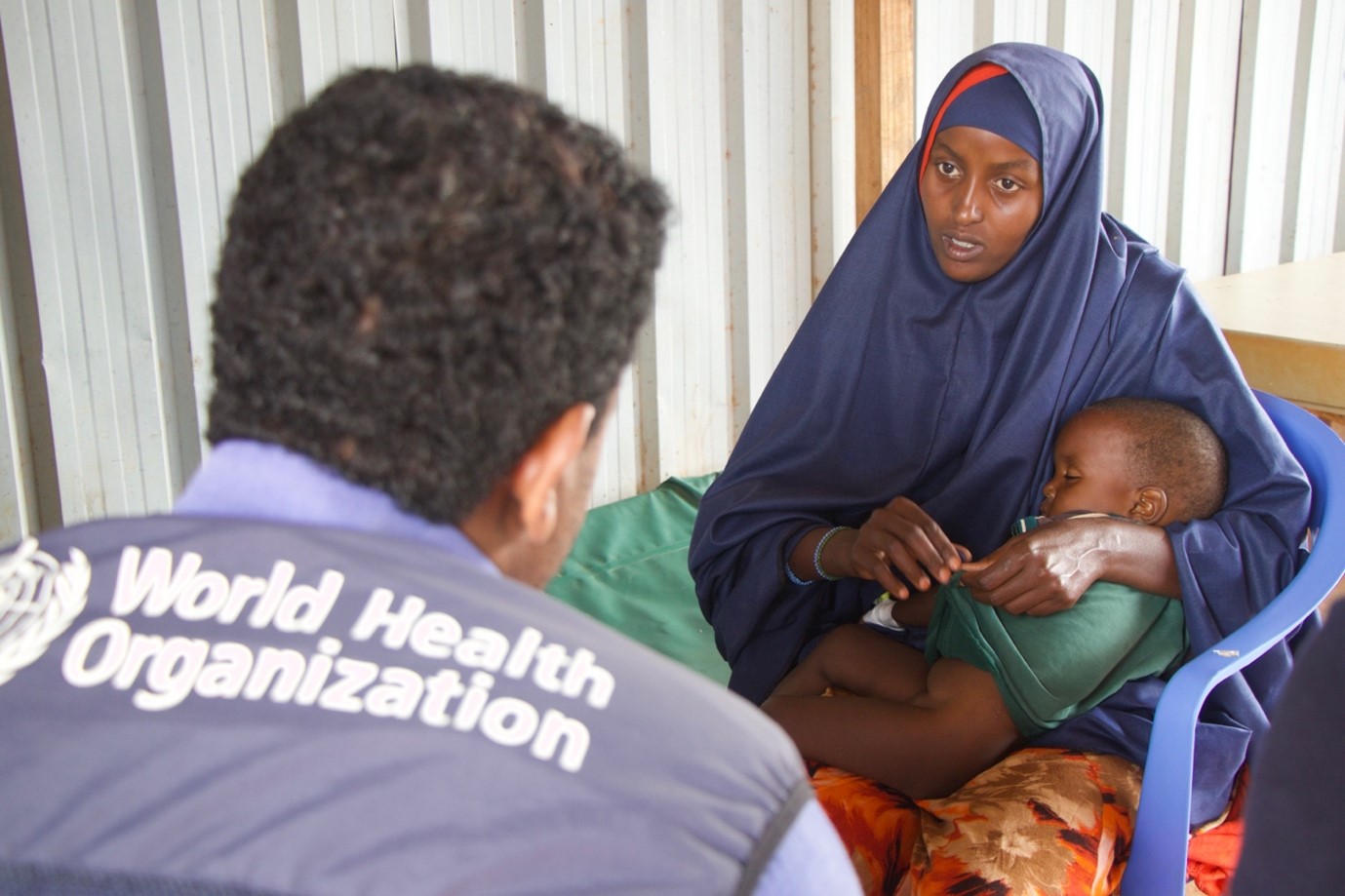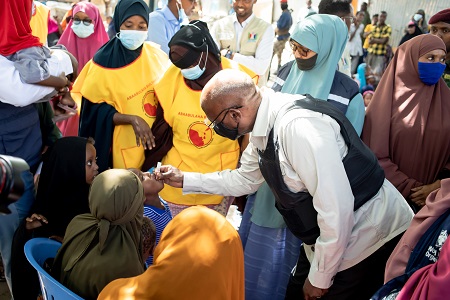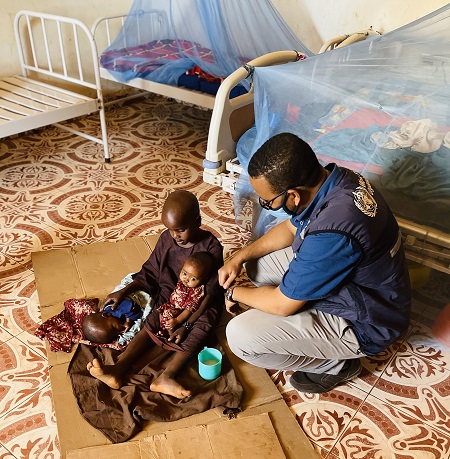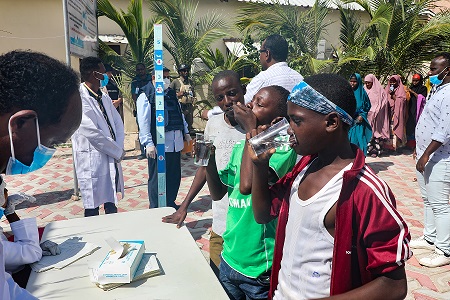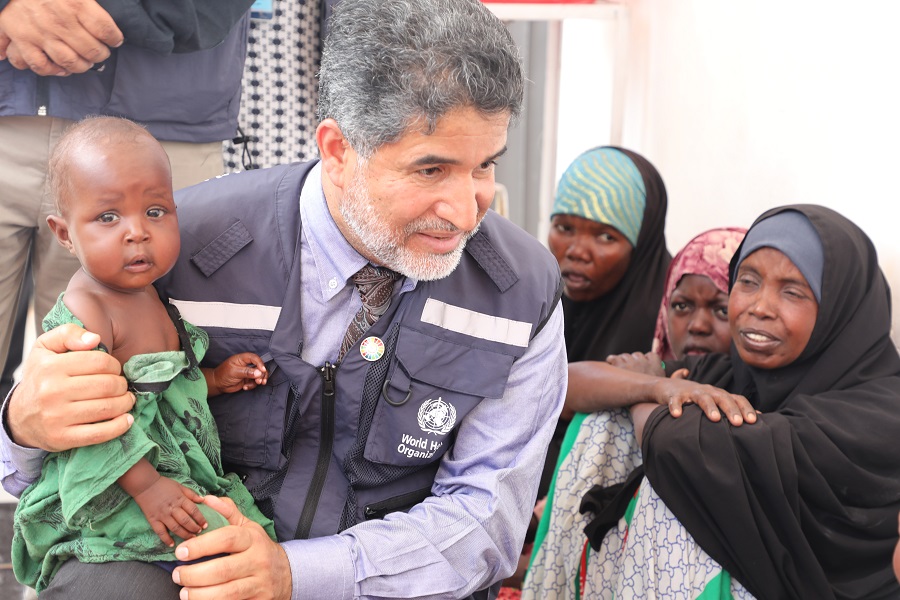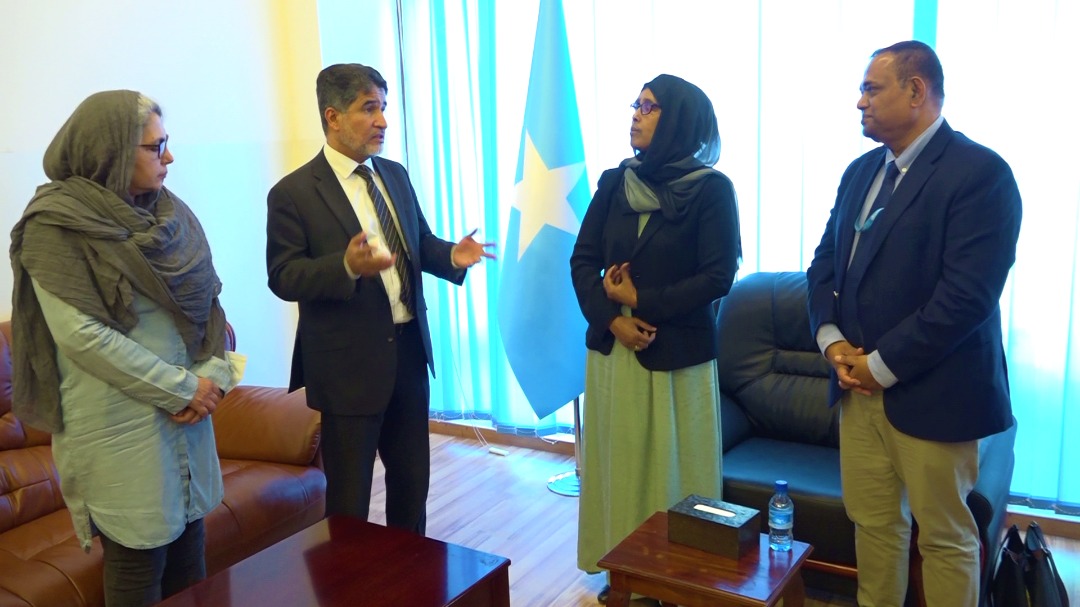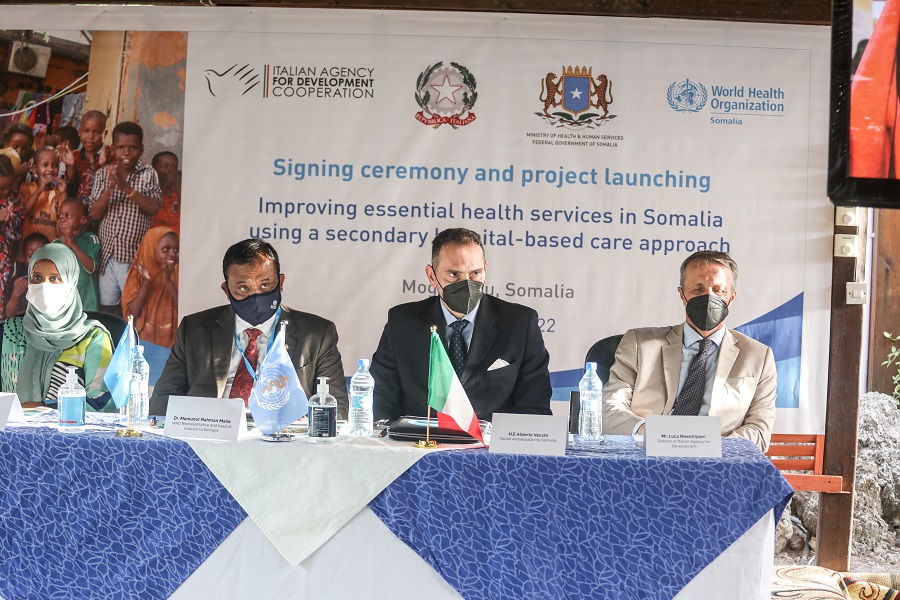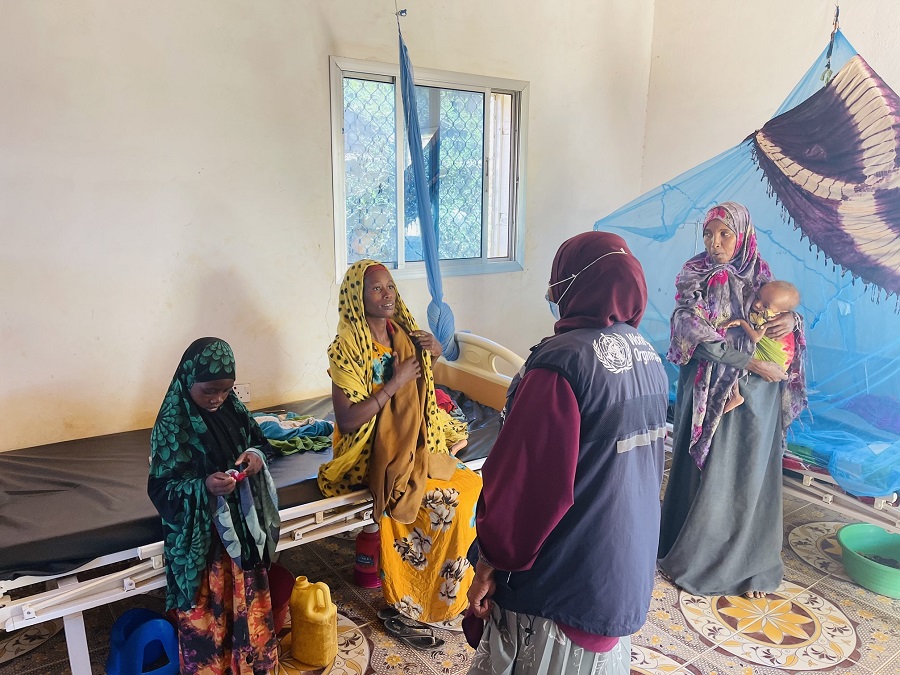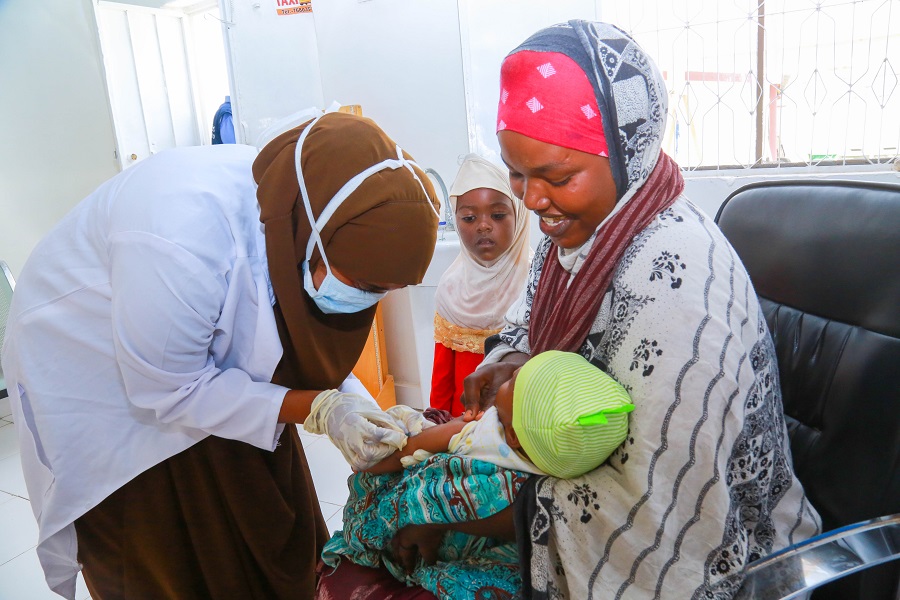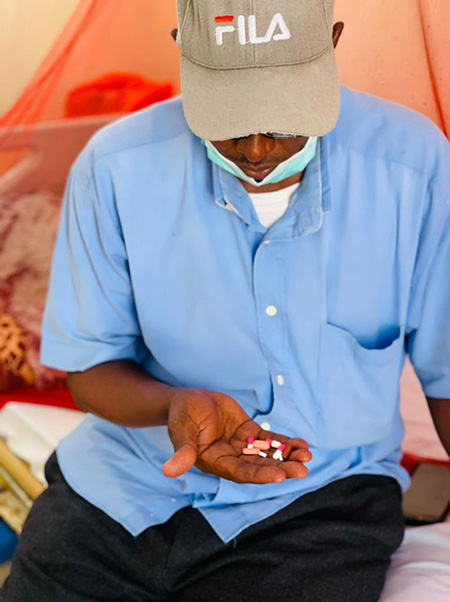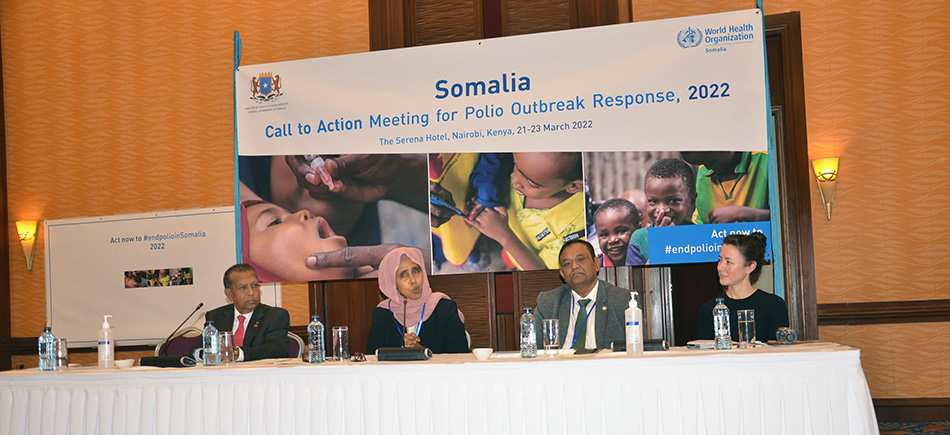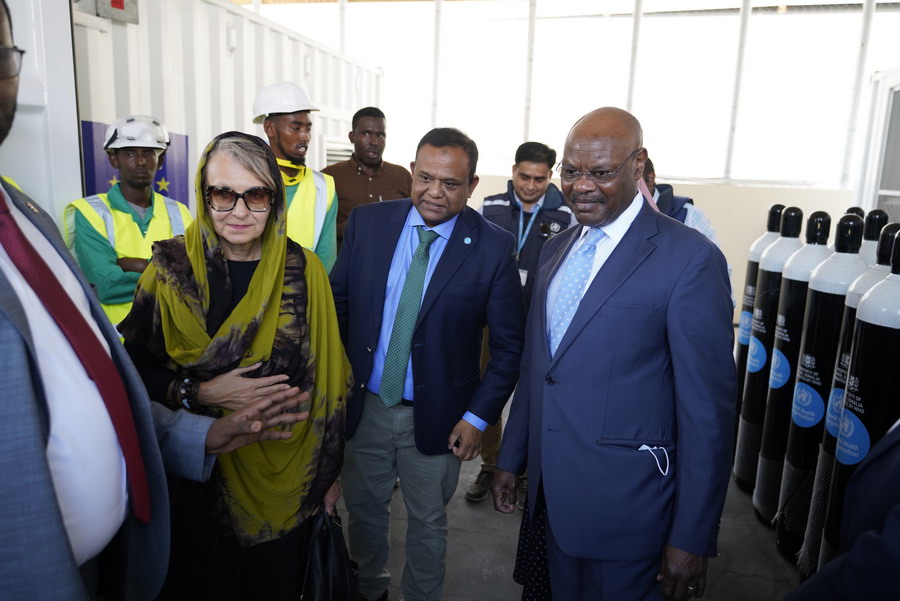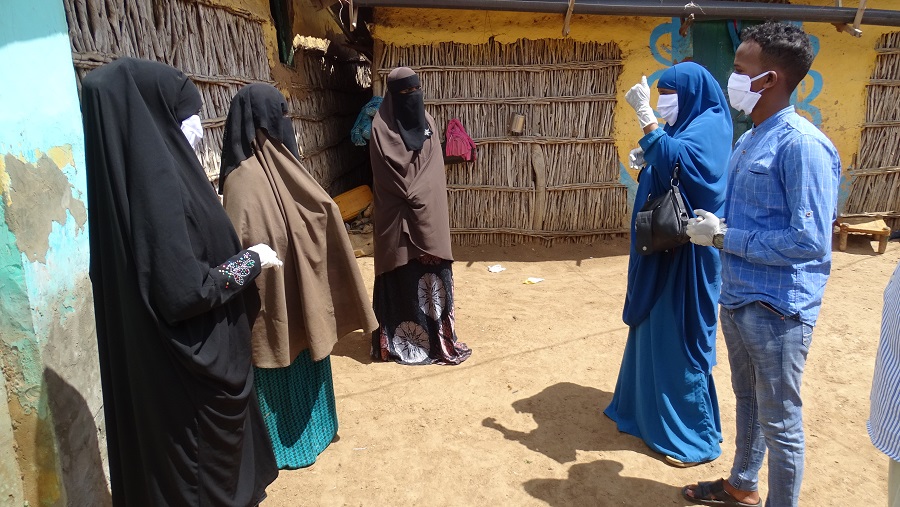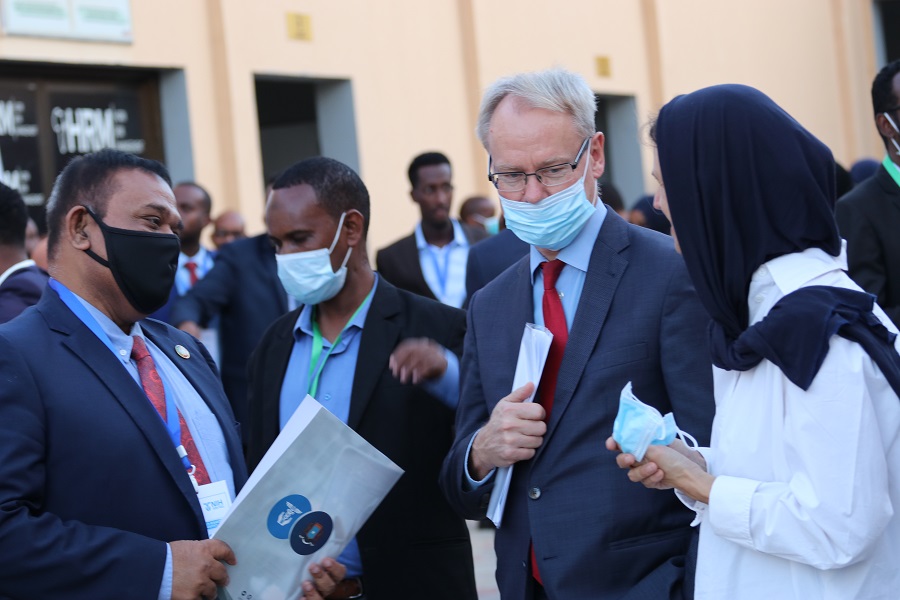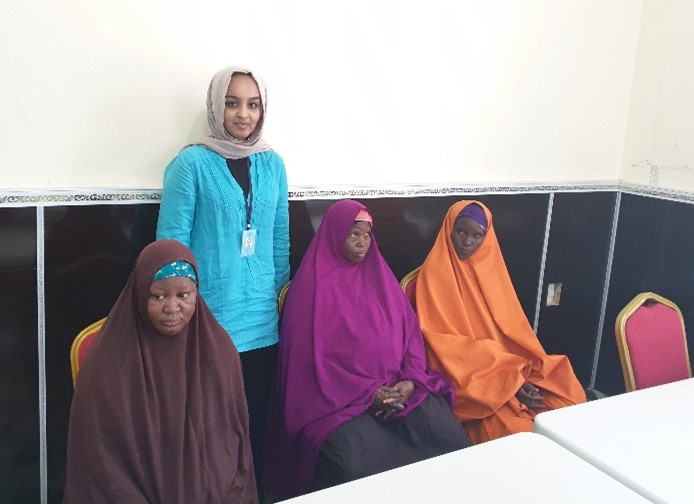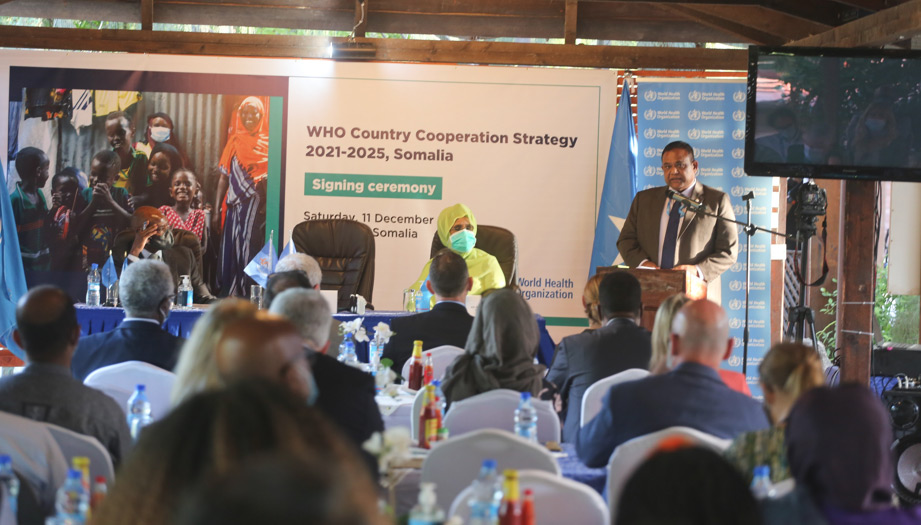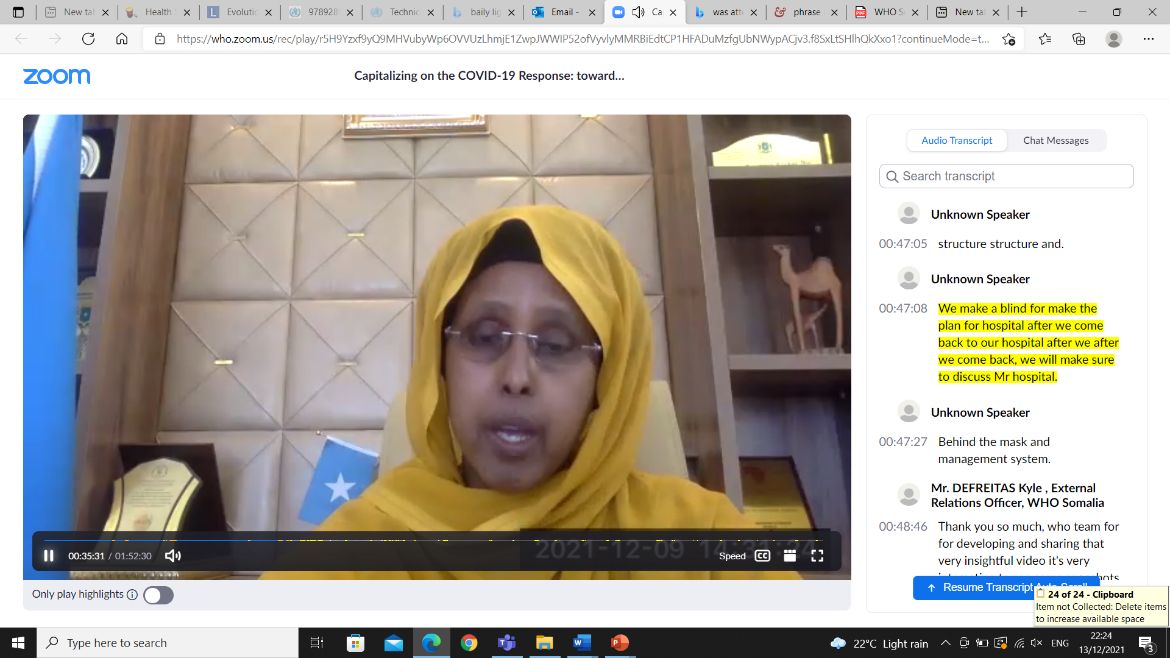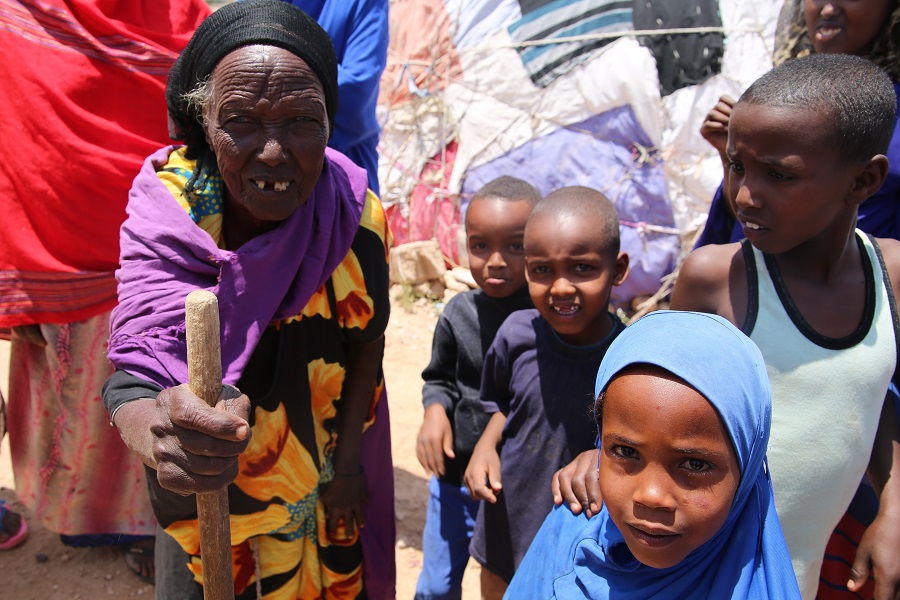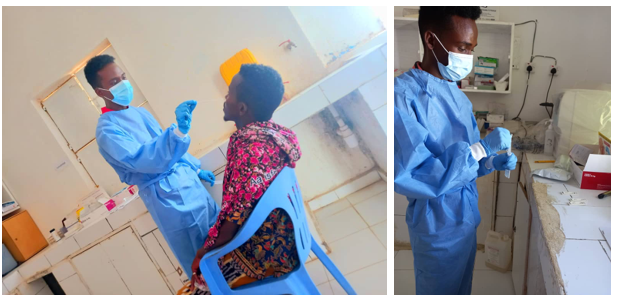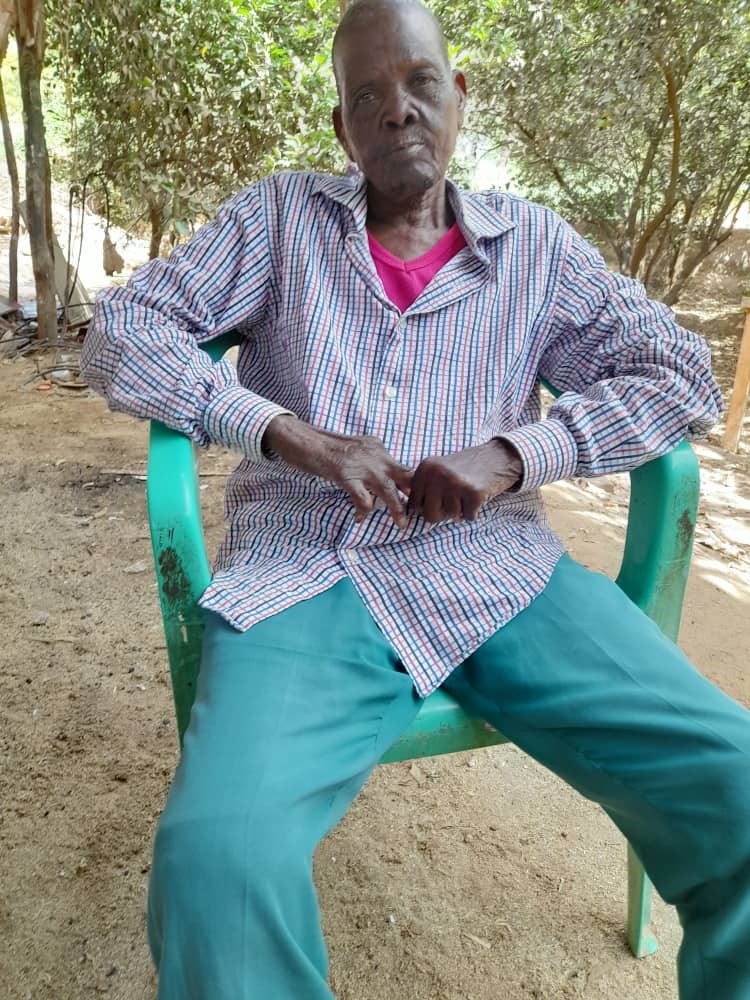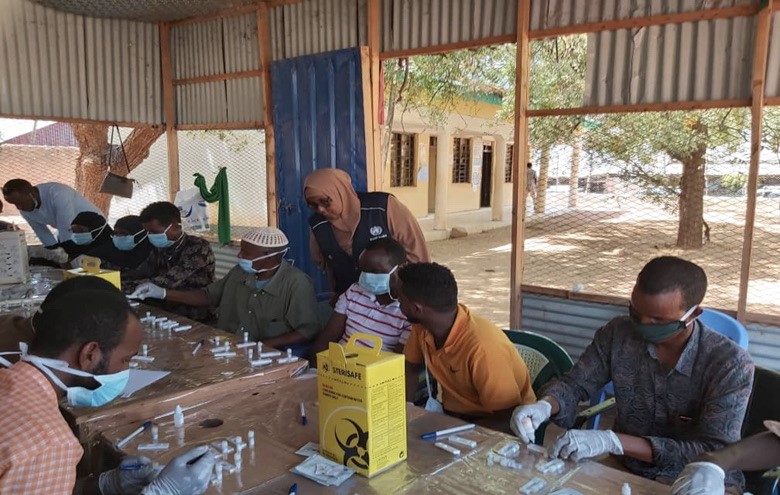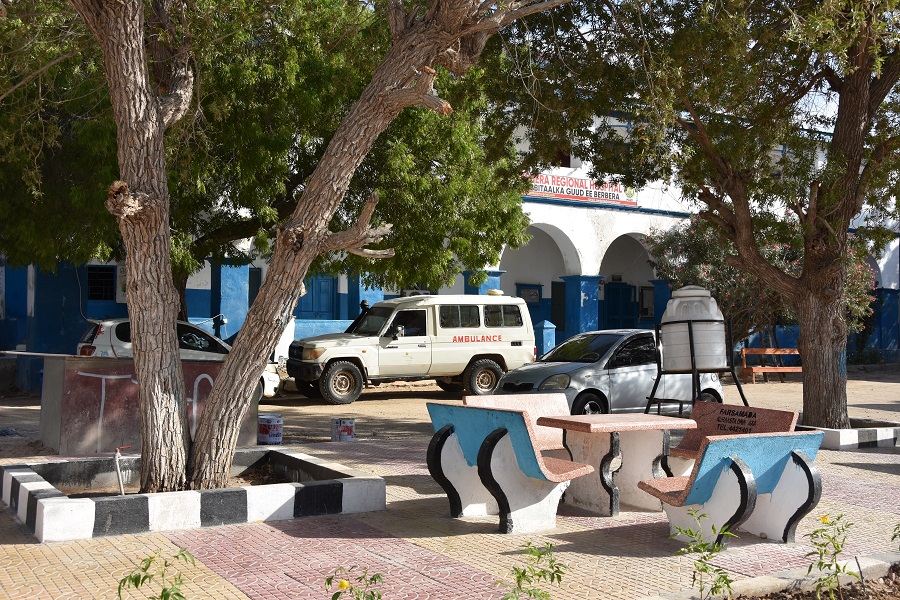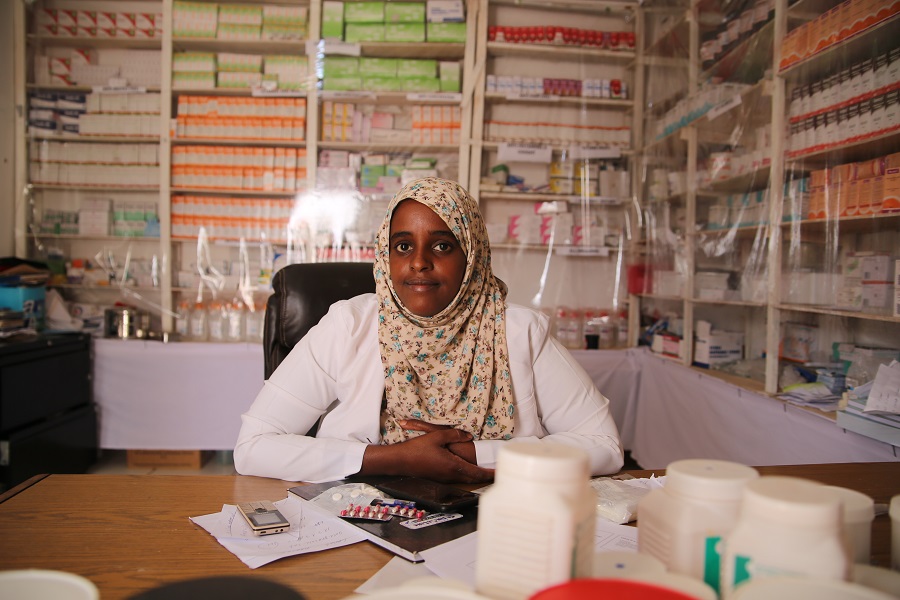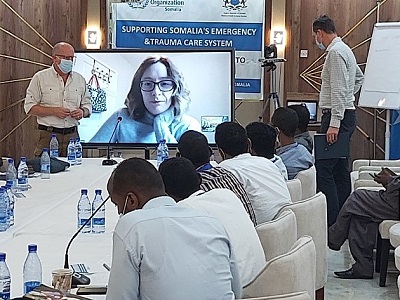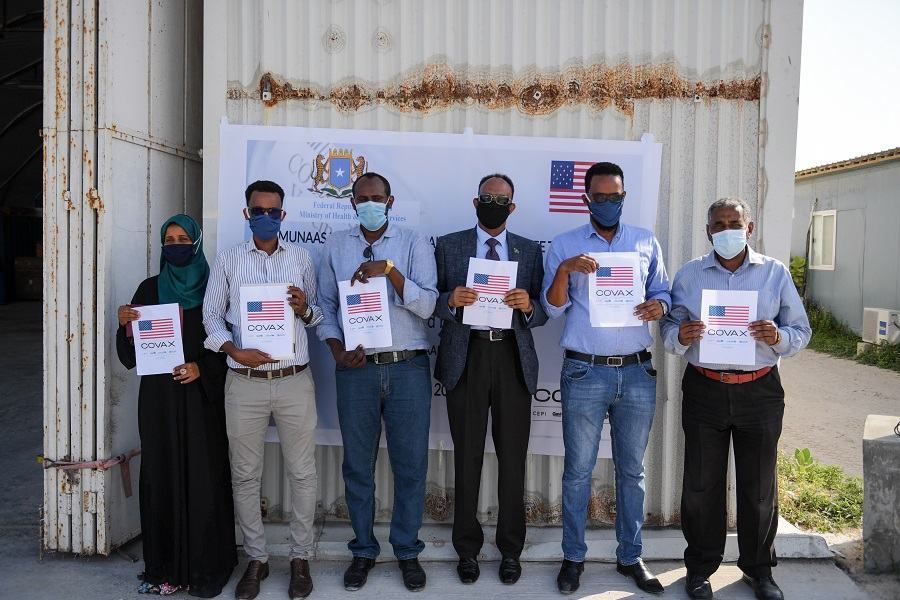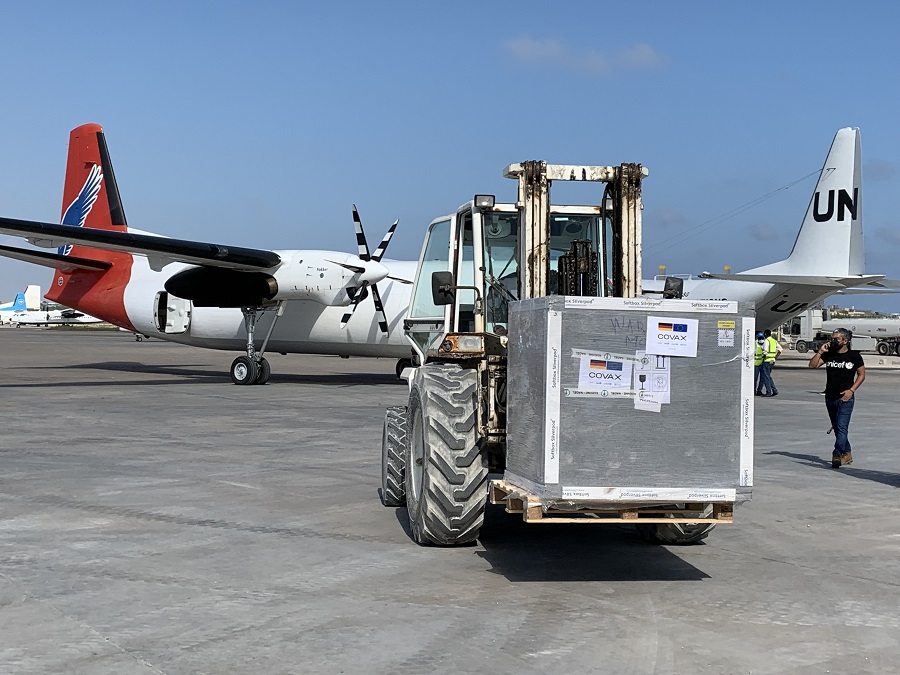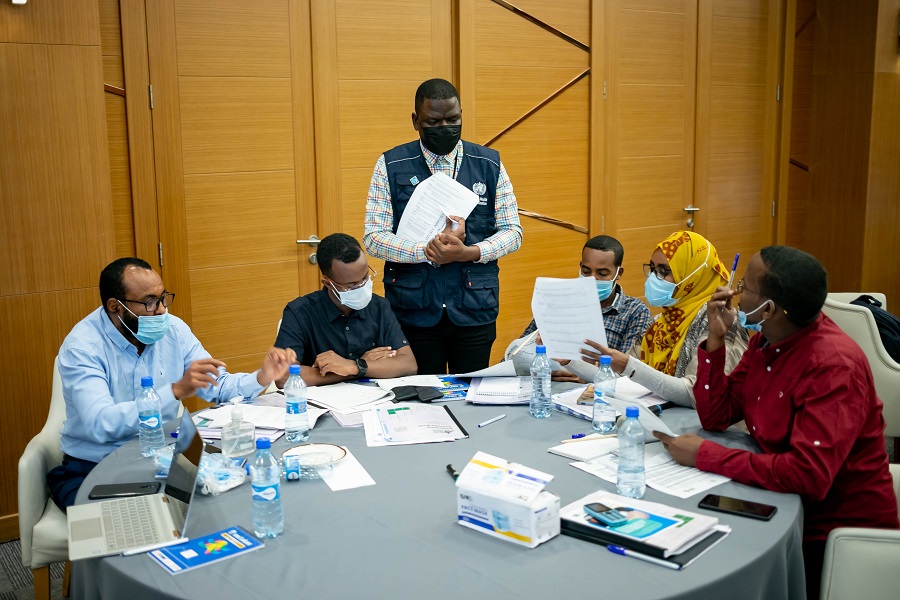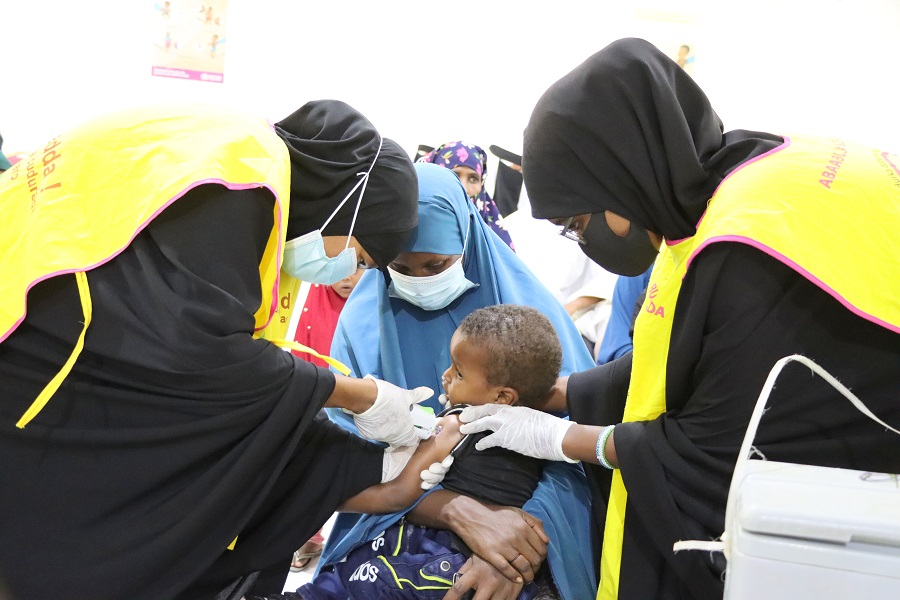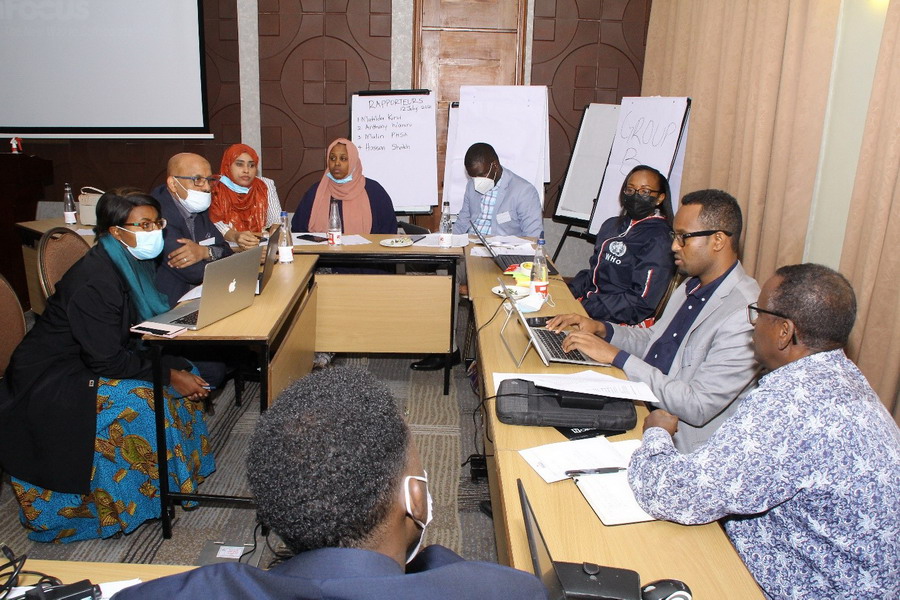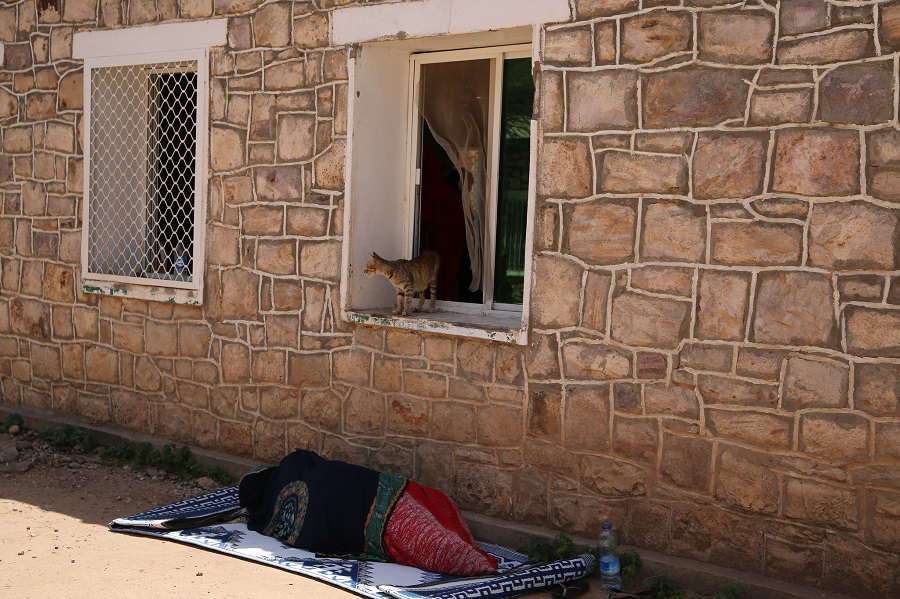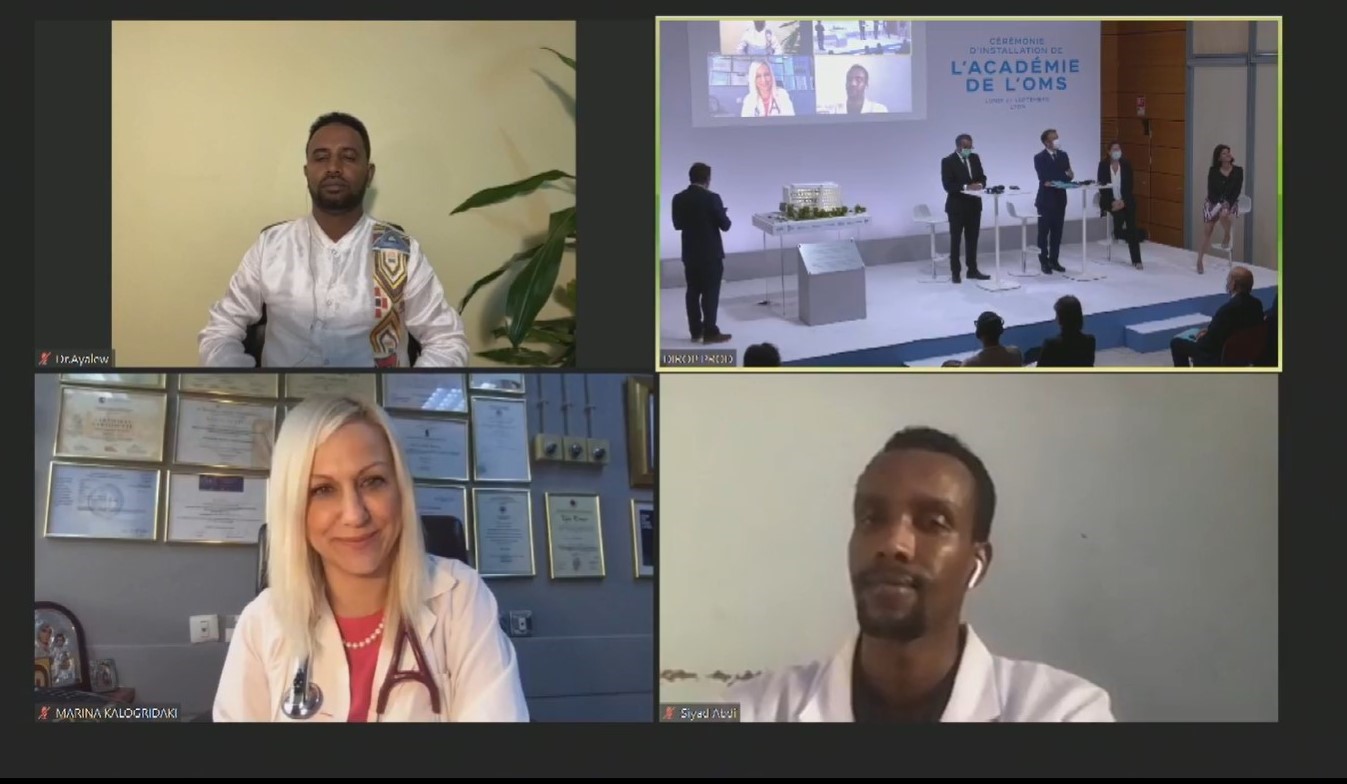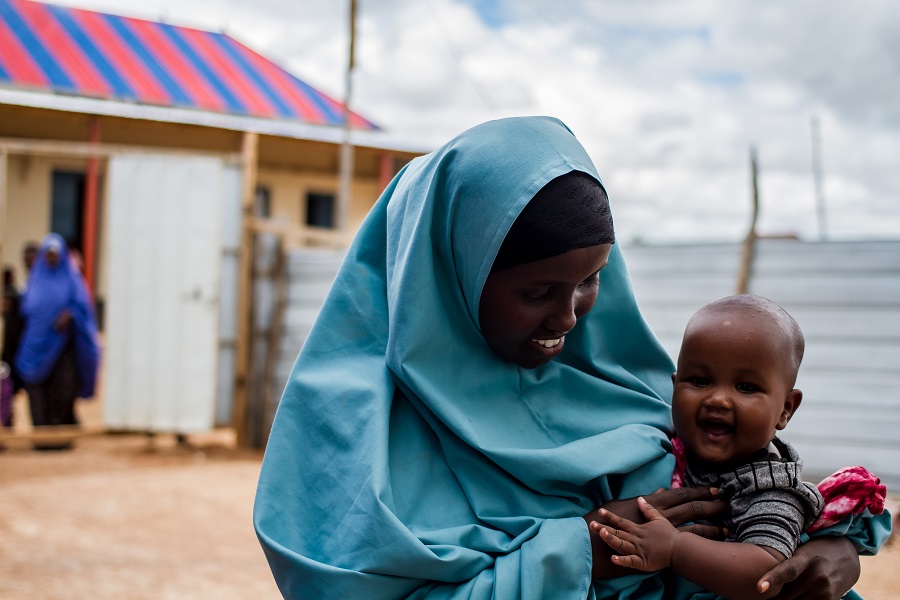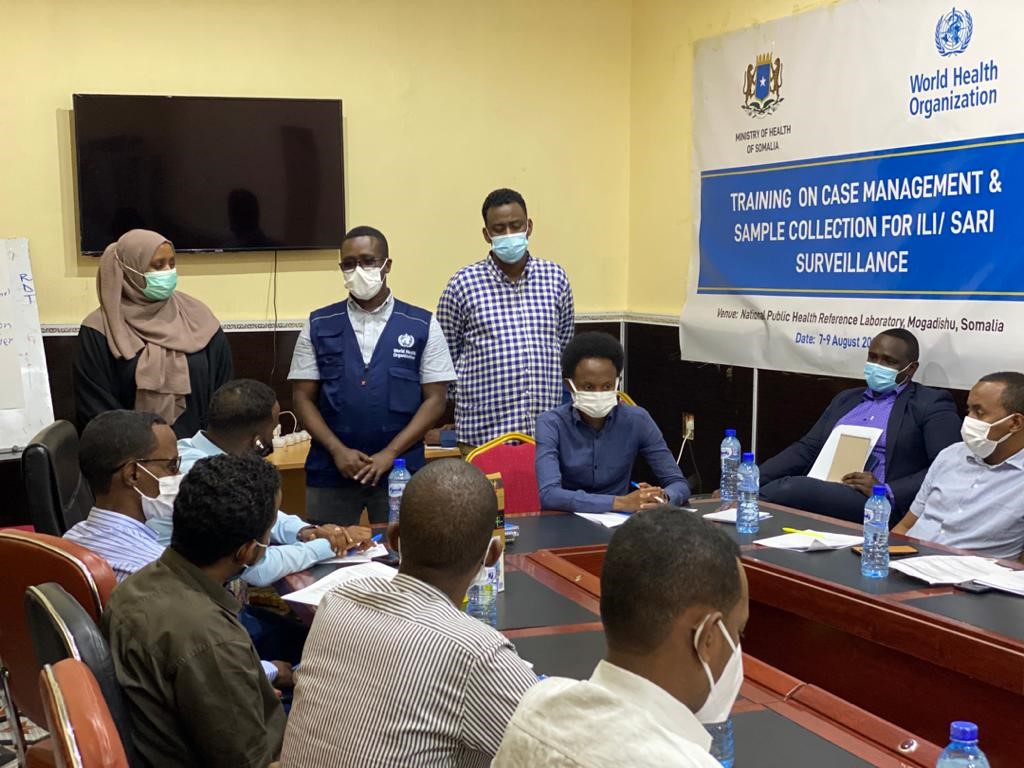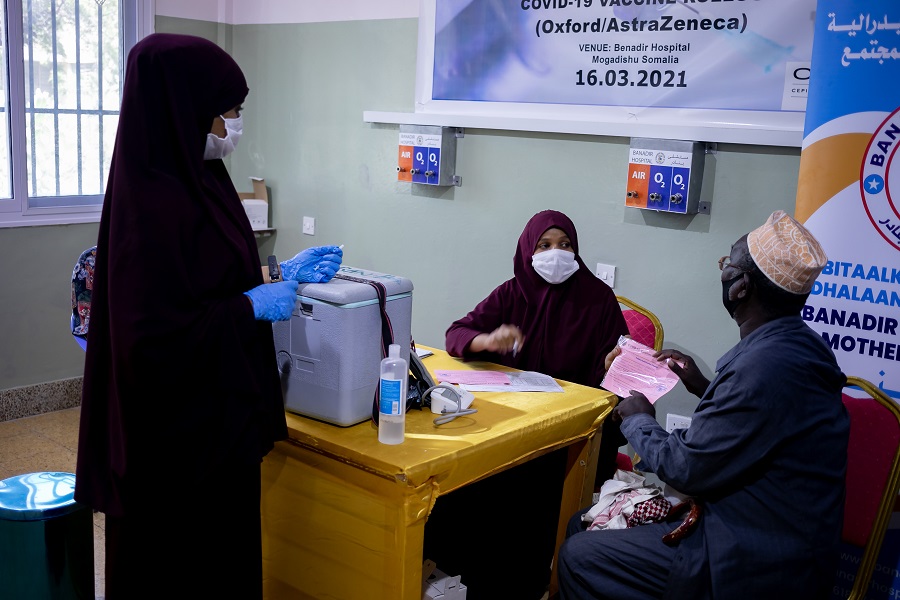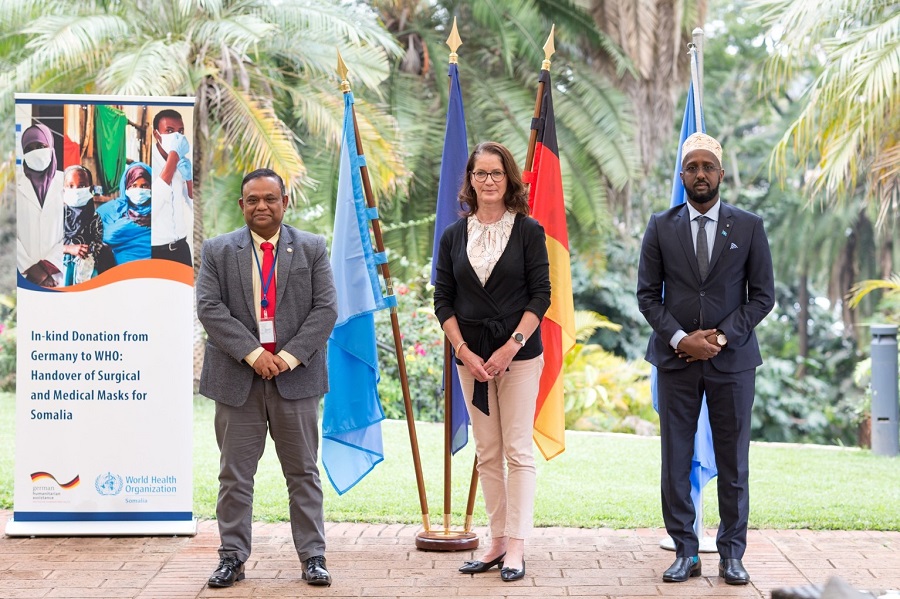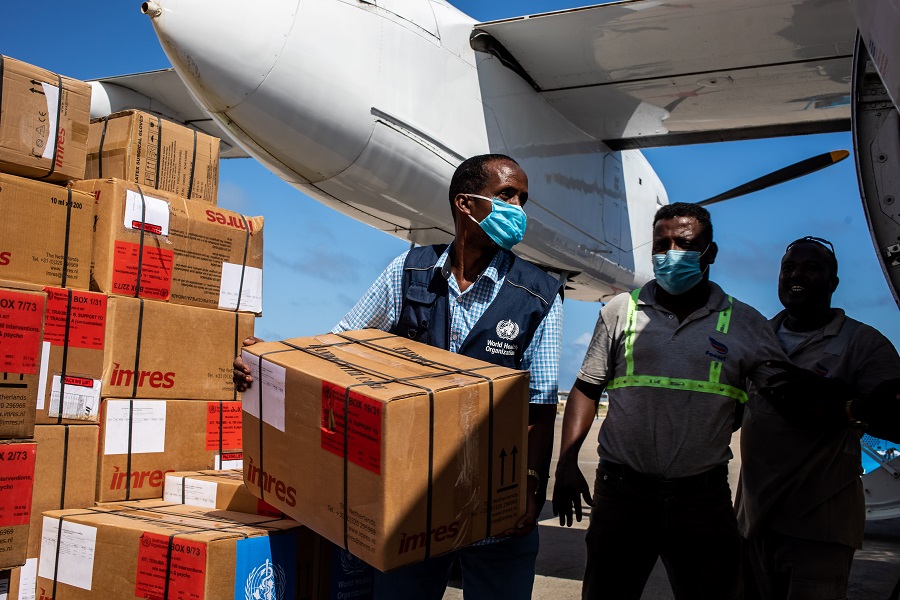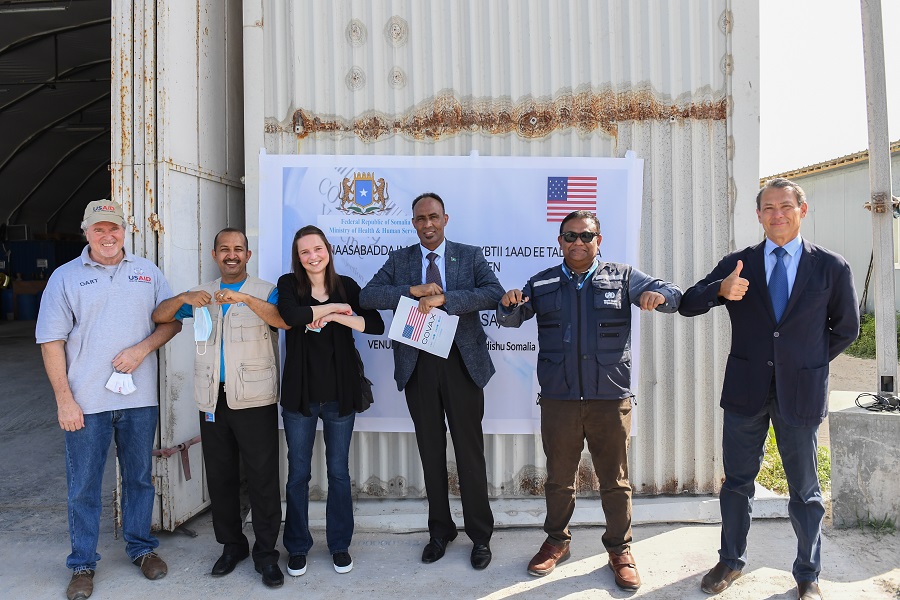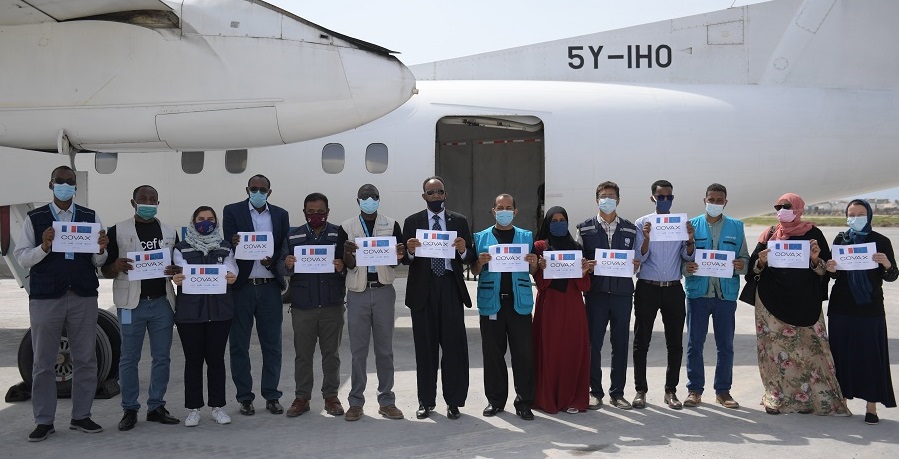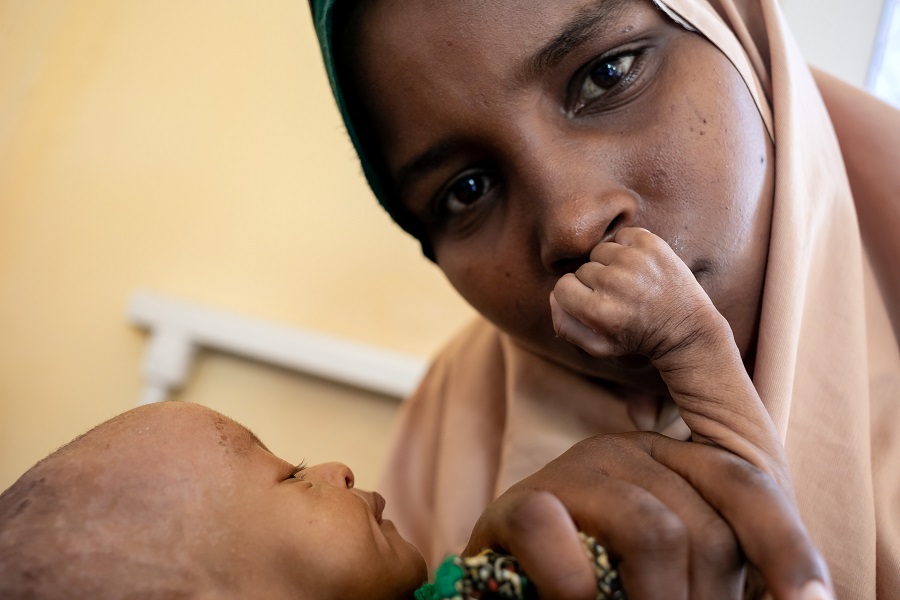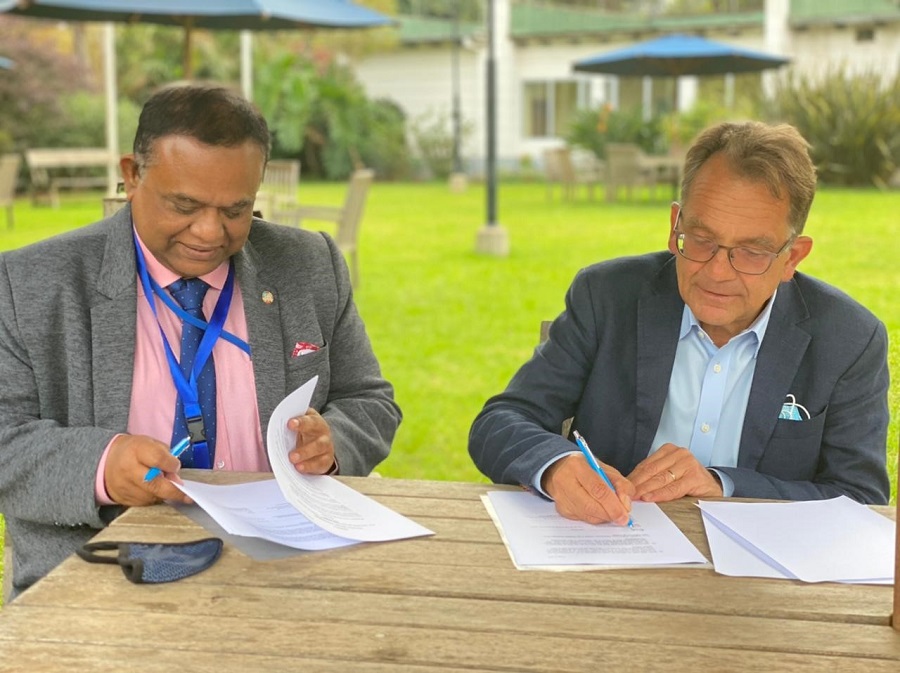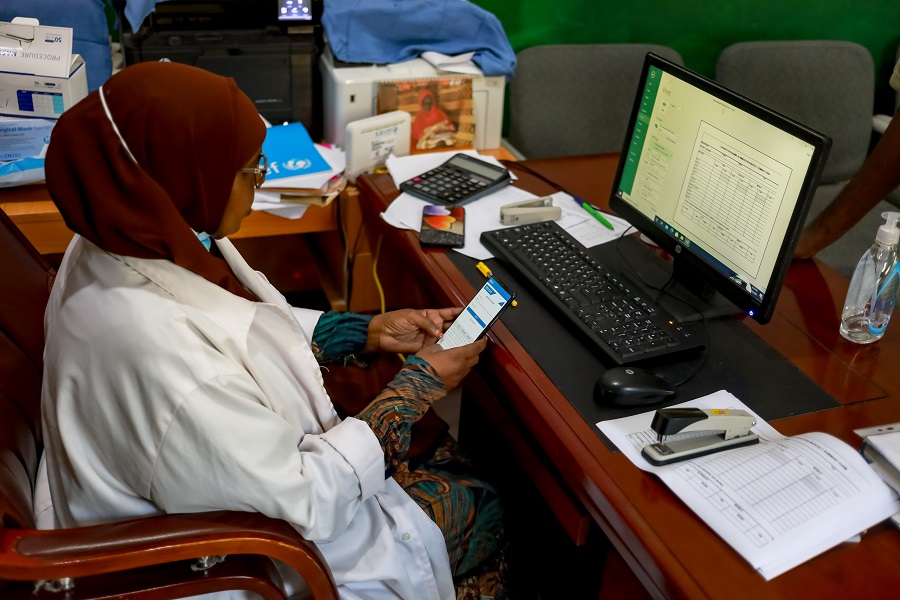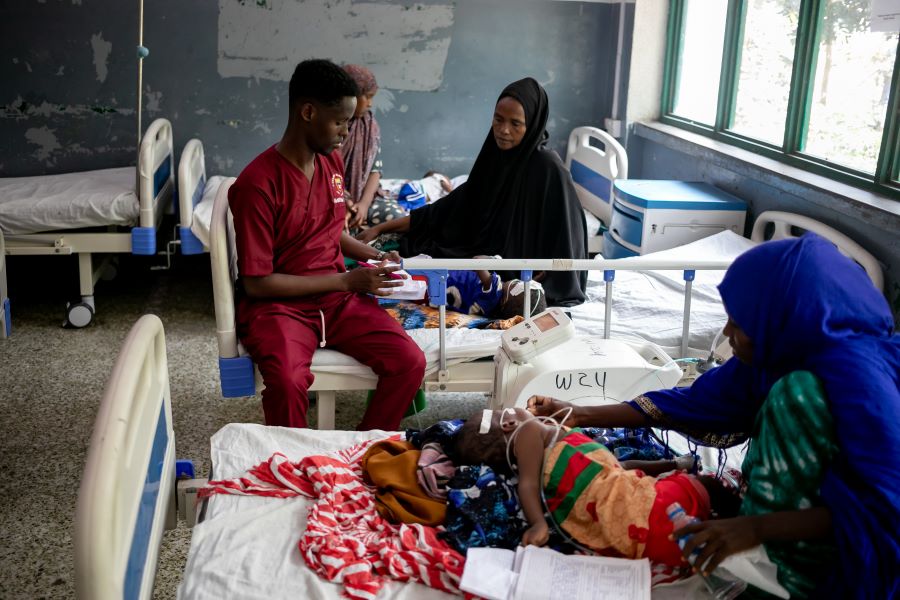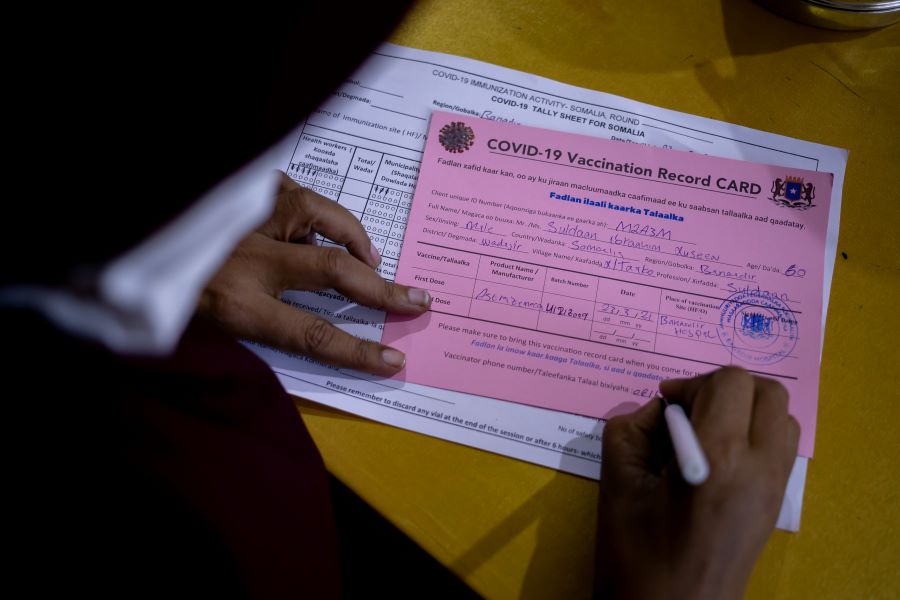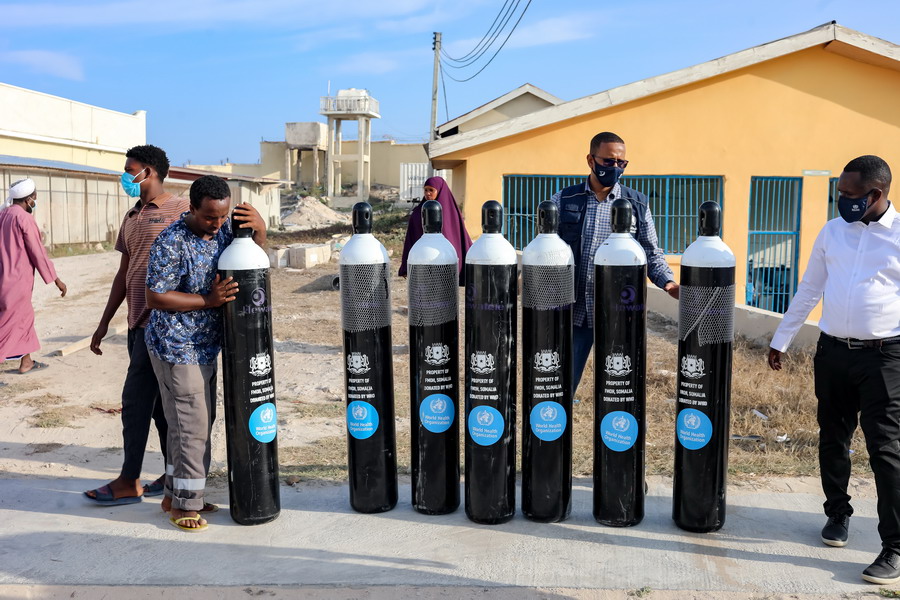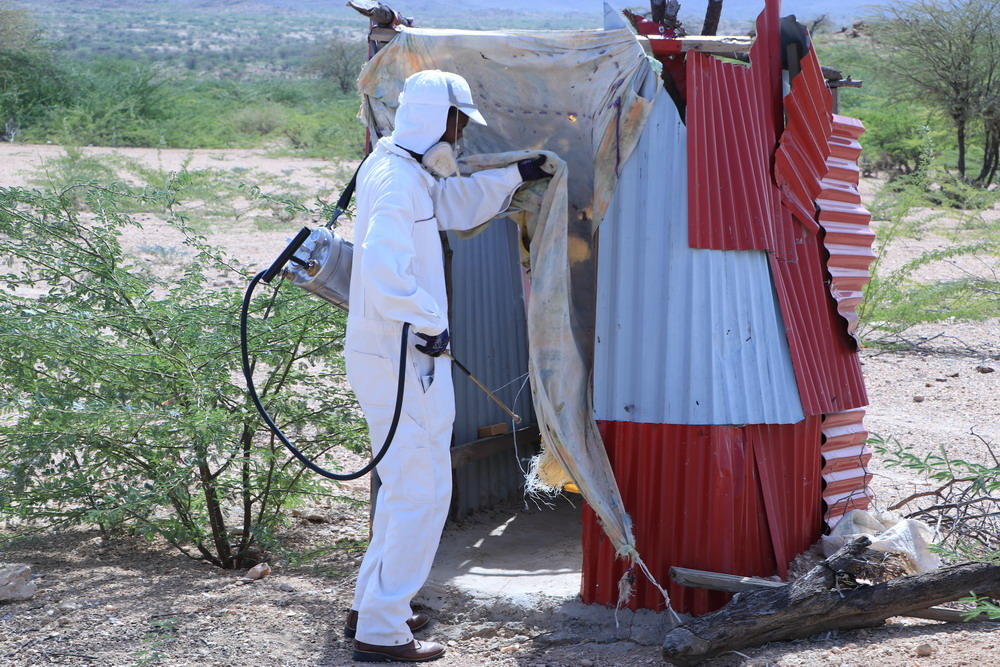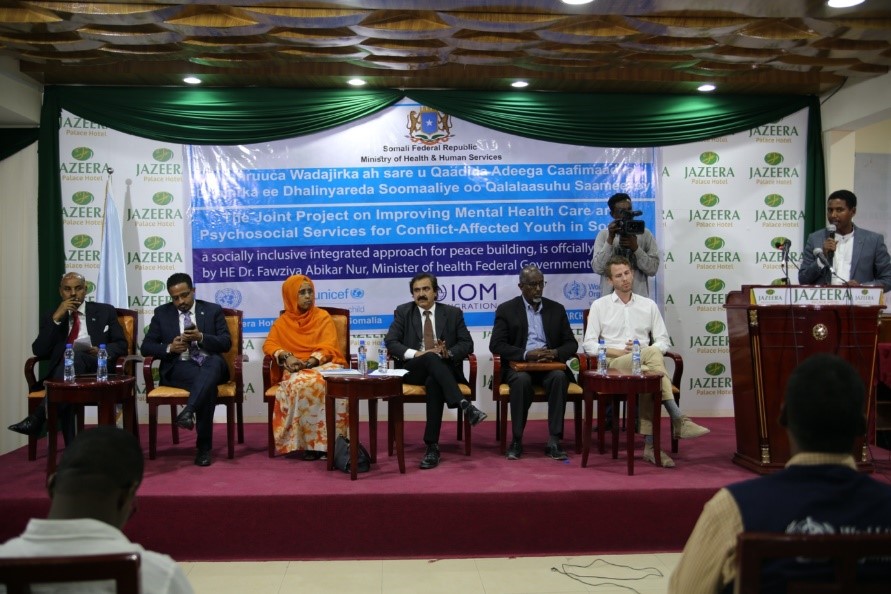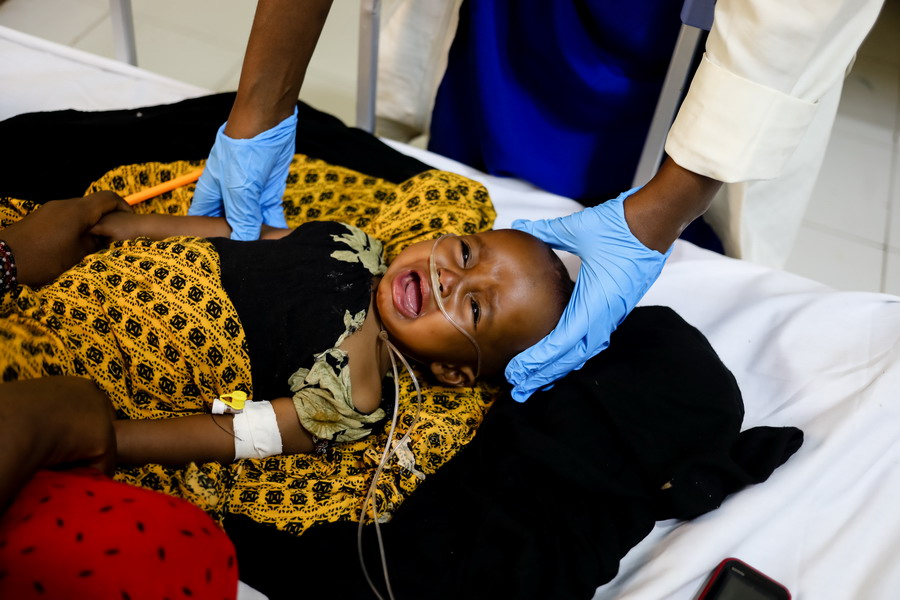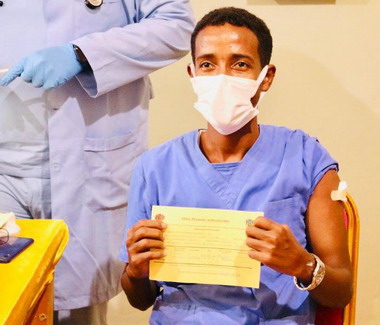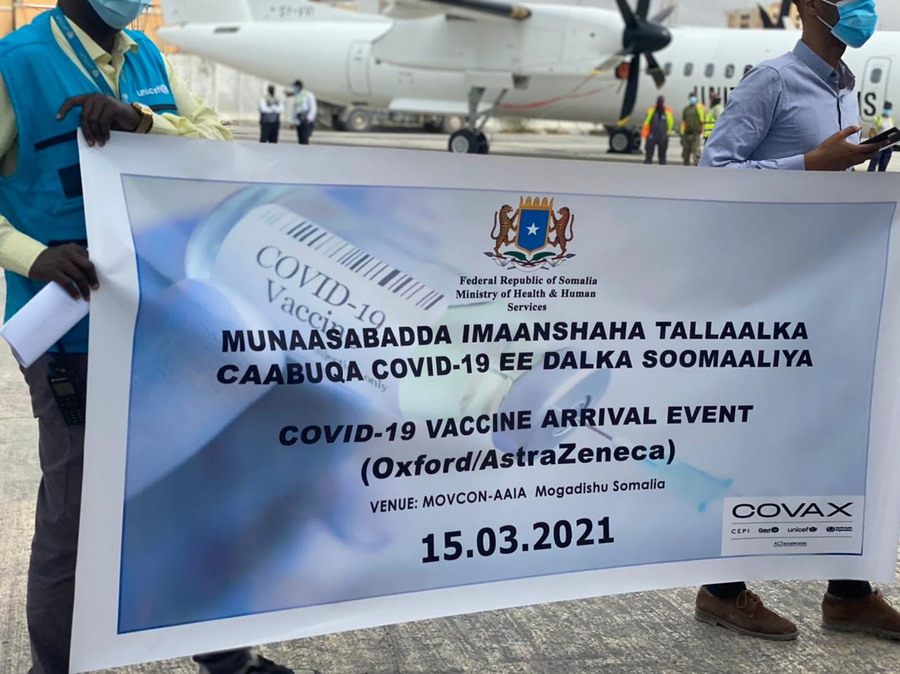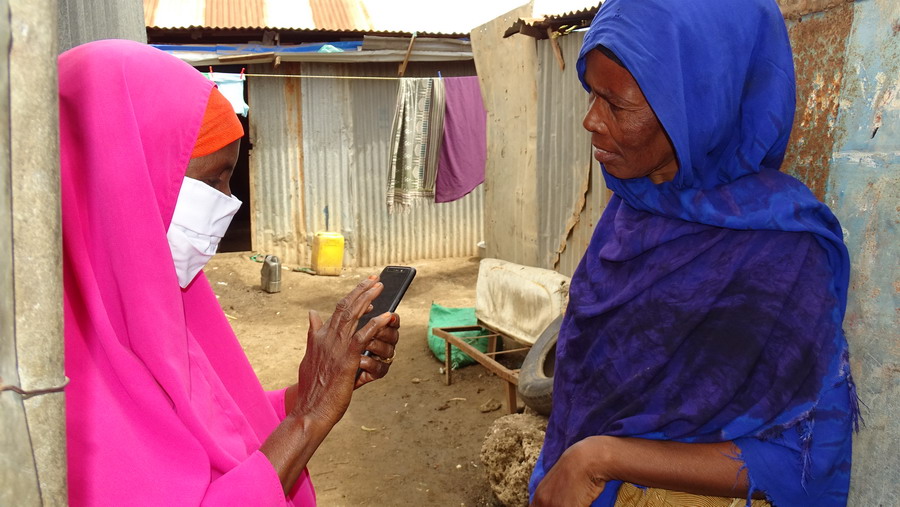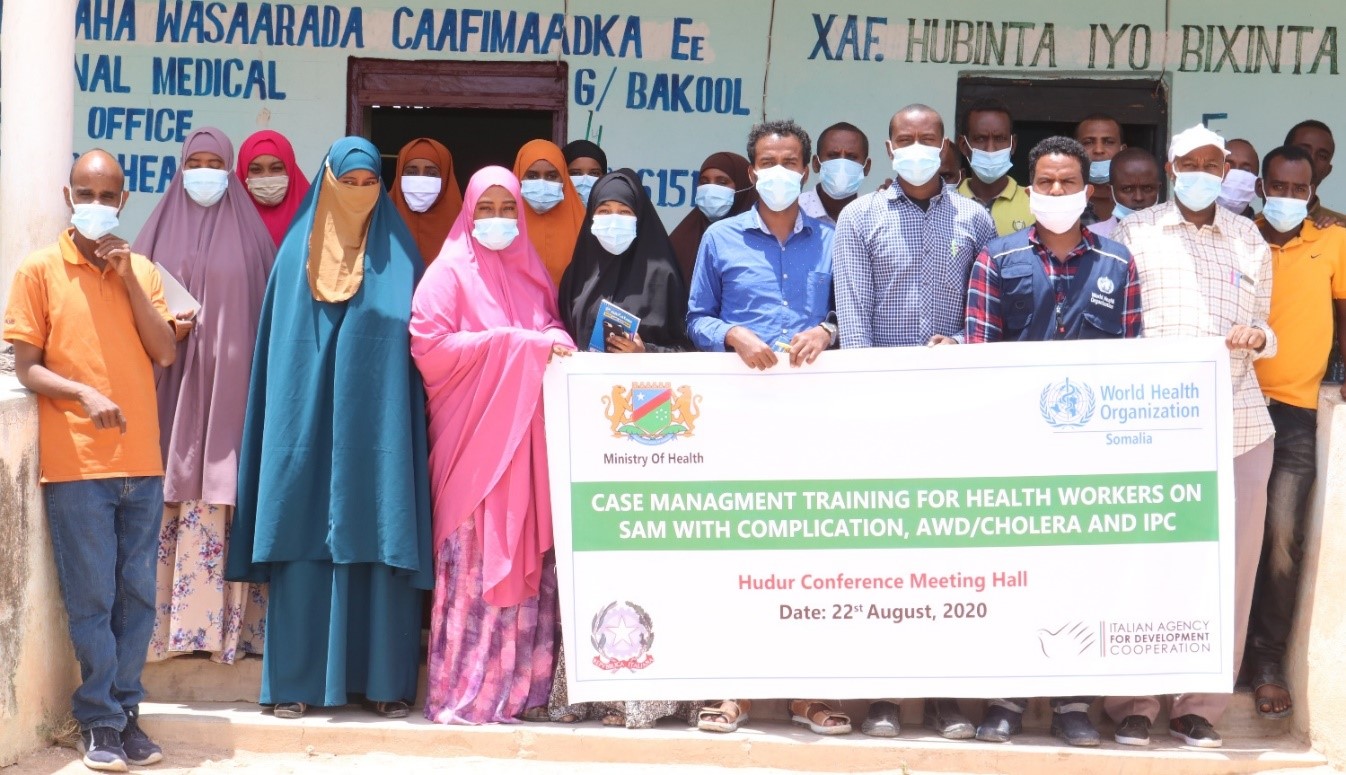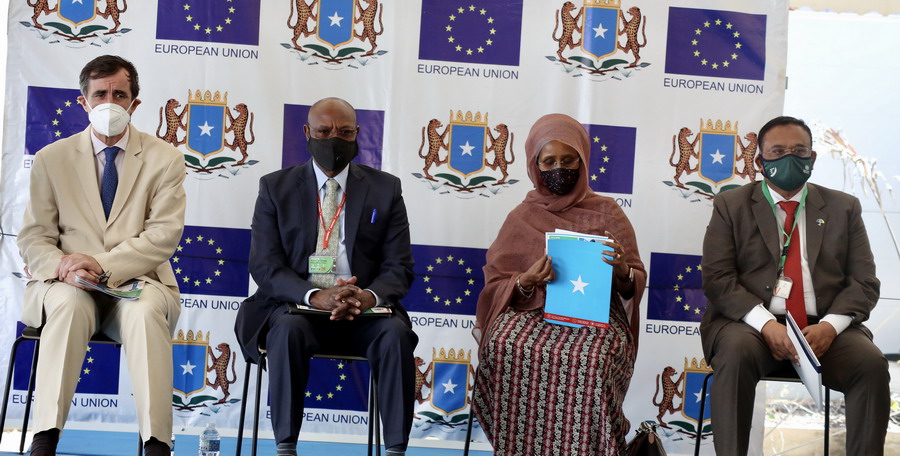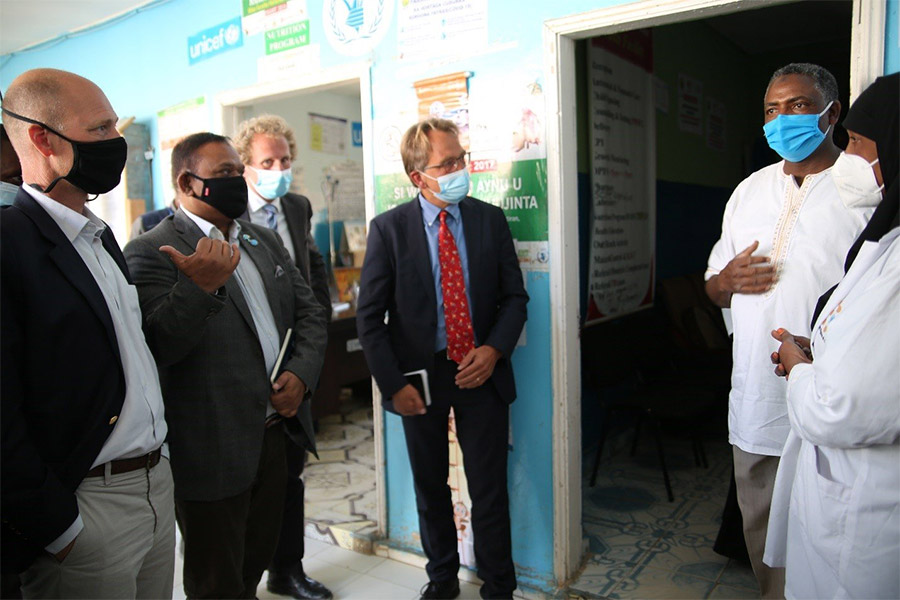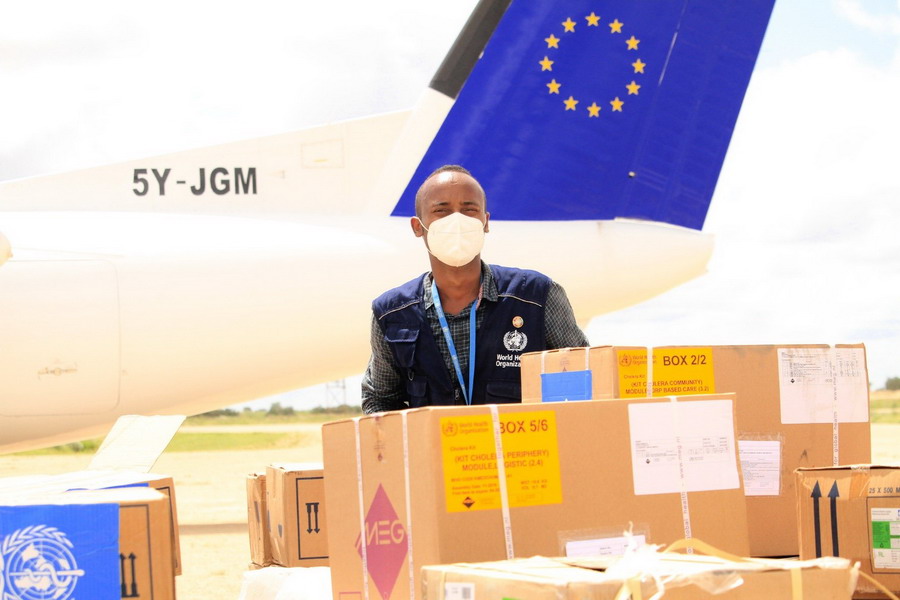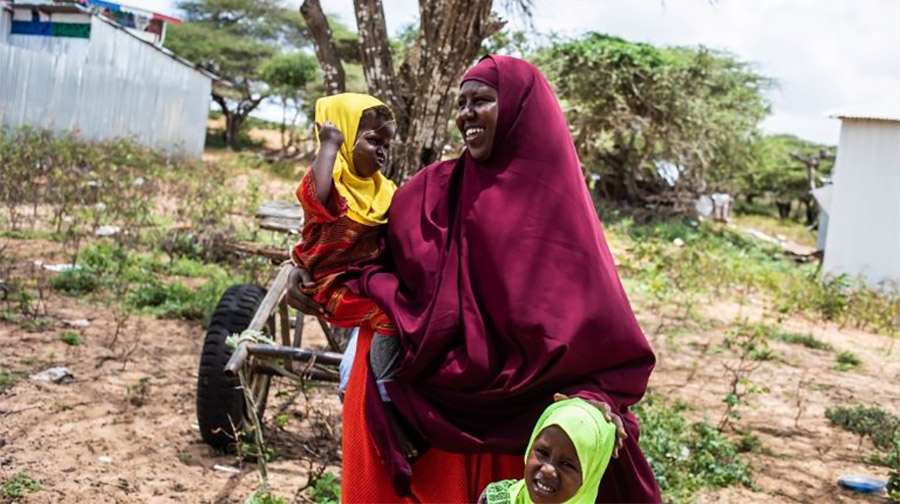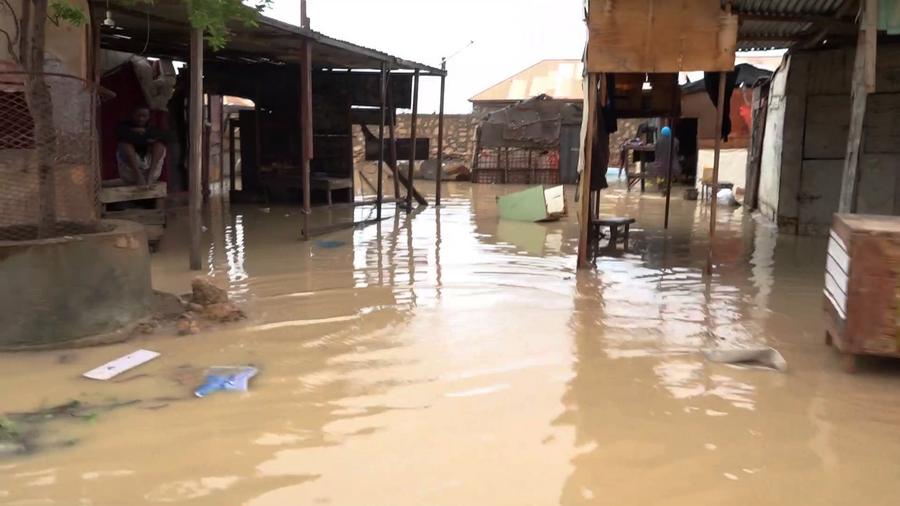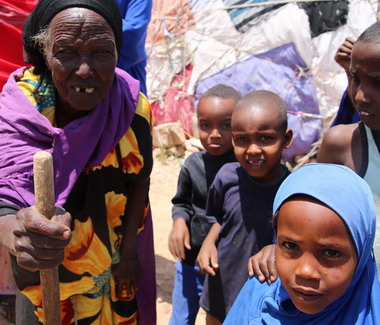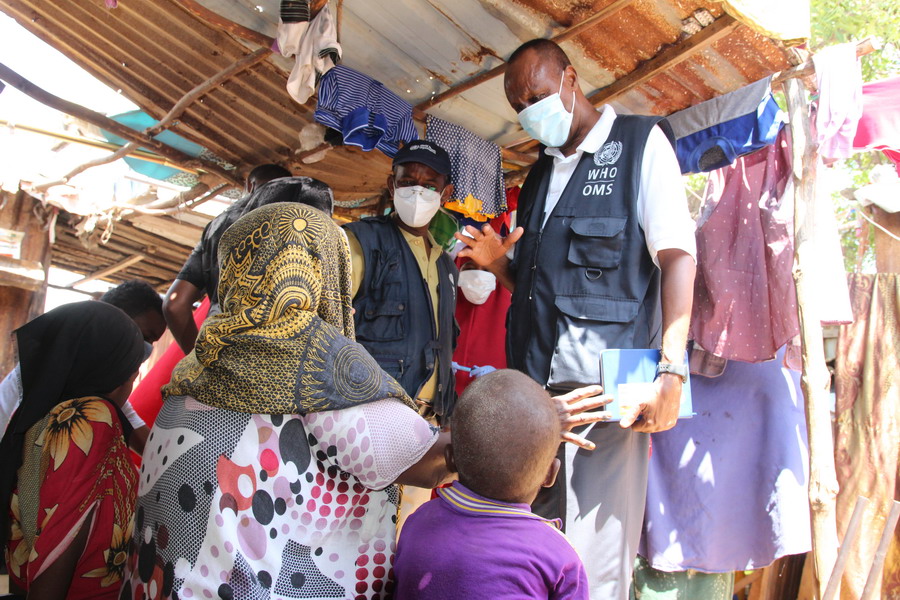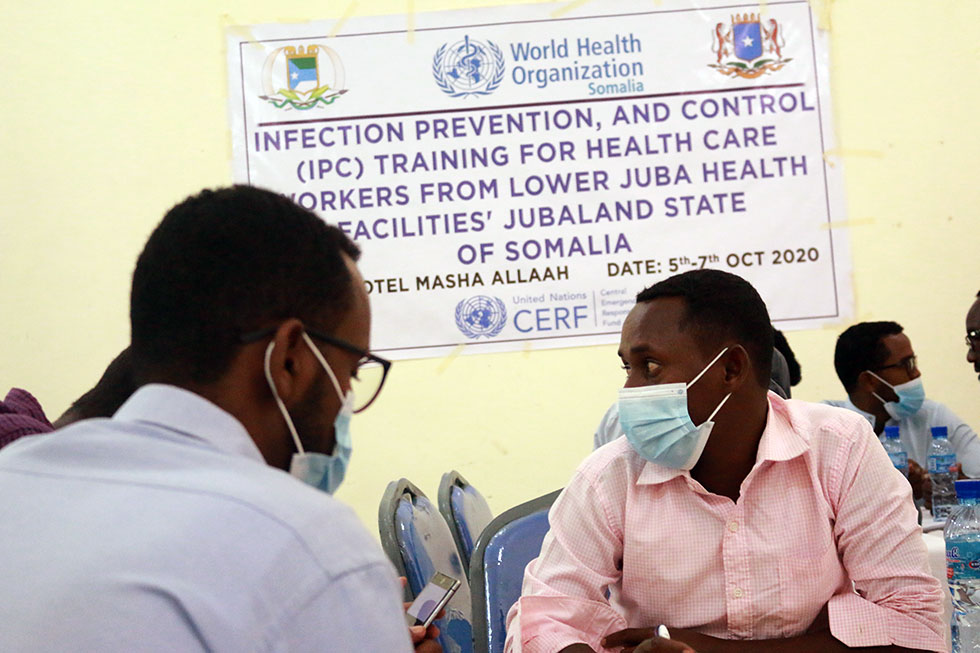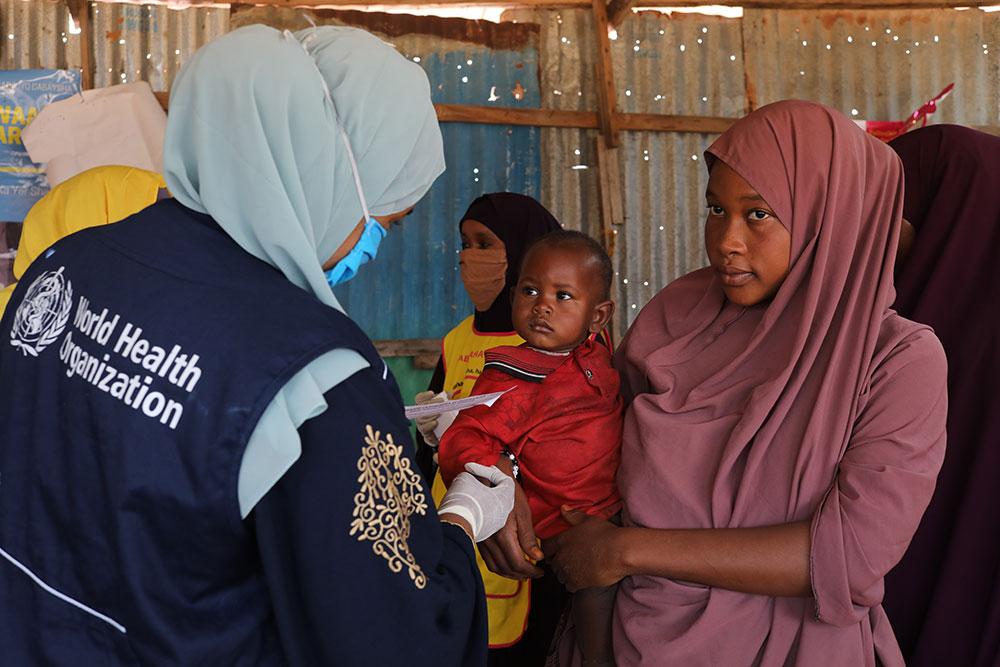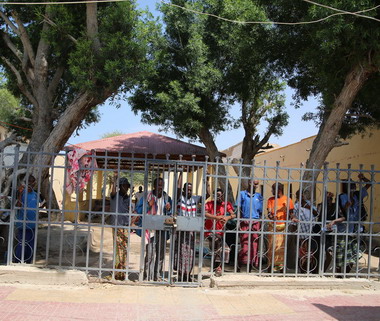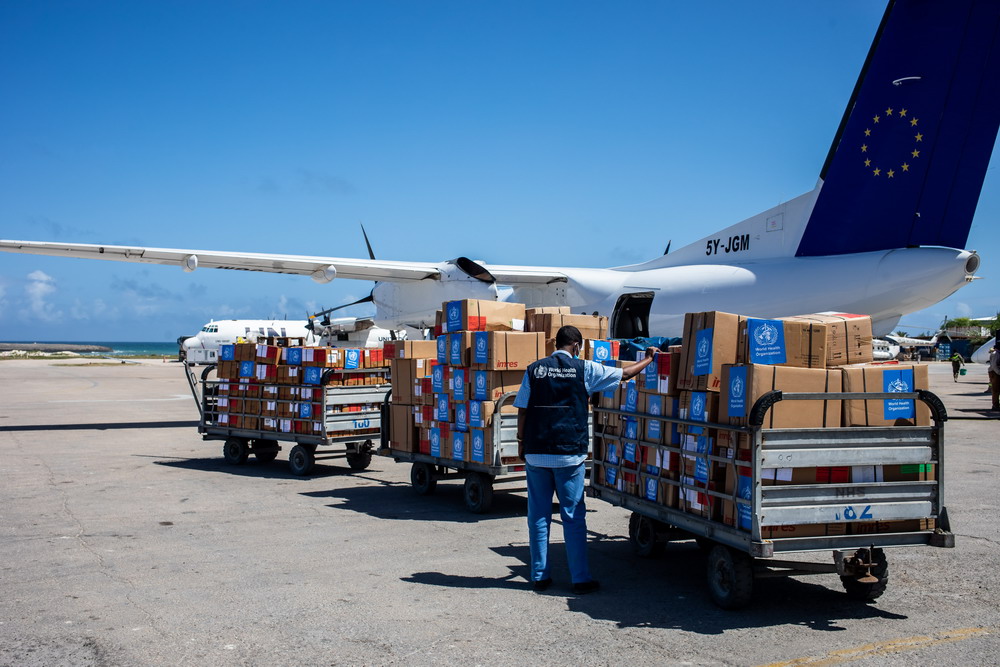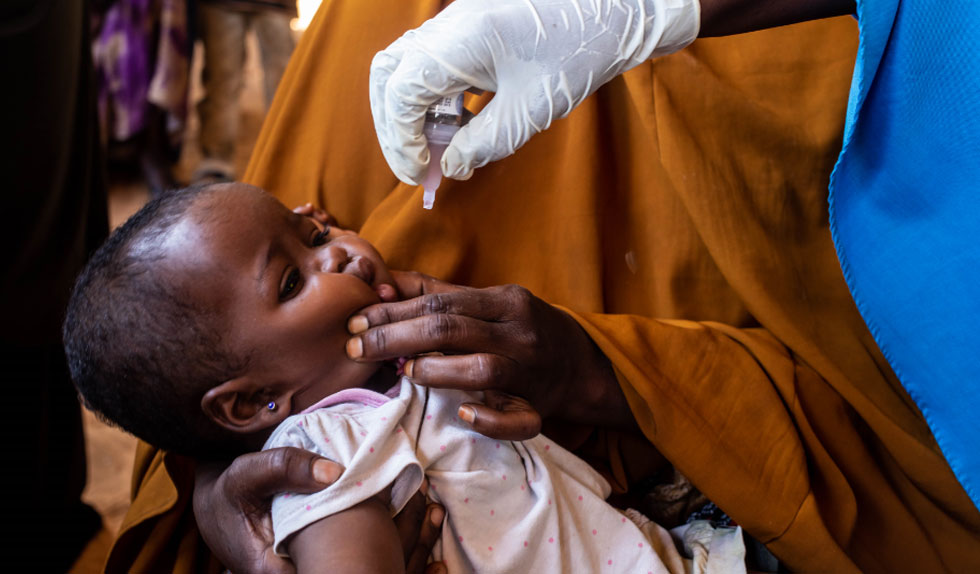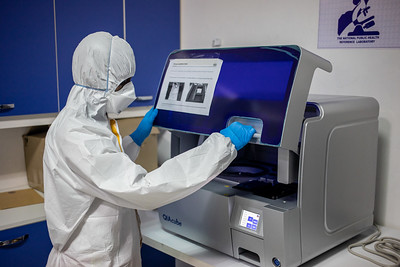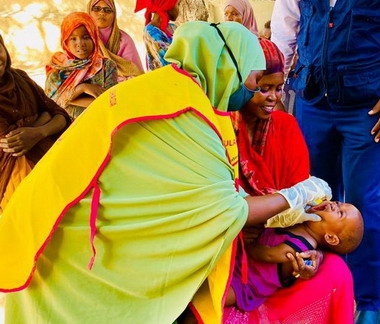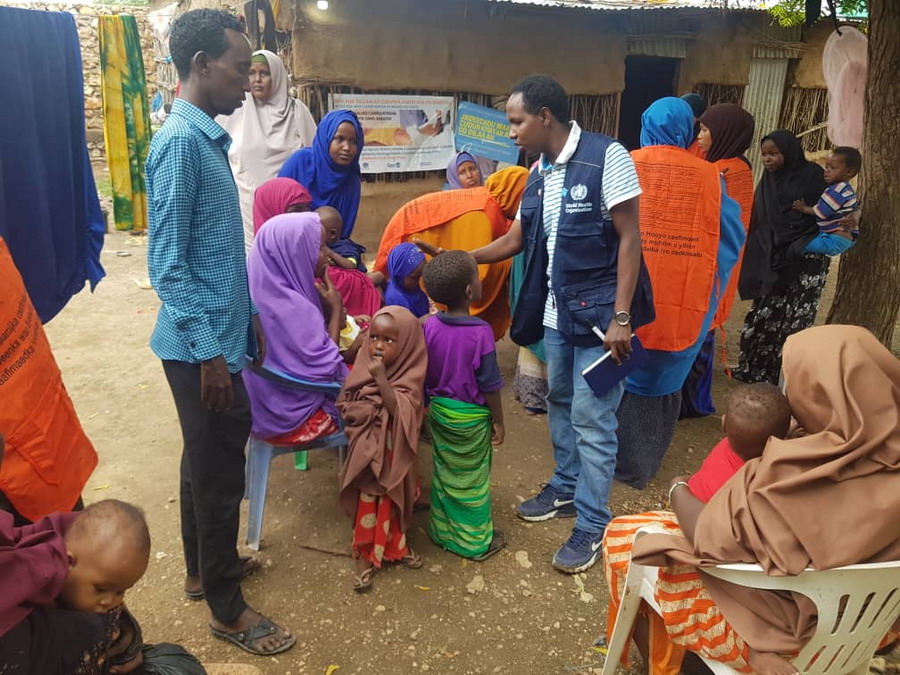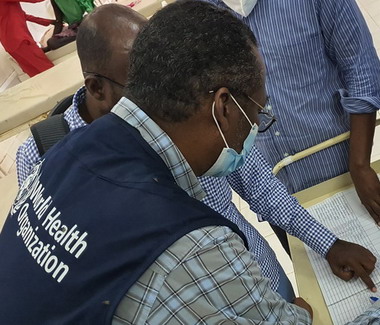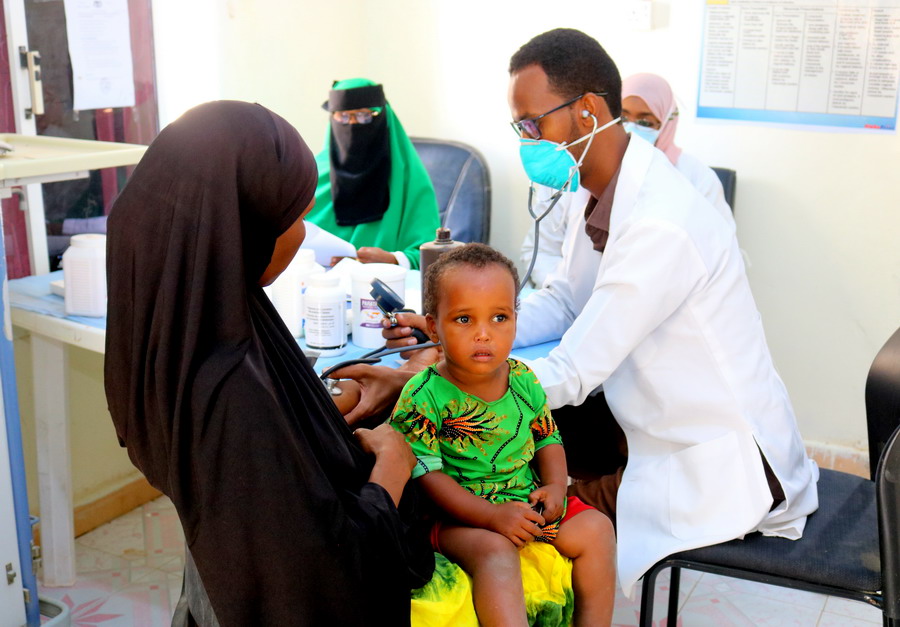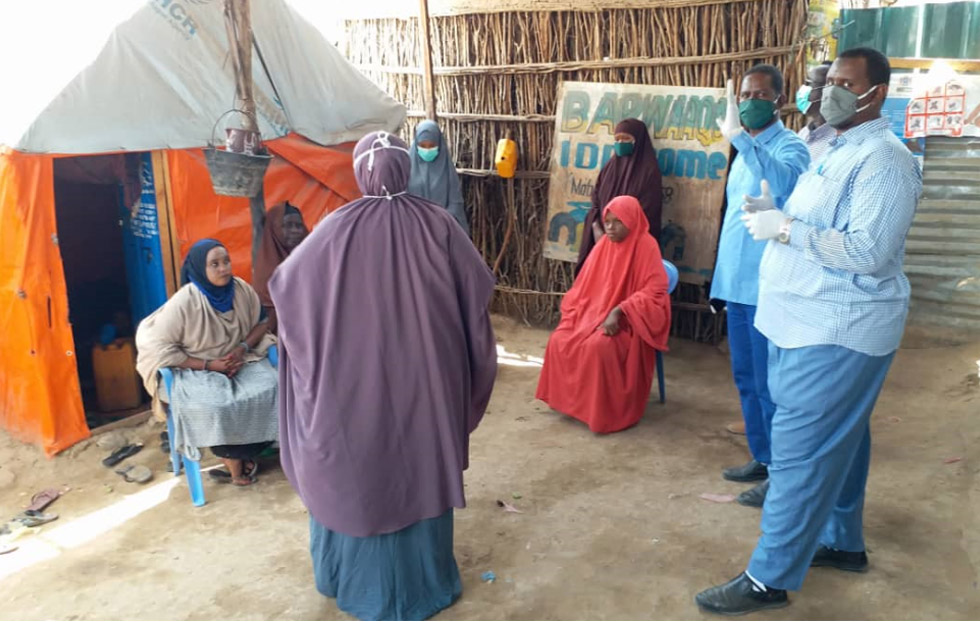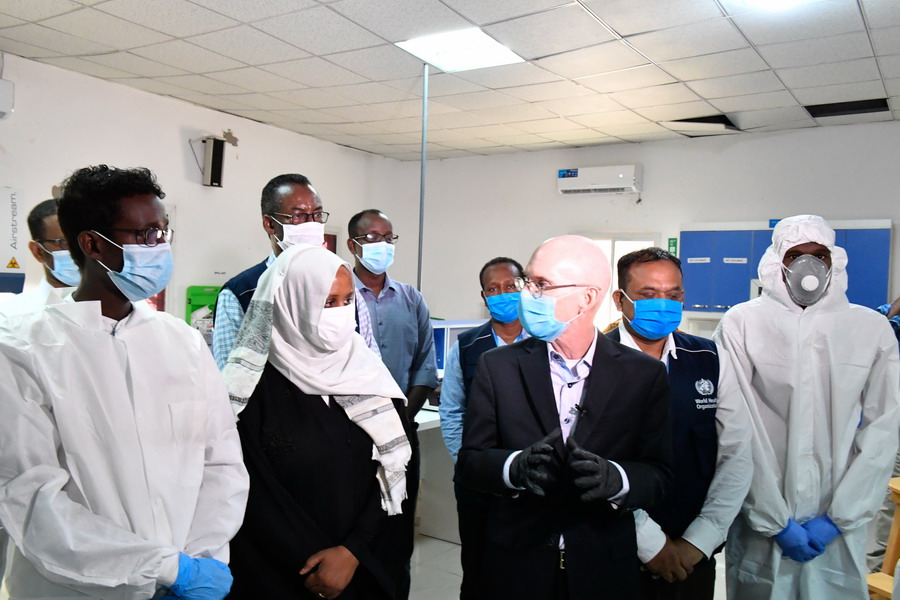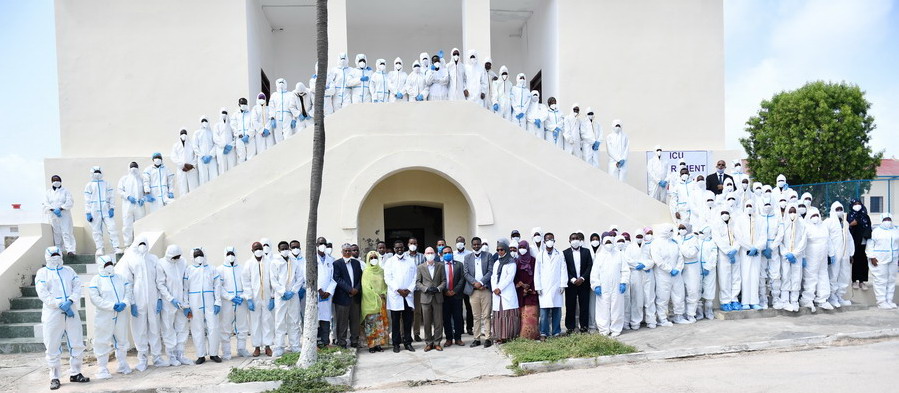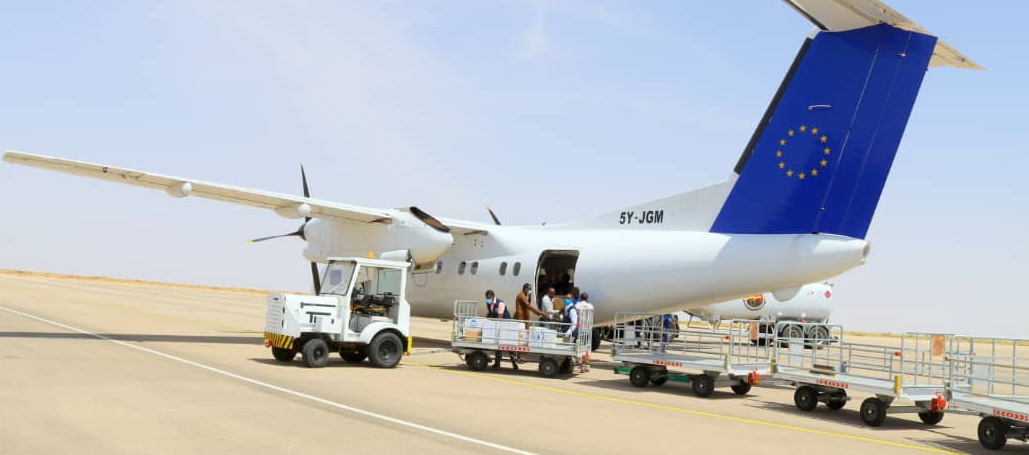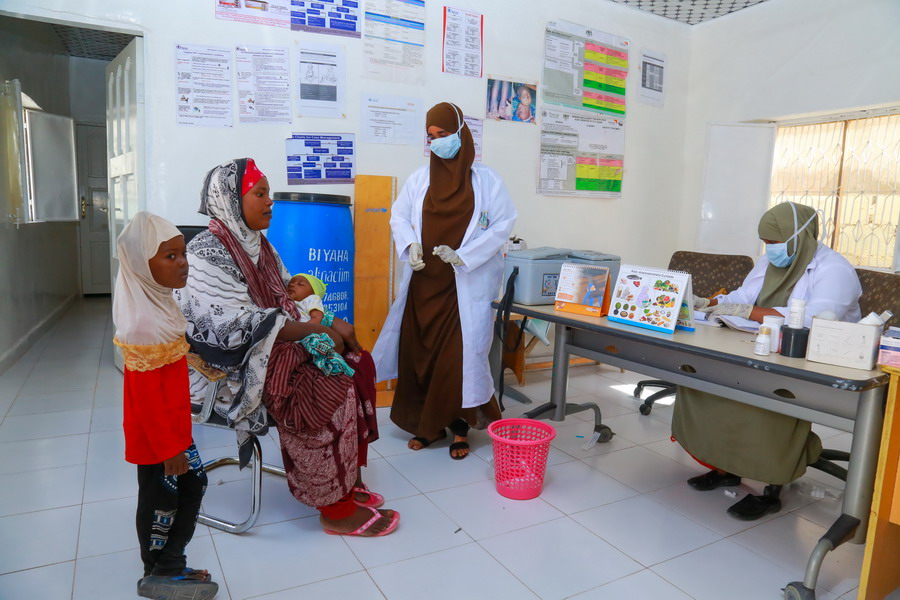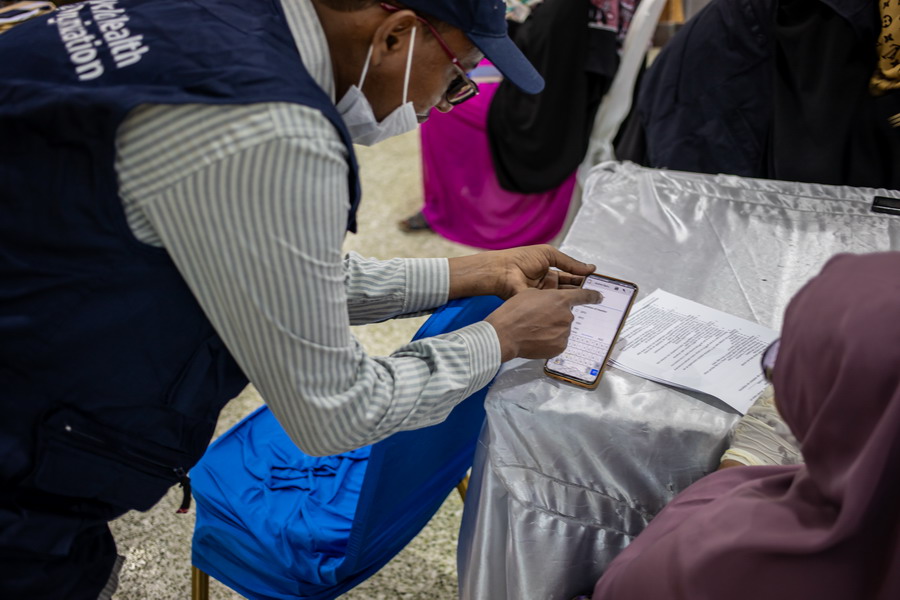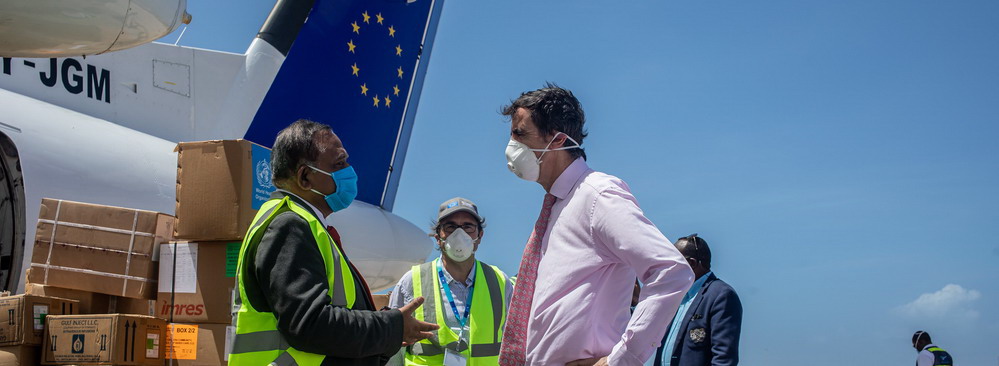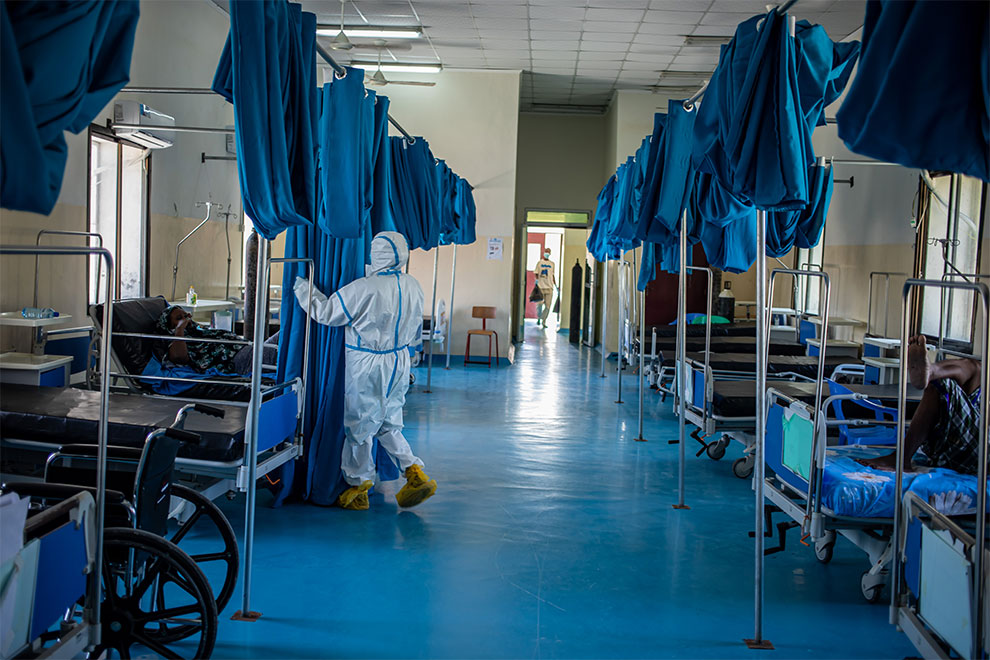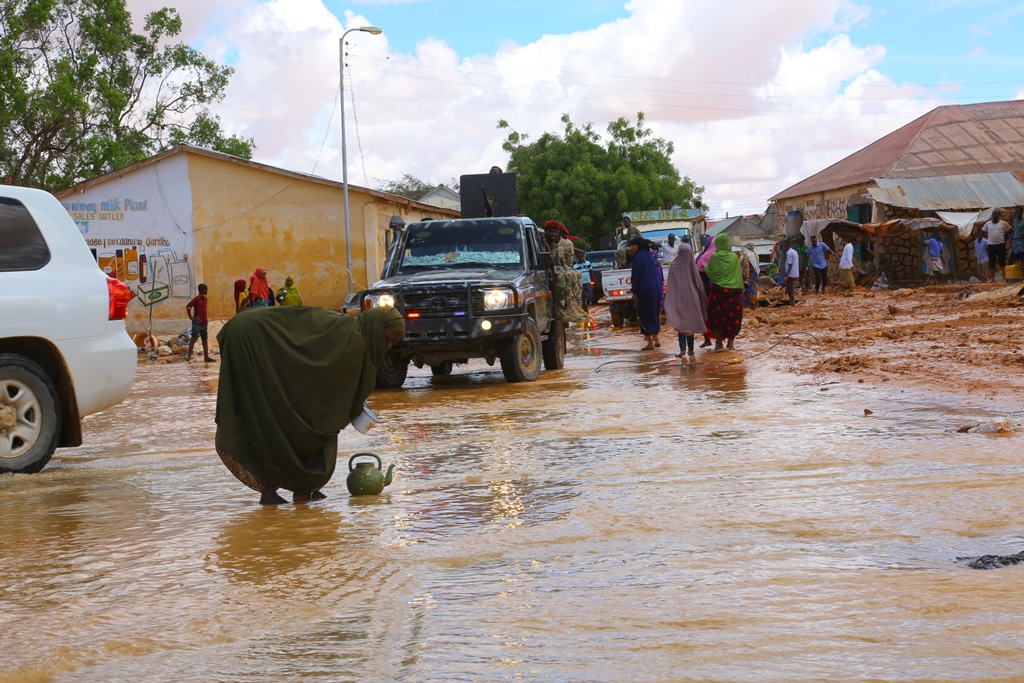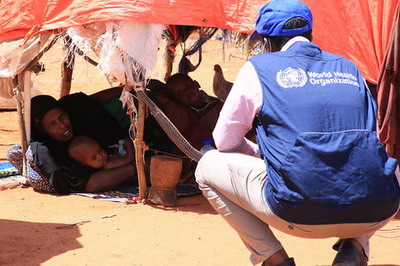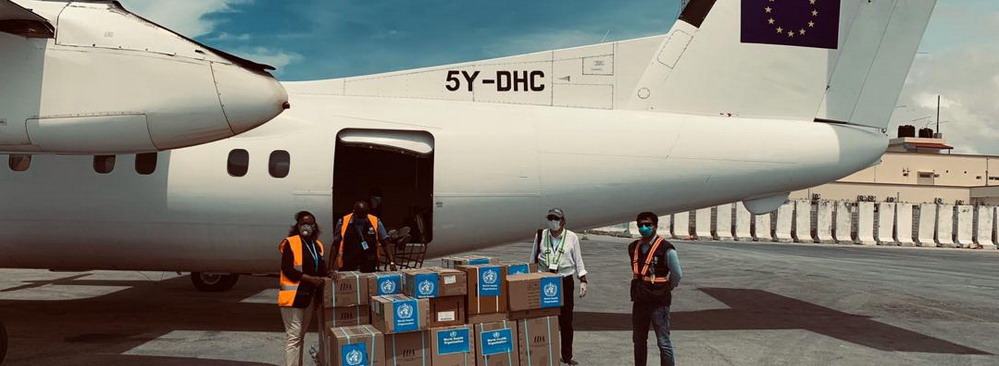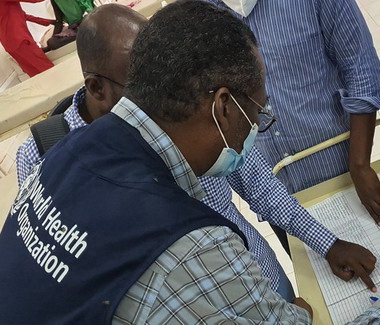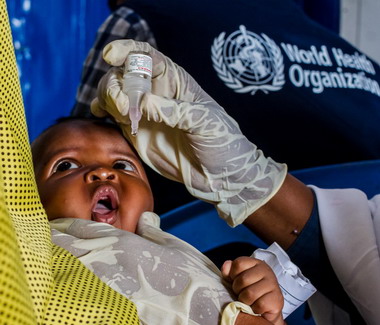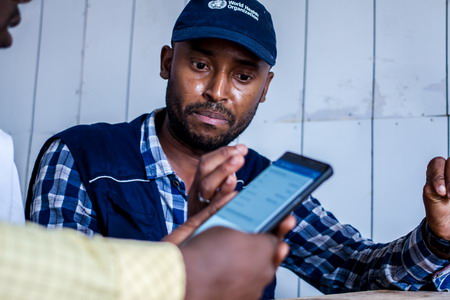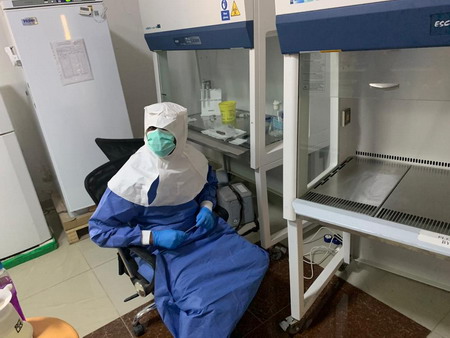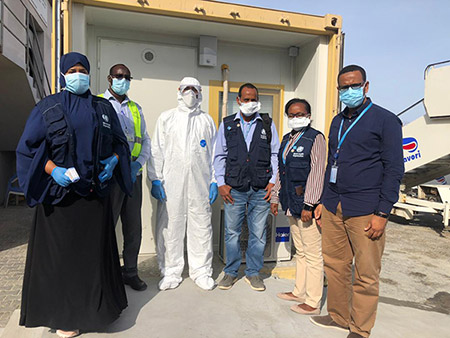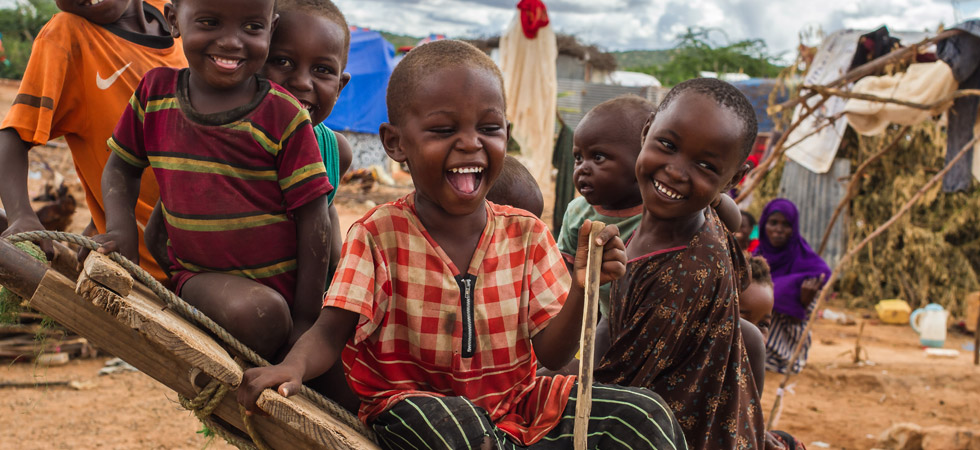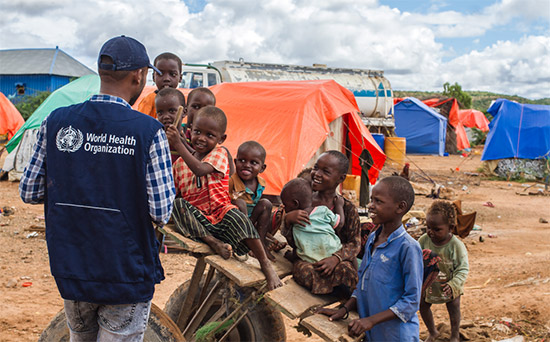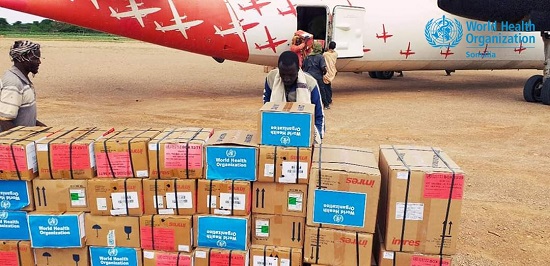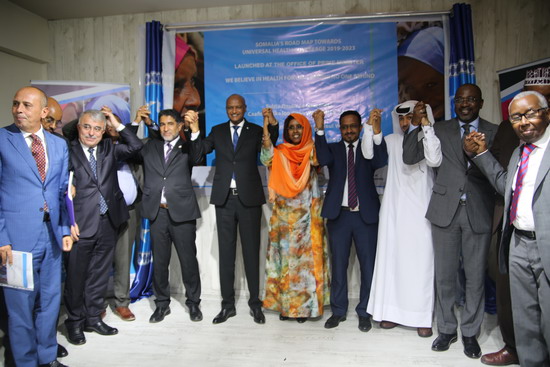02 أيلول/سبتمبر 2025
2 September 2025, Mogadishu, Somalia – More than 1.5 million children under 5 received the novel oral polio vaccine type 2 (nOPV2) in Somaliland and Puntland during the second round of a nationwide vaccination campaign. The campaign – part of Somalia’s ongoing efforts to end polio once and for all – launched on 24 August in Somaliland, where health teams successfully vaccinated 852,000 children – from urban and remote rural communities – with nOPV2. In Puntland, the campaign began on 26 August and protected 676,000 children across all districts, including in...
25 آب/أغسطس 2025
25 August 2025, Mogadishu, Somalia – World Health Organization (WHO) Somalia recently, 20-21 August 2025, completed a lively 2-day professional development training on results-based management (RBM), with a focus on the theory of change (ToC). The sessions aimed to equip technical staff with new skills and tools to plan, monitor, and report on health programmes. WHO staff from various departments across Somaliland gathered for the training which focused on fostering a unified, results-driven approach and enhancing the Organization’s capacity to develop impactful interventions aligned with national goals and WHO’s regional vision. Led...
21 آب/أغسطس 2025
21 August 2025, Mogadishu, Somalia – The World Health Organization (WHO) is working alongside the Somaliland Ministry of Health Development (MoHD) and partners to improve public health services and strategic planning. A key component of the drive is the development of an operational plan for health priorities to guide health development in Somaliland. On 18–19 August 2025, WHO Somalia and MoHD held a high-level meeting in Hargeisa to review Somaliland’s health priorities for 2026–2027. Attended by senior Ministry officials, WHO Somalia technical experts and representatives from the United Nations Children’s Fund...
18 آب/أغسطس 2025
19 August 2025, Mogadishu, Somalia – In Somalia’s under-resourced hospitals, trauma patients often arrive to find blood supply and essential medical equipment shortages, trauma teams with limited capacity and inadequate systems in place for handling a surge in trauma patients. During mass casualty incidents these limitations cause delays that put lives at risk. As violence escalates in parts of Jubaland and Somaliland, Somalia’s emergency health system and first responders face mounting challenges. Health workers, including doctors, nurses, security staff and cleaners, regularly operate under high pressure. They must make critical decisions...
03 آب/أغسطس 2025
3 August 2025, Mogadishu, Somalia – Somalia joins the rest of the world in marking World Breastfeeding Week, held annually from 1–7 August. This year’s theme, Prioritize Breastfeeding: Create Sustainable Support Systems, recognizes the barriers that breastfeeding mothers face – inadequate support, misinformation and systemic challenges that include a lack of paid time off from work to breastfeed, of parental leave after the baby is born, and inadequate protection from marketing of breastmilk substitutes – and calls on the government, the health system, workplaces and communities to build enduring, equitable frameworks...
15 تموز/يوليو 2025
15 July 2025, Mogadishu, Somalia – The annual World Health Organization (WHO)/United Nations Children’s Fund (UNICEF) Estimates of National Immunization Coverage (WUENIC) released today reports that 70% of children in Somalia are fully vaccinated, an increase of 28% between 2012 to 2024, with steady improvements registered across all antigens since 2019. WUENIC presents country level immunization datasets on key infant and childhood vaccinations, allowing the identification of areas where progress has been made, where opportunities remain and where immunization coverage has declined. Somalia has invested heavily in upping coverage rates. In 2024,...
30 حزيران/يونيو 2025
30 June 2025, Mogadishu, Somalia – Mothers visited the Hamar Jajab Maternal and Child Health Centre in Banadir region on a hot morning in May, babies cradled in one arm, toddlers clinging to the other, to join the queues of caregivers waiting under the shade of a big tree inside the facility, all hoping to get their children vaccinated. The Centre is among 8653 fixed sites that co-delivered measles, pneumococcal conjugate vaccine (PCV) and polio vaccines as part of the first integrated campaign of its kind to protect Somali children from...
12 أيار/مايو 2025
12 May 2025, Mogadishu, Somalia – As the world marks Immunization Week 2025, a powerful story of innovation and impact is emerging from Somalia’s coastal city of Berbera. Once affected by frequent power outages that jeopardized the delivery of essential health services, Berbera’s hospitals are now running around the clock thanks to newly installed solar battery systems supported by the King Salman Humanitarian Aid and Relief Centre (KSrelief) and WHO Somalia. The shift to solar energy is doing more than keeping the lights on; it is energizing the city’s health system...
01 أيار/مايو 2025
1 May 2025, Mogadishu, Somalia – This week, the Federal Government of Somalia, in collaboration with WHO Somalia, the United Nations Children’s Fund (UNICEF), Gavi and other partners, joined hundreds of countries worldwide to mark World Immunization Week under the theme “Immunization for All is Humanly Possible”. The commemoration occurred as Somalia is making significant strides in immunization efforts with the recent introduction of two lifesaving vaccines, the pneumococcal conjugate vaccine (PCV) and the rotavirus vaccine, vital in protecting Somali children against pneumonia and diarrhoea, major causes of child mortality. Somalia...
23 نيسان/أبريل 2025
23 April 2025, Mogadishu, Somalia – The Federal Republic of Somalia has introduced 2 lifesaving vaccines into its national immunization programme – pneumococcal conjugate vaccine (PCV) and rotavirus vaccine – aimed at preventing pneumonia and diarrhoea in children. The country has also launched a nationwide measles catch-up campaign to combat one of the leading killers of children in the country. This integrated effort marks a major milestone in Somalia’s journey to reduce the prevalence of measles, pneumonia and rotavirus-related diarrhoea, 3 of the most prevalent causes of disease and death in...
07 نيسان/أبريل 2025
7 April 2025, Mogadishu, Somalia – World Health Day, observed annually on 7 April, marks the anniversary of WHO’s founding in 1948. Each year, the day highlights a pressing health issue affecting populations around the globe. Healthy beginnings, hopeful futures, the World Health Organization’s (WHO) official theme for World Health Day 2025, focuses on improving maternal and newborn health and survival and addressing the urgent need for action to reduce maternal and neonatal mortality rates worldwide. This World Health Day, WHO, in partnership with the United Nations Population Fund (UNFPA) and the...
06 آذار/مارس 2025
6 March 2025 – With support from the Italian Agency for Development Cooperation, WHO has collaborated with the Federal and State Ministries of Health in Somalia to transform Hudur Hospital into a resilient, up-to-date facility powered by a solar energy system, which can provide quality, reliable health services to those in need.
27 شباط/فبراير 2025
27 February 2025, Mogadishu, Somalia – On 13 February 2025, vaccination activities were launched in 4 districts of northern Somalia’s Sool region – Las Anod, Taleh, Hudun and Buuhoodle district– as part of The Big Catch-up initiative, an extended effort to lift vaccination levels among children to at least pre-COVID 19 pandemic levels. In Somalia, The Big Catch-up began in July 2024. Launched by the Ministry of Health, with the support of the World Health Organization (WHO), Gavi, the Vaccine Alliance and the United Nations Children’s Fund (UNICEF), it targets the...
16 شباط/فبراير 2025
16 February 2025, Mogadishu, Somalia – Today Somalia launched a 4-day nationwide polio vaccination campaign targeting 2.5 million children under the age of 5 in the consequential states, Juballand, Hirshabelle, Southwest, Galmudug and Banadir Regional Administration in Somalia. Led by the Federal Ministry of Health and Human Services, with support from the World Health Organization (WHO), UNICEF and the Global Polio Eradication Initiative, the campaign aims to stop the transmission of circulating variant type 2 poliovirus which has been in circulation in Somalia since 2017. Somalia is one of the 7 “consequential...
06 شباط/فبراير 2025
Somali mothers travel long distances to protect their children from outbreaks 6 February 2025 – Mothers play a critical role in keeping their children safe from diseases outbreaks, especially when it comes to vaccine-preventable diseases. In Somalia, where life can be tough, mothers have always worked hard to protect their families. This is even more challenging for those living in remote areas with little access to health care. Determined to get their children vaccinated, many mothers travel long distances to reach cities where immunization services are available. Layla Ali Nur, a 20-year-old mother and...
02 شباط/فبراير 2025
2 February 2025 – At 65, Ahmed Moalim Hirsi reflects on a lifetime of service dedicated to improving the health of people in Somalia. After 26 years as a polio eradicator with WHO Somalia, Ahmed retired in 2024, after a career characterized by resilience, dedication and impact. Ahmed’s journey with WHO began in April 1998 in Bosaso, a city on Somalia’s north-east coast, during a time of immense humanitarian challenges for the country brought on by ongoing conflict and recurring droughts. A graduate of the Mogadishu Nursing School, gaining a diploma in nursing,...
26 كانون2/يناير 2025
26 January 2025 – At the heart of Al-Adalada camp, west of Somalia’s capital Mogadishu, 49-year-old Hawa Sharif Ali has found a vital lifeline for her family’s medical needs. She, like the thousands of other internally displaced people (IDPs) living in the camp, depends on the health services available at the Sinkadheer health centre in the Garasbaley district. The mother of six supports her family by doing laundry in nearby neighbourhoods, including Garasbaley. Life has been a constant struggle for Hawa, made harder by the drought the country experienced in 2022/23 –...
22 كانون2/يناير 2025
About 40% of the deaths were of young children. 22 January 2025, Mogadishu, Somalia – A study released today by the Somali Federal Ministry of Health, UNICEF and WHO estimates that 71 100 people may have died between January 2022 and June 2024 because of the drought that ravaged large parts of Somalia in 2022. About 40% of these deaths were estimated among children under the age of 5. The report, From insight to action: an update on mortality patterns in Somalia, was released today in Mogadishu by Minister of Health Dr...
04 كانون1/ديسمبر 2024
On 27th November 2024, Mogadishu, Somalia – For the first time ever, Somalia has celebrated World Food Safety Day (WFSD) in collaboration with World Health Organization (WHO) Somalia and the Somali Bureau of Standards. A forum held in Mogadishu brought together government officials, international partners, private sector actors and representatives from academia to discuss food safety in Somalia under the theme of this year’s WFSD – Food Safety: prepare for the unexpected. The food situation in Somalia is precarious. There is heavy reliance on imported – often unregulated – products, and a...
04 تشرين2/نوفمبر 2024
4 November 2024, Mogadishu, Somalia – Since the early 1990s, Somalia has suffered multiple outbreaks of cholera which, due to poor sanitary conditions, have affected a majority of the population living in internally displaced camps. The latest outbreak occurred early in 2024 in the capital Mogadishu, with the districts of Dayniile, Dharkaynley, Wadajir, Kahda and Hamar Jajab particularly badly affected. In response, the Federal Ministry of Health and Human Services and the Banadir Health Administration, with the support of WHO, UNICEF and other partners, promptly embarked on a door-to-door cholera vaccination...
27 تشرين1/أكتوير 2024
27 October, Mogadishu, Somalia – In Mogadishu, one of the few cities in the world where the threat of polio persists, Hani Jilaow Mohamed, a dedicated polio vaccinator, has been working on the front lines of public health since 2005. Hani’s blend of skill and courage has made her a pivotal figure in the ongoing fight against the disease. The 36-year-old mother of 6 is one of thousands of health workers who vaccinate children against polio and other infectious diseases. Before Hani embarked on a career in public health, she and her family...
24 تشرين1/أكتوير 2024
24 October 2024, Somalia – This World Polio Day, the Government of Somalia, the World Health Organization (WHO) and the United Nations Children’s Fund (UNICEF) join in reaffirming their commitment to safeguard every child against polio. Since the launch of the Global Polio Eradication Initiative (GPEI) in 1988, the incidence of polio has plummeted by 99 per cent thanks to the widespread use of vaccines. Engagement by Somalia's Federal Ministry of Health, state leaders, communities, parents and caregivers, and the support of health care workers, has been vital to the success...
21 تشرين1/أكتوير 2024
22 October 2024, Mogadishu, Somalia – In 2023, the WHO Country Office in Somalia and the Kingdom of Saudi Arabia launched Every Breath Counts, a collaborative initiative aimed at improving health service delivery for children suffering from pneumonia and diarrhoea, the two biggest health threats faced by children in Somalia. With a financial contribution of US$ 2 million from the King Salman Humanitarian Aid and Relief Centre, the project focused on equipping health facilities with solar power and oxygen supplies, biomedical equipment and essential medicines. The solarization of 26 health facilities...
31 تموز/يوليو 2024
Polio champion Maryan Jama Du’ale retires after 2.5 decades 31 July 2024 – In April 1998, certified nurse and public health officer Maryan Jama Du’ale was invited to a workshop to get familiar with a new initiative: the National Polio Eradication Programme. She made an impression at the event, which was hosted by WHO and the health ministry of the self-declared administration of Somaliland. Within a few weeks, Maryan joined the programme as a district polio officer in Hargeisa, Somaliland. Her role included setting up surveillance sites to search for poliovirus in...
16 تموز/يوليو 2024
16 July 2024 – Since COVID-19 was first detected in Somalia in March 2020, the country has made remarkable progress in limiting its spread and rolling out COVID-19 vaccination. Thanks to support from partners including WHO Somalia, almost 50% of Somalia’s population is fully vaccinated against COVID-19, as at 30 March 2024. But more must be done to protect Somalia from COVID-19 and to leverage the existing gains to strengthen immunization and the health system more broadly. One such initiative is the Somalia COVID-19 Emergency Vaccination Project, which has been central to the...
03 تموز/يوليو 2024
3 July 2024, Mogadishu, Somalia – Ms Fatima Abdirazak Ahmed joined WHO in Somalia at the beginning of 2024 as a subnational Health Cluster coordinator in Hirshabelle state. Having just finished a meeting with 15 Health Cluster partners, she heads to the office of Hirshabelle State Ministry of Health. Here, she will brief and discuss with the Director-General the ongoing efforts of the Health Cluster to reach vulnerable and underserved communities with health services during the measles and cholera outbreaks across the state. Health Cluster partners thus play a crucial role in the...
01 تموز/يوليو 2024
MOGADISHU, Somalia, 30th June 2024 – In a landmark step to accelerate progress towards ending polio in Somalia and accelerating immunization coverage, the Prime Minister of Somalia, His Excellency Hamza Abdi Barre, on 29th June launched a national task force on immunization and polio and a child survival forum. The Somalia Immunization and Polio Eradication Task Force (SIPE), which the Prime Minister himself will chair, will oversee polio eradication and immunization efforts across the country, mobilize financial to ensure that every child in Somalia is reached with lifesaving vaccines. The task...
12 حزيران/يونيو 2024
12 June 2024, Mogadishu, Somalia – A critical project led by the WHO Country Office in Somalia aims to reach nearly 900 000 people with life-saving interventions over the course of 2024. The project targeting people in Somalia who are still living with the impacts of extreme climate events is supported by the Government of Japan with a generous grant of over US$ 700 000. This new project follows the completion of an earlier project that benefited over 3 million people affected by drought and floods in Somalia with integrated health and nutrition services....
11 حزيران/يونيو 2024
11 June 2024, Somalia – Amid the complex humanitarian emergency that is ongoing in Somalia, the population is highly vulnerable to disease outbreaks. In such a situation, early detection of disease outbreaks is crucial for an appropriate public health response and interventions. Somalia has been successfully strengthening its multi-disease surveillance system by implementing the Integrated Disease Surveillance and Response (IDSR) system. These efforts have been made in collaboration with the WHO Regional Office for the Eastern Mediterranean and the WHO Country Office in Somalia. IDSR improves the efficiency and effectiveness of health information...
11 حزيران/يونيو 2024
11 June 2024, Mogadishu, Somalia – Abdia Adan returns to Garasbaley Health Centre, in the heart of Kahda district, Banadir Region, for her 8-month-old son’s final follow-up at the facility. This visit proves different from her previous encounters as young Mohamed Hussein is now healthier. Abdia visited the health centre with Mohamed in November 2023 when he had a fever and was vomiting. His condition has significantly improved since the doctors diagnosed him with pneumonia and malnutrition, thanks to Abdia’s love and the attentive quality medical care received at the...
13 أيار/مايو 2024
1 May 2024, Mogadishu, Somalia – A 12-month project led by the WHO Country Office in Somalia over the course of 2023 reached 3 137 217 people affected by drought or flood. The project was made possible thanks to the generous support of the Government of Japan. Initially intended to address drought, Japan’s support swiftly adapted to the evolving situation in Somalia. Starting in October 2023, the country was hit by El Niño-related heavy rainfall. This resulted in severe flooding that affected more than 2.4 million people and led to the...
30 نيسان/أبريل 2024
29 April 2024, Mogadishu, Somalia – While marking World Immunization Week this year, Somalia’s Federal Ministry of Health, the World Health Organization (WHO) and the United Nations Children’s Fund (UNICEF) have jointly urged partners and donors to accelerate immunization efforts to reach every child in Somalia. This year’s World Immunization Week coincides with the 50th anniversary of the global Essential Programme on Immunization and aims to spur greater engagement around immunization, to reiterate the importance of vaccination and improve the health and well-being of every child, everywhere. This year’s commemoration highlighted...
25 نيسان/أبريل 2024
25 April 2024, Mogadishu, Somalia – Somalia managed to reduce the prevalence rate of malaria from 20.1% in 2015 to 4.1% in 2023 in the most affected areas by adopting an integrated disease response. The Federal Ministry of Health in Somalia led this work, with technical support from WHO and the United Nations Children’s Fund (UNICEF) and financial support from the Global Fund. Applying prevention, interruption and supplementary measures, Somalia’s malaria programme reduced disease incidence to as low as 3.4% in 2022, as documented by the country’s National Malaria Control Programme....
21 نيسان/أبريل 2024
18 April 2024, Mogadishu, Somalia – Biomedical equipment and essential medicines are to reach 28 health facilities across Somalia thanks to the “Every Breath Counts” project, funded by the King Salman Humanitarian Aid and Relief Centre (KS Relief). The Federal Ministry of Health kicked off the distribution of the supplies in collaboration with the WHO Country Office in Somalia. The project supports quality emergency care of severe cases of pneumonia and diarrhoea for children. A child born in Somalia today is almost 20 times more likely to die by the age...
16 نيسان/أبريل 2024
Partners commit to take bold steps to boost routine immunization and child health in Somalia 16 April 2024, Mogadishu, Somalia – Somalia’s Minister of Health and Human Services His Excellency Dr Ali Haji Adam and high-level representatives of the Global Polio Eradication Initiative met virtually yesterday to review progress and further scale up efforts to end the country’s 7-year variant poliovirus outbreak. H.E. Dr Adam presented the Somalia Emergency Action Plan (SEAP) 3, which builds on measures taken so far and will fill existing gaps in polio eradication efforts. The plan prioritizes...
24 آذار/مارس 2024
24 March 2024, Mogadishu, Somalia – WHO Somalia, in collaboration with the Federal Ministry of Health and Human Services, marks World Tuberculosis Day 2024 with a renewed commitment to end the tuberculosis (TB) epidemic. Under the theme “Yes! We can end TB!”, WHO aims to inspire hope and promote high-level leadership, increased investments, faster uptake of new WHO recommendations and innovations, and multisectoral collaboration to combat TB. “Somalia’s TB programme has weathered recurring climatic shocks, insecurity and the COVID-19 pandemic to show an 87% treatment success rate, 14% decrease in TB...
18 آذار/مارس 2024
18 March, 2024 - Mogadishu, Somalia - The United Nations Population Fund (UNFPA) and the World Health Organization (WHO), with funding from the European Civil Protection and Humanitarian Aid Operations (EU ECHO), have supported the Federal and State Ministries of Health to provide lifesaving health supplies and services to over 5 million people across drought-affected areas of Banadir, South West, Jubbaland and Galmudug states in Somalia. The 24-month ECHO-funded project is to increase access to life-saving health and nutrition services for populations within IDP camps and host communities and addressing the...
07 آذار/مارس 2024
8 March 2024, Mogadishu, Somalia – Somalia’s health ministry and WHO observed International Women’s Day 2024 with a resolve to improve life for women in Somalia by empowering the female health workforce. To do so, they will address policy, human resource and operational matters, as well as capacity-building gaps for women in the health sector. “Invest in women: Accelerate progress” is this year’s theme for the global day – and a timely reminder to world leaders to meet the targets of Sustainable Development Goal 3. Dr Naima Abdulkadir, Manager of Reproductive Health at the...
CERF support safeguards lives of 95.9% of children at WHO-Supported stabilization centres in Somalia
14 شباط/فبراير 2024
08 February 2024, Mogadishu, Somalia – The WHO Country Office in Somalia, with timely support from the Central Emergency Response Fund (CERF), has helped to avert major diseases outbreaks after flash flooding caused by El Niño. The floods, which hit the country in November 2023, damaged infrastructure and affected the livelihoods and health of over 1.17 million people across Jubaland and Hirshabelle states. “The floods have swept away everything we had, but thanks to WHO, my 2 children have survived not only droughts and floods but are now recovering from severe malnutrition...
29 كانون2/يناير 2024
29 January 2024, Mogadishu, Somalia – A project to reduce the alarmingly high number of child deaths related to pneumonia and diarrhoea in Somalia has been formally launched by King Salman Humanitarian Aid and Relief Centre (KSrelief) and WHO. The Every Breath Counts project aims to increase access to medical oxygen, set up mother and child health care, establish oral rehydration centres and provide integrated health facilities in the fragile humanitarian setting of Somalia. Child mortality from all causes in Somalia is among the highest in the world. A child born...
22 كانون2/يناير 2024
16 January 2024, Mogadishu, Somalia – An electronic immunization registry is set to help increase and streamline immunization coverage in Somalia, with a special focus on children who are new to immunization, defaulters, zero-dose status or underimmunized. WHO Somalia, in collaboration with the United States Agency for International Development, has supported the Federal Ministry of Health to develop and launch the digital platform. The immunization registry consists of tools that can be used to help monitor individual immunization schedules and store individual immunization histories. As such, using the platform and its...
19 كانون1/ديسمبر 2023
18 December 2023, Mogadishu, Somalia – The WHO country office for Somalia, along with the Federal Ministry of Health, and the United States Agency for International Development’s (USAID) Bureau of Humanitarian Assistance (BHA), convened a meeting to review the progress achieved through a collaborative project for scaling up the health response to drought in Somalia. This project is being implemented by the Ministry of Health with the technical support of WHO Somalia and is being funded by USAID’s BHA with a US$ 2 million contribution. The project is instrumental in strengthening...
12 كانون1/ديسمبر 2023
08 December 2023, Hargeisa, Somalia – Nearly half of the deaths and one-third of disabilities in fragile settings like Somalia are estimated to result from conditions that timely emergency care could prevent. To address this critical need, the WHO country office in Somalia with support from the King Salman Humanitarian Aid and Relief Centre (KSrelief), has helped the Ministry of Health Development in Somaliland to train 28 health professionals on basic emergency care (BEC). WHO, in collaboration with its partners and the International Federation for Emergency Medicine, has developed the BEC...
11 كانون1/ديسمبر 2023
4 December 2023, Mogadishu, Somalia – Over 7 million people in Somalia have gained access to improved health and nutrition services since November 2022, thanks to a collaborative effort between the World Health Organization (WHO) and the Government of Germany. The German funding has enabled WHO to support the federal and state ministries of health to reach 65–70% of people living in the country’s 74 drought-affected districts, through 281 health facilities. This support has also helped WHO Somalia to strengthen community- and facility-based disease surveillance systems by deploying 2195 vaccinators and...
23 تشرين2/نوفمبر 2023
15 November 2023, Mogadishu, Somalia – Malnutrition affects communities far and wide, weaving its way through many lives, often with devastating results. The problem is painfully evident in Somalia, a nation grappling with recurrent droughts, conflicts, and disease outbreaks, primarily in its southern regions. These emergencies have worsened malnutrition, which was already at dire levels, leading to an alarming rise in disease, death, disability, and prolonged suffering, especially among children under five years of age. Meet Maryama1, a mother of 9 children, whose life took a devastating turn when she lost...
22 تشرين2/نوفمبر 2023
22 November 2023, Mogadishu, Somalia – Amid the severe drought crisis in Somalia, Sarbina Ali, a community health worker is bringing hope to internally displaced people seeking refuge in the Daynile district. With the support of WHO and its drought response team, Ali works tirelessly to provide community-level health services and mobilize the affected community to practise healthy living. Daynile, in the north of the Banadir region, has become a haven for internally displaced people due to its ease of access from Afgoye and Balcad, where conflict and drought have displaced...
22 تشرين2/نوفمبر 2023
13 November 2023, Arabsiyo, Somalia – Hawa, a resilient mother of 5 young children, has experienced the challenges and joys of motherhood in Somaliland (1). Her journey took a heartbreaking turn when her new baby had a low birth weight and later died of pneumonia, a prevalent and deadly illness in Somalia. About 12.8% of newborns in Somalia are born with low birth weight, and pneumonia is a leading cause of death for children aged under 5 years, accounting for 21% of all deaths in this age group – or 39.5...
19 تشرين1/أكتوير 2023
19 October 2023, Mogadishu, Somalia – High-level political support to stop poliomyelitis, boost immunity to other vaccine-preventable diseases and strengthen health systems in Somalia has been renewed and reinforced. This follows a series of meetings between the Prime Minister of the Federal Government of Somalia, His Excellency Mr Hamza Abdi Barre; representatives of the World Health Organization (WHO), United Nations Children’s Fund (UNICEF) and United Nations Population Fund (UNFPA); and a delegation from the Bill & Melinda Gates Foundation led by Dr Chris Elias, President of the Global Development Division....
09 تشرين1/أكتوير 2023
10 October 2023, Mogadishu, Somalia – The World Health Organization (WHO) Somalia Country Office is supporting the Federal Ministry of Health and Human Services to observe the World Mental Health Day 2023. This year’s theme- w “Mental health is a universal human right” is a stark reminder that in a country frequently affected by conflict and crisis and having a high burden of mental health disorder, everyone, everywhere suffering from mental health illness has the right to seek and receive quality mental health care. Multiple events are being run in...
29 أيلول/سبتمبر 2023
29 September 2023, Mogadishu, Somalia – The Federal Government of Somalia, through its Federal Ministry of Health and Human Services, has launched a new project that aims to strengthen the medical emergency services at federal and state referral hospitals. Critical care capacities will be a particular focus.The US$ 11.4 million project is funded by the World Bank under the Somalia Crisis Recovery Project (SCRP). The World Health Organization (WHO) will support the delivery of the ‘Strengthening the Medical Emergency Services at Federal and State Referral Hospitals’ project. This collaborative initiative comes...
09 أيلول/سبتمبر 2023
Mogadishu, 9 September 2023 – Nearly 47% of the eligible Somali population (1) are now fully vaccinated against COVID-19, thanks to the successful collaboration between the World Health Organization (WHO), Federal Government of Somalia and the United States Agency for International Development (USAID) under the COVID-19 response in Somalia project. This project was implemented from July 2022 to July 2023, by the Somali Federal and state-level ministries of health with the technical support of WHO and USAID and aimed to strengthen health care systems and train community health care workers as part...
20 آب/أغسطس 2023
This occasion commemorates the day in 2003 when 22 of the United Nations colleagues lost their lives in an attack on the United Nations compound in Baghdad, Iraq. Since then, the humanitarian community across the world has been remembering the fallen heroes and showing their unwavering commitment to meeting the needs of the most under-served and marginalized communities during conflicts, climatic shocks and health emergencies. With over half the population of Somalia (8.3 million people) in need of humanitarian assistance[1] and approximately 6.6 million people facing acute food insecurity[2], reaching out...
13 آب/أغسطس 2023
Mogadishu, 13 August 2023 – A single dose reactive cholera vaccination campaign gets under way in 5 districts of Jubaland State, bordering Kenya and Ethiopia, classified as the Mandela triangle, from 12 to 16 August, 2023. The campaign aims to vaccinate 590 803 people aged one year and above, including pregnant women in Afmadow, Belet Xaawo, Luuq, Doolow, Dhobley districts. The oral cholera vaccination campaign will be synchronized among border communities with Ethiopia and Kenya. The 5-day house-to-house campaign will be implemented by 788 vaccination teams each composed of 2 vaccinators,...
03 آب/أغسطس 2023
Mogadishu 4 August 2023 – The Federal Ministry of Health and the World Health Organization (WHO) Somalia country office join the international community and partners in commemorating World Breastfeeding Week, which is held annually from 1 to 7 August to highlight the importance of breastfeeding for both mothers and children. This year's theme, "Let’s make breastfeeding and work, work," focuses on workplace barriers that prevent women from breastfeeding or cause them to stop breastfeeding earlier than recommended. The Federal Ministry of Health and WHO country office are urging all partners to work...
26 تموز/يوليو 2023
Mogadishu, 28 July 2023: The Federal Ministry of Health and the World Health Organization (WHO) country office in Somalia join together in commemorating World Hepatitis Day to increase awareness and understanding of viral hepatitis. This year, the hepatitis campaign will be under the slogan of “One Life, One Liver” emphasizing the link between viral hepatitis infection and liver inflammation. In the WHO Eastern Mediterranean Region, a regional slogan, “Hepatitis medicines are cheaper now. Treat to save lives”, is also being used to highlight efforts to accelerate the elimination of hepatitis by ensuring...
18 تموز/يوليو 2023
18 July 2023 – On a March day in the village of Burhakaba, Somalia, two-year-old Turki Abdinor Osman’s family didn’t find it unusual when he developed a fever and started to vomit. But soon afterwards, the toddler developed weakness in his left leg – an indicator of acute flaccid paralysis (AFP), the most common symptom of poliovirus infection. The family notified health workers in their village, who collected stool samples from the boy and, soon afterwards, confirmed the diagnosis: Turki had been infected by poliovirus. His family was stunned and...
18 حزيران/يونيو 2023
19 June 2023 – Since 2015, every year the International Day for the Elimination of Sexual Violence in Conflict is commemorated on 19 June. The date chosen marks the adoption of the 2008 Security Council resolution condemning sexual violence as a “tactic of war and an impediment to peacebuilding.” Each year, the United Nations and other partners seek to raise awareness of conflict-related sexual violence and the need to end it, to honour the victims and survivors around the world, and to recognize those who have dedicated their lives to its...
23 أيار/مايو 2023
Suspected cholera cases surge in Somalia as conflict and a multi-season drought displace more than 1.4 million people, many into camps lacking access to safe water and sanitation BAIDOA, 17 May 2023 – Stretched out on a cholera cot, 3-year-old Somow defaecates directly into a bucket through a hole in a thin mattress. Since drinking contaminated water, he has been wracked by vomiting and violent episodes of watery diarrhoea. “He fell ill earlier, and then it came back, that’s when I decided to seek treatment,” his mother, Nuney Ibrahim Yusuf explains, brushing...
05 أيار/مايو 2023
Mogadishu 5 May 2023 – The World Health Organization (WHO) Country Office in Somalia and the Federal Ministry of Health have come together on the International Day of the Midwife to recognize the essential role of midwives in delivering quality health care services and reducing preventable maternal and neonatal morbidity and mortality. Befitting to this year's International Day of Midwife theme of "Together Again: From Evidence to Reality”, WHO Is supporting the Ministry of Health to launch a standardized national basic emergency obstetric and newborn care (BEmONC) training programme across the...
24 نيسان/أبريل 2023
Significant progress has been made in malaria control in Somalia, with substantial decreases in transmission since 2019, thanks to scaled up interventions. Additionally, the impact of the drought in Somalia has contributed to reducing malaria transmission across the country, including in previously high and moderate transmission areas along the Shabelle and Jubba Rivers. Despite a high risk of epidemics in northern regions, malaria infections in the community remain low and much of the country is suitable for elimination efforts. Throughout Somalia, the malaria species Plasmodium falciparum has been the predominant cause...
23 نيسان/أبريل 2023
Mogadishu, 24 April 2023 – The Federal Ministry of Health, in collaboration with the World Health Organization (WHO) and the United Nations Children’s Fund (UNICEF), observed World Immunization Week under the global theme of “The Big Catch-Up” with a resolve to strengthen primary health care and routine immunization across the country and ensure that no one is left behind. World Immunization Week 2023 is being observed during the global COVID-19 pandemic and hence it has been given the theme of ‘The Big Catch-Up’. World Immunization Week was initially endorsed in May 2012...
16 نيسان/أبريل 2023
Mogadishu, 15 April 2023 – The World Health Organization (WHO) Somalia with the timely support of United Stated Agency for International Development (USAID) is helping the Ministry of Health to strengthen and expand the community-based surveillance system in underserved areas, which is essentially addressing the health system gaps and bridging a vital clog between these communities and health system. Community health workers are being effectively used in crisis affected countries to bridge the health system gaps for surveillance when there is an acute shortage of health care workers. Learning from its...
03 نيسان/أبريل 2023
As drought stretches into a sixth season, WHO outreach teams target unvaccinated children reaching displacement camps where measles and pneumonia are rife. 3 April 2023 – Baidoa, Somalia – Somali farmer Fadumo Mohamed Ibrahim’s crops failed in the drought and she set out on foot for help. Twenty-five days later, she and her daughter Khaliye stumbled into a settlement in the outskirts of Baidoa, a city in central Somalia, sick and exhausted. “There is no health care in my village, my children have never been vaccinated,” the 30-year-old says. Arriving at the crowded settlement of...
02 نيسان/أبريل 2023
Mogadishu, 2 April 2023 – To ensure sustained and reliable health services in an extremely challenging environment, WHO has used innovation and creativity to help the Federal and State ministries of health establish an operational medical supply chain for serving the most vulnerable and disadvantaged populations across the country. WHO has managed to airlift, transport and stock over 1400 tonnes of medical commodities, worth around US$ 5 million during the past year to support essential health and nutrition care to the vulnerable population in the midst of extreme drought and food insecurity, which...
20 آذار/مارس 2023
Half of the drought-related deaths occurred among children under the age of 5 Mogadishu, 20 March 2023 – A new report released today by the Federal Ministry of Health & Human Services, WHO and UNICEF suggests that an estimated 43 000 excess deaths may have occurred in 2022 in Somalia due to the deepening drought, a figure higher than that of the first year of the 2017–2018 drought crisis. Half of these deaths may have occurred among children under the age of 5. The findings of the report were released today by...
18 آذار/مارس 2023
Mogadishu, 20 March 2023 – Since 2013, the 20 March has been commemorated as the International Day of Happiness. The day provides an occasion to recognize and reflect on the importance of happiness in the lives of people around the world. Numerous studies show correlation between mental health, happiness and quality of life and yet, mental health is often neglected in health programming, particularly in fragile contexts like Somalia. Yet, it is in these contexts that mental health and psychosocial support (MHPSS) is particularly needed. Having faced decades of conflict, displacement,...
14 آذار/مارس 2023
Riyadh, 14 March 2023Every breath counts: Reducing childhood pneumonia by increasing access to medical oxygen in the fragile humanitarian setting of Somalia This landmark moment highlights the strong humanitarian partnership between KSrelief and WHO to better ensure health for all in vulnerable communities and comes at a particularly important time when Somalia is suffering from one of the worst droughts in its recent history, which has adversely affected 7.8 million people, including 1.1 million who have been displaced (on top of 2.5 million already previously displaced) in search of food, water...
12 آذار/مارس 2023
As part of responding to the twin blasts which rocked the capital city of Somalia in October 2022, WHO deployed this EMT from the United Kingdom, known as UK-Med, which is a frontline medical aid charity borne out of the National Health Services (NHS) of the United Kingdom. The WHO EMT is a global initiative that assists organizations and countries to build capacity and strengthen health systems by coordinating the deployment of qualified medical teams in emergencies. This initiative also helps countries develop national teams, which can be deployed where they...
05 آذار/مارس 2023
Mogadishu, 8 March 2023 The WHO Country Office has been supporting the Ministry of Health in advancing women's rights and the Sustainable Development Goals (SDGs), particularly Goal 3, “to ensure healthy lives and promote well-being for all” and Goal 5, “to achieve gender equality and empower all women and girls.” Appreciating the support provided by WHO Country Office in Somalia, Dr Naima Abdulkadir, Reproductive Health Manager at the Ministry of Health and Human Services, said, “In the given context of Somalia, addressing the gender inequalities remains a big ask for the Ministry....
01 آذار/مارس 2023
WHO utilizes CERF funds to minimize health impact of drought Mogadishu, 1 March 2023 – A rapidly evolving drought and famine-like situation in Somalia continue to affect 7.8 million people and has already resulted in displacing 1.4 million,while putting the lives of more than 1.8 million under 5 children at risk of severe malnutrition and related health complications. The WHO Country Office, with the funding from Central Emergency Response Fund (CERF), has scrambled all its ground resources to halt a catastrophe from happening by providing hope and resilience to distressed populations through...
27 شباط/فبراير 2023
Mogadishu, 01 March 2023 – On Zero Discrimination Day (1 March), which is organized annually by UNAIDS to combat HIV/AIDS-related discrimination, WHO Somalia stands in solidarity with people living with HIV/AIDS. In 2023, the theme for the day is “Save lives: decriminalize”. While the Somali government, in partnership with WHO and other stakeholders, has made great strides in reducing the prevalence of HIV, stigma and discrimination remain and must be addressed. WHO’s HIV/AIDS work in Somalia focuses on building the capacity of the health system to offer HIV testing, counselling and...
22 شباط/فبراير 2023
Nairobi, 22 February 2023 – The World Health Organization (WHO) Somalia Country Office and the Government of Japan have joined hands and officially launched a drought emergency response project that aims to reach over 2.7 million people across 29 drought-affected districts with critical health interventions. The project, entitled “Expanding access to essential and emergency health care for the drought-affected communities living in hard-to-reach areas in Somalia”, will not only contribute to improving access to critical and life-saving health and nutrition services, it will also build resilience of primary health care system in the...
“God has listened to our prayers” claims a Jamame elder as WHO sets up first health camp in a decade
12 شباط/فبراير 2023
Kismayo, 12 February 2023 – “God has listened to our prayers and for the first time in 10 years we are seeing public health professionals supported by the World Health Organization (WHO) providing life-saving health services to our elderly, women and especially children suffering from multiple health problems,” said one of the village elders Hassan Sheikh Yusuf hailing from Warooky village of Jamame district in Jubaland state. Jamame is an agrarian district situated 60 kilometres northeast of Kismayo. Locations west of Juba river in Jamame district are part of the newly...
09 شباط/فبراير 2023
Mogadishu, 9 February 2023 – “After walking for over 350 kilometres with a caravan of about 25 people, including women, children and older people, we have arrived alive and with enough energy to live another day. But there are many we have buried in our villages because of this unending drought,” remarked Ali Abdullahi (55 years) while settling down the handful of belongings that he was able to carry in this life-saving and heart-wrenching week-long journey from the remotest southern village of Galmudug to reach this camp for internally...
06 شباط/فبراير 2023
Recognizing the need for an urgent response to save lives, the Government of Japan has provided these funds through the Japanese Supplementary Budget. This funding will be used to strengthen community-based health and nutrition interventions, as well as support primary health care and nutrition stabilization centres in the hard-to-reach areas. This funding will allow WHO to bring health care close to these vulnerable communities living in catastrophic living conditions and improve access to basic and lifesaving health care services in some of the worst hit areas in the country. The...
26 كانون2/يناير 2023
The campaign comes against the backdrop of the drought that has seen a rise in the number of recorded cholera cases Mogadishu, 22 January 2023 – A 5-day single-dose oral cholera vaccination campaign that aims to reach about one million people has been launched by the Ministry of Health and Human Services with support from UNICEF and the WHO. This house-to-house campaign aims to vaccinate 995 886 children aged one year and above including pregnant women in the 10 districts most effected by the drought - Daynile, Dharkenley, Hamar Jajab, Hodan, Khahda, Baidoa,...
12 كانون2/يناير 2023
MOGADISHU, 12 January 2023 – The World Health Organization (WHO) Country Office in Somalia, in collaboration with the Federal Ministry of Health, has initiated a capacity-building plan for first responders and hospital managers to strengthen critical trauma care services in the country with the aim of cutting down preventable mortalities within the “golden hour” in any mass causality event. Following the deadly October 2022 twin-blasts, which left more than 100 people dead and another 300 injured, the WHO Country Office, in addition to providing medical care and supplies to the Federal Ministry...
02 كانون2/يناير 2023
Mogadishu, 1 January 2023 – The ongoing drought and the COVID-19 pandemic has highlighted the gaps in basic service delivery for health and the weaknesses in the health system that prevent it from serving the vulnerable population with good quality care, even in the challenging circumstances. Women and children from marginalized rural communities and camps for internally displaced persons (IDPs) have been significantly impacted by the drought and COVID-19 pandemic, resulting in major inequities and inequalities in the health status of women and children in the country, including in their access...
11 كانون1/ديسمبر 2022
Mogadishu, 11 December 2022 – The Government of the United Kingdom of Great Britain and Northern Ireland (UK) and the World Health Organization country office in Somalia have recently signed an agreement to support WHO’s emergency health response to the current drought in the country. In support of Federal and State Ministries of Health in Somalia, this important contribution will enable WHO to prevent and mitigate the adverse impacts of drought on health of the women, children and other vulnerable populations impacted by the ongoing drought, one of the worst in...
08 كانون1/ديسمبر 2022
Mogadishu, 12 December 2022 – Since 2014, 12 December has been commemorated as Universal Health Coverage Day, marking the day in 2012 when the United Nations unanimously endorsed a resolution urging all countries to accelerate progress toward universal health coverage (UHC). The theme for 2022 is “Build the World We Want: A Healthy Future for All.” UHC means that all people everywhere can access the quality health services they need, without suffering financial hardship. It is rooted in 3 principles: equity of access, quality of services and financial protection. With the impact...
07 كانون1/ديسمبر 2022
Mogadishu, 7 December 2022 – A complex humanitarian crisis caused by conflict, protracted drought and emanating displacements of populations in Somalia has put more than 3.6 million under-5 years children at risk as their immunity is running dangerously low and vulnerabilities are on the rise with each passing day. World Health Organization (WHO), in collaboration with the United Nations Children’s Fund (UNICEF), has helped the Federal and State Ministries of Health to immunize all eligible children under 5 in 2022 to protect them from vaccine-preventable diseases like measles and polio. Since January 2022,...
01 كانون1/ديسمبر 2022
This funding will be used to provide essential health care to children and women living in hard-to-reach drought affected areas. It will; however, benefit the wider population as well with long-term measures such as routine immunization. Germany seeks to support Somalia and WHO not only by providing funds but also by extending technical support by deploying a number of German experts to the WHO country office to help with their operations. For the German Government, health globally, but particularly in Somalia, with the current drought, is one of the key...
28 تشرين2/نوفمبر 2022
Mogadishu, 1 December 2022 – The World Health Organization (WHO), in partnership with Federal and State ministries of health, has managed to keep the human immunodeficiency virus (HIV) and acquired immunodeficiency syndrome (AIDS) prevalence in Somalia on a steady decline, from above 1% in 2013 to 0.10% in 2022, thus keeping the country since 2014 classified as a low-level HIV epidemic country. Out of over 3978 recorded HIV patients in Somalia who are on antiretroviral (ARV) treatment, 87.3% were virologically suppressed, that is, the quantity of virus had been brought down...
13 تشرين2/نوفمبر 2022
Mogadishu, 13 November 2022 – The World Health Organizations (WHO) Somalia country office, received over 38 metric tons of life-saving medical supplies on 8 November to help support the victims of the twin blasts that shook Mogadishu, the capital city of Somalia on 29 October. The International Humanitarian City of Dubai Government and the Government of the United Arab Emirates generously offered a charter flight from WHO’s Dubai Logistics Hub to Mogadishu to transport these medicines and infusions urgently needed to care for victims of the blast and ensure an uninterrupted...
23 تشرين1/أكتوير 2022
Mogadishu, 24 October 2022 – Living by its principle of ‘delivering on a promise’, WHO and the Government of Somalia are commemorating the World Polio Day by launching fifth round of this year’s sub-national vaccination campaign across high-risk areas to keep the country free from wild polio virus and ensure every child in this country lives a healthier life. The World Polio Day was established by Rotary International over a decade ago to commemorate the birth of Jonas Salk, who led the first team to develop a vaccine against poliomyelitis. Use...
12 تشرين1/أكتوير 2022
Mogadishu, 11 October 2022 – Amid multiple outbreaks in the country, Somalia with support of WHO, UNICEF, donors and other partners have achieved another landmark in its fight for ending the COVID-19 pandemic. The country reached its target vaccinating 30% of its population fully against COVID-19 disease on 8 October 2022. The country is now well poised to achieve its target of fully vaccinating 40% of the target population by the end of the current year. At the start of the year, Somalia had reported just 5% of its population as...
25 أيلول/سبتمبر 2022
Mogadishu, 24 September 2022 – The World Health Organization (WHO) country office for Somalia has launched a €1 000 000 project, which aims to deliver crucial emergency health supplies and essential medicines to drought-affected populations across Somalia in support of the organization’s ongoing life-saving essential health interventions. This project is funded by the European Union’s Humanitarian Aid and Civil Protection Operation. Through this support, the federal and state ministries of health and WHO will provide integrated life-saving health services to drought-affected people at the community level through the outreach services, as well as...
28 آب/أغسطس 2022
28 August 2022 – In the greater Horn of Africa, famine is looming at the doorstep of many households. Over 80 million people in this region — which comprises Djibouti, Ethiopia, Kenya, Somalia, South Sudan, Sudan and Uganda — lack access to food that would meet their basic needs along with safe water. More than 37 million of these people have reached crossroads in their lives where they have had to sell their possessions to feed themselves and their families. In this dire situation, the risk of morbidity and mortality due to...
28 آب/أغسطس 2022
28 August 2022, Mogadishu – On 27 August 2022, Somalia received 1 645 600 doses of the Johnson and Johnson (J&J) COVID-19 vaccines from the Government of Sweden and the Government of the Czech Republic. The vaccines were donated by both countries through the COVAX Facility. So far, around 2.3 million people have been fully vaccinated against COVID-19 and over 1.9 million people partially vaccinated. On this occasion, HE Dr Ali Haji Adam Abubakar, the Minister of Health and Human Services of the Federal Government of Somalia said, “We would like...
25 آب/أغسطس 2022
25 August 2022, Mogadishu – The World Health Organization (WHO) country office for Somalia and the United States Agency for International Development (USAID) have launched a new project which aims to fill current needs to prevent community spread of COVID-19 across Somalia. The project will address existing gaps in coordination, surveillance, vaccination and the operational response to COVID-19 and help the country’s health system recover from the pandemic towards a more inclusive and equitable system. As of 24 August 2022, Somalia had 27 137 laboratory confirmed cases of COVID-19, and 1351 related...
10 آب/أغسطس 2022
10 August 2022 – In the Washington camp for internally displaced persons (IDPs) in Garowe, Deka Abdi Dacar learnt about measles, known as jadeeco in Somali after her experience. She lost 2 of her 4 children, aged 2 and 4, as they had measles with other complications. Both her young sons had fever, coughs and a rash for a few days before Deka and her family took them to the hospital. She solemnly adds that although she really regrets not knowing about measles vaccines before, she is still grateful she managed...
04 آب/أغسطس 2022
Mogadishu, 4 August 2022 – The Government of Germany donated US$ 4.6 million to the WHO country office for Somalia in support of continued efforts to reach more people with COVID-19 and childhood vaccinations. Alongside the Federal Ministry of Health and Human Services, this contribution will be used to ensure the most vulnerable children and adults, including those living in remote areas, receive life-saving vaccinations. “COVID-19 has proven that health infrastructure is vital not only with regards to new diseases and viruses but also to existing ones,” said Sascha Kienzle, Deputy...
01 آب/أغسطس 2022
Mogadishu, 1 August 2022 – While marking World Breastfeeding Week this year, the Ministry of Health and Human Services, Federal Republic of Somalia, the United Nations Children’s Fund (UNICEF) and the World Health Organization (WHO) called for a concerted effort from all actors to ensure breastfeeding-friendly environments for mothers and babies in all health facilities and workplaces in the country. Underpinned by evidence-based national policies, this would help improve exclusive breastfeeding rates among Somali women, and adequate nutrition and health among Somali children in both the short and long term. “We...
31 تموز/يوليو 2022
31 July 2022 – As a mother of 3 who is a full-time carer for her young children, when Nesteho falls ill, her household comes to a standstill. Earlier this year, after breakfast one day, the 32-year-old started to suffer from severe bouts of vomiting, with watery diarrhoea. At first, she suspected it may have been bad food, but after getting herself assessed and examined, with the help of a pharmacist she knew, she realized she might have had cholera. Many others in her neighbourhood had been suffering from cholera at the...
24 تموز/يوليو 2022
24 July 2022 – For just over a month, from 7 May to 16 June 2022, Fatumo Yusuf Diriye spent 3 hours every day, walking to and from the nearest water source, 6 km away, to fetch water for her family. As she could carry only 2 ‘jirigaans” or pails of water at a time, and had to wait her turn in a long queue, her family had to use this water sparingly. They resorted to using ashes or sand to clean their hands. Fatumo knows that having to deal with unsafe...
17 تموز/يوليو 2022
17 July 2022 – In 2021, Somalia barely had time to take its eye off the COVID-19 pandemic, when the ongoing severe drought crept up. As a result, many Somali communities, over 40% of whom are known to live rural and nomadic lifestyles, lost their livestock and crops. To deliver a multifaceted response to the ongoing drought, Somalia’s Health Cluster has been working hand in hand with international and national health agencies in the country. Delivering a joint response with partners Led by the World Health Organization (WHO), the Health Cluster convened regular meetings...
06 تموز/يوليو 2022
6 July 2022 – Water is a key prerequisite to safe hygiene and sanitation practices and — by that measure — good health and dignity. However, a large proportion of the Somali population has limited access to this valuable resource. Estimates from a survey conducted by the government and UN in 2014 state that 24% of Somalis live in rural areas, 23% follow nomadic lifestyles, and 15% (around 2.6 million) live in camps for the internally displaced. This means most communities living across Somalia’s expansive, dry landscape rely on rivers, wells, water...
27 حزيران/يونيو 2022
27 June 2022 – When young Nastexo and Salmo developed high fevers, coughs, sore throats, runny noses and watery eyes, Ilmo may not have known exactly what problem her children had, but their rashes gave it away. Ilmo, who lives in a drought-affected location in Baidoa, knew her children had measles as she had seen many cases recently and had learnt to look out for these symptoms. Ilmo felt helpless and tired when they both fell sick with this highly contagious disease, as they needed her undivided attention. Upon receiving advice from community...
26 حزيران/يونيو 2022
Mogadishu, 26 June 2022– From 13 to 17 June 2022, the Federal Ministry of Health and Human Services and the World Health Organization (WHO) country office for Somalia hosted a technical mission from WHO headquarters and Regional Office for the Eastern Mediterranean, comprising experts from the new Innovation Hub team, as well as the Environment, Climate Change, and Health team. The mission aimed to bring together key partners, including United Nations agencies, nongovernmental organizations and donors, to explore and advocate for ways to reinforce the Somali health system using climate-friendly...
20 حزيران/يونيو 2022
20 June 2022 – The promise of primary health care, and one of the main premises of universal health coverage is to promote good health for everyone, everywhere, including during dire health emergencies. In Somalia, the World Health Organization (WHO) is leveraging its response to the ongoing drought, the worst of its kind in 4 decades, to build back better. This means building more efficient health systems that reach more and more people equitably, delivering timely services without putting anyone through further financial hardship. Setting up outreach vaccination sites to access communities...
14 حزيران/يونيو 2022
14 June 2022, Mogadishu – On 14 June 2022, Somalia rolled out the first round of a five-day campaign to vaccinate 934 511 people against cholera in nine high-risk districts that are currently facing ongoing outbreaks of cholera. The World Health Organization (WHO) and United Nations Children’s Fund (UNICEF) are supporting the Ministry of Health and Human Services, Federal Government of Somalia, to conduct the campaign. Gavi, the Vaccine Alliance, is providing vaccines and funds to implement this life-saving intervention. The oral cholera vaccination campaign aims to vaccinate people above one...
12 حزيران/يونيو 2022
12 June 2022 – At the busy Midnimo District Hospital in Abudwaq, a nurse and her two assistants take shifts to sit at a desk to assess the patients who come in. The nurse has been trained by WHO to deliver basic emergency care and to observe the patients and ask their caregivers or the patients themselves – if they can speak – key questions about their conditions. Dr Siyad Mohamed Abdi, a general surgeon who serves as the director of the hospital, and his medical staff come in during their...
09 حزيران/يونيو 2022
9 June 2022 – At the cholera treatment centre in the Bayhow General Hospital in Baidoa, Dr Abdirahman Isack Mohamed sighs when he explains some of the gruelling effects of the lingering drought. Between March and April 2022, the hospital was attending to 40–50 cases of cholera a week. Even though the number is down to 5–10 per week this month, the situation is still very severe. A few weeks ago, late one night, a young man rushed in and admitted a 60-year-old woman with severe dehydration from a camp for internally...
07 حزيران/يونيو 2022
7 June 2022 – On 6 June 2022, the WHO Representative in Somalia Dr Mamunur Rahman Malik was joined by the UNICEF Country Representative Ms Angela Kearney, the Governor and Mayor of Mogadishu HE Omar Mohamed Mohamud Flish and Deputy Special Representative of the Secretary General and the United Nations Resident and Humanitarian Coordinator for Somalia Mr Adam Abdelmoula to officially launch the national immunization day for polio in Somalia. They visited a camp for internally displaced persons in Manahijta and Waberi health centre in Banadir city, to officially launch the...
30 أيار/مايو 2022
30 May 2022 – Fatima Ahmed Ali and her one-year-old son Abdullahi are just two of many Somalis whose lives have changed due to the ongoing drought in Somalia. This drought is reported to be one of the worst in recent history. Yet, they are among the lucky ones to have received timely medical attention. Living as a pastoralist in a rural area in Gardo, Puntland, Fatima says they are used to seeing droughts come and go, but this one has been severe. Neighbours are trying to help each other as families...
29 أيار/مايو 2022
29 May 2022 – Neglected tropical diseases affect people who lack regular access to adequate sanitation, basic health infrastructure and health services. These diseases can lead to significant morbidity, mortality, stigma and discrimination in communities. Prevalence of neglected tropical diseases ...
11 أيار/مايو 2022
Mogadishu, 11 May 2022 – During his 3-day visit to Somalia, the World Health Organization (WHO) Regional Director for the Eastern Mediterranean Dr Ahmed Al-Mandhari visited North Galkacyo in Puntland state of Somalia to oversee WHO’s ongoing drought response activities, see the work of community health workers in delivering integrated health and nutrition services to the people displaced by the recent drought in Somalia and visit one of the internally displaced population’s camps to see the challenges faced by the communities in meeting their health, nutrition, food and water and...
09 أيار/مايو 2022
Mogadishu, 9 May 2022 – On 9 May 2022, the World Health Organization (WHO) Regional Director for the Eastern Mediterranean Dr Ahmed Al-Mandhari arrived in Somalia for a 3-day visit. He was accompanied by the Director of Business and Operations Services of the WHO Regional Office for the Eastern Mediterranean Dr Sussan Bassiri. The Federal Minister of Health and Human Services HE Dr Fawziya Abikar Nur other high-level government officials and the WHO Representative to Somalia Dr Mamunur Rahman Malik extended a warm welcome to Dr Al-Mandhari, who is visiting Somalia for...
09 أيار/مايو 2022
Mogadishu, 9 May 2022 – In their continued and collective efforts to improve health system resilience, the Ministry of Health and Human Services of the Federal Government of Somalia, World Health Organization (WHO) and the Embassy of Italy have joined forces and officially launched a €3 million multi-year project entitled ‘Improving essential health services in Somalia using a secondary hospital-based care approach.’ The project is designed to improve delivery of essential health services at the secondary level care in Somalia by focusing on building strong and resilient hospital-based care at Hudur...
20 نيسان/أبريل 2022
24 April 2022 – On 25 April 2022, World Malaria Day will be commemorated under the theme “Harness innovation to reduce the malaria disease burden and save lives.” Recognizing that the world needs a suite of approaches and tools to reduce the prevalence of malaria, WHO is calling for investments and innovation that bring new vector control approaches, diagnostics, antimalarial medicines and other tools to speed the pace of progress against malaria. Prevalence in Somalia In Somalia, malaria is endemic across the country, particularly in the south and central parts of the country....
20 نيسان/أبريل 2022
23 April 2022, Mogadishu – While marking World Immunization Week this year, Somalia’s Federal Ministry of Health and Human Services, the World Health Organization (WHO) and the United Nations Children’s Fund (UNICEF) jointly urged humanitarian partners, local private agencies and donors to help boost immunization efforts and outreach across Somalia. This message is in line with the theme for World Immunization Week, 2022, running from 24 to 30 April, which is ‘Long life for all – in pursuit of a long life well lived.’ World Immunization Week 2022 aims to spur...
27 آذار/مارس 2022
27 March 2022 - World Tuberculosis (TB) Day, commemorated on 24 March every year, aims to increase awareness about the grave health, social and economic consequences of TB, and scale up efforts to prevent further spread of the disease. The theme for this year is to ‘Invest to End TB. Save Lives’. TB is a major cause of death and disease burden in Somalia. The 2021 Global TB Report indicated there was a marginal increase in the estimated TB incidence in Somalia, from 258 per 100 000 people in 2018 to...
22 آذار/مارس 2022
NAIROBI, 22 March 2022 – Yesterday, the Federal Government of Somalia, World Health Organization (WHO) and members of the Global Polio Eradication Initiative (GPEI) recommitted to stopping the ongoing outbreak of circulating poliovirus type 2 (cVDPV2) in Somalia at a three-day meeting convened in Nairobi, Kenya. High-level delegates at the meeting included HE Fawziya Abikar Nur, Federal Minister of Health and Human Services, Dr Mamunur Rahman Malik, WHO Representative to Somalia and Head of Mission, alongside senior representation from the Bill & Melinda Gates Foundation (BMGF), the Centers for Disease Control...
20 آذار/مارس 2022
MOGADISHU, 18 March 2022 – On 17 March 2022, Dr Mamunur Rahman Malik, the World Health Organization (WHO) Representative and Head of Mission to Somalia, handed over a duplex pressure swing adsorption (PSA) oxygen plant to H.E. Fawziya Abikar Nur, the Minister of Health of Somalia, alongside H.E. Tiina Intelmann, European Union (EU) Ambassador to Somalia and Mr Adam Abdelmoula, Deputy Special Representative of the United Nations Secretary-General and UN Resident and Humanitarian Coordinator (DSRSG/UNRC/HC) for Somalia. This milestone event took place at the De Martino Hospital in Mogadishu where...
10 آذار/مارس 2022
10 March 2022 – Somalia has witnessed intermittent drought over the last 3 decades. Each drought, and natural catastrophe, has brought with it a string of health consequences, magnified even further in a country with fragile and vulnerable health system. CERF support delivering anticipatory action To respond to an impending drought situation in Somalia during May to November in 2021, WHO provided timely support to the Ministry of Health and Human Services, with funding support from the Central Emergency Response Fund (CERF). Part of the support focused on the prevention and...
19 شباط/فبراير 2022
19 February 2022 – The COVID-19 pandemic has accentuated the importance of health research in finding solutions to health challenges. To address the most urgent health priorities using evidence-based solutions, the Ministry of Health and Human Services of the Federal Government of Somalia and National Institute of Health (NIH), with support from the World Health Organization (WHO) and other partners, convened the first ever health research conference in Garowe, Puntland, from 30 January to 1 February 2022. Some of the brightest Somali minds came together at the event ─ 200 national and international...
30 كانون2/يناير 2022
30 January 2022 – In May 2021, the World Health Assembly resolved to dedicate 30 January each year as World Neglected Tropical Diseases Day to shed light on the public health challenge that neglected tropical diseases (NTDs) pose in countries such as Somalia. This came about as a result of lobbying from the United Arab Emirates to galvanize support for communities suffering without enough support, particularly as other disease control initiatives gain more attention. This year, the theme for World Neglected Tropical Diseases Day is ‘Achieving health equity to end the...
23 كانون1/ديسمبر 2021
At a signing ceremony held in Mogadishu on 11 December 2021, on the eve of Universal Health Coverage Day, the World Health Organization (WHO) country office for Somalia launched its five-year Country Cooperation Strategy (CCS), 2021–2025, for Somalia, which will guide its health programme over the next five years in line with national development priorities. Dr Mamunur Rahman Malik, WHO Representative to Somalia and Head of Mission, presided over the event and signed the strategy which was co-signed by HE Dr Fawziya Abikar Nur, Minister of Health and Human Services...
14 كانون1/ديسمبر 2021
14 December 2021 – On 9 December 2021, the World Health Organization (WHO) country office for Somalia officially launched a report entitled ‘Capitalizing on the COVID-19 response: towards establishing emergency, critical and operative care services in a fragile setting.’ Led by the WHO Representative to Somalia, Dr Mamunur Malik, this official launch was attended by other dignitaries, including: the Federal Minister of Health and Human Services of Somalia HE Dr Fawziya Abikar Nur; the Deputy Special Representative of the Secretary-General and United Nations Resident and Humanitarian Coordinator for Somalia Mr Adam...
11 كانون1/ديسمبر 2021
12 December 2021 – In 2012, in acknowledgement of the role health plays in social, economic and political aspects of life, the United Nations General Assembly passed a resolution urging countries to progress towards the concept of universal health coverage (UHC). UHC means that all individuals and communities receive the health services they need without suffering financial hardship. To raise awareness about this concept, every year since 2012, UHC Day has been commemorated on 12 December. This year, the theme for the day is ‘Leaving no one’s health behind: Investing in health...
07 كانون1/ديسمبر 2021
7 December 2021 - As emphasized by the World Health Organization (WHO), testing is one of the key strategies to better understand and monitor the spread and trends of the transmission of SARS-COV-2 virus, which helps in timely detection of cases in order to mount an effective response. When the first case of COVID-19 was detected on 16 March 2020 in Somalia, the country had no testing capacities for SARS-COV-2. Instead, samples collected from suspected cases of COVID-19 in remote and hard-to-reach locations had to be shipped to the Kenya Medical...
02 كانون1/ديسمبر 2021
Commemorating the International Day of Persons with Disabilities 2021 in Somalia 3 December 2021 – The International Day of Persons with Disabilities, commemorated on 3 December 2021, shines a spotlight on challenges that people living with disabilities face. The international day, first proclaimed in 1992 by the United Nations General Assembly resolution 47/3, aims to mobilize support for the dignity, rights and well-being of persons with disabilities. This year’s theme for the day – ‘Leadership and participation of persons with disabilities toward an inclusive, accessible and sustainable post-COVID-19 world’ – increases awareness of...
30 تشرين2/نوفمبر 2021
1 December 2021 - World AIDS Day is commemorated on 1 December every year to shed light on the plight of people living with human immunodeficiency virus (HIV) and acquired immunodeficiency syndrome (AIDS), and the challenges they face. This year’s global World AIDS Day is being held under the theme “End inequalities. End AIDS”. In the Eastern Mediterranean Region of the World Health Organization (WHO), the campaign has “Getting back on track – Focus on testing” as a regional theme in response to the disruption of HIV testing services during...
22 تشرين2/نوفمبر 2021
22 November 2021 – Injuries are one of the major public health concerns in Somalia, owing to road traffic accidents and ongoing conflicts. From blast injuries alone, approximately 80 lives are lost every month, and for every death related to an injury, there are 20–50 non-fatal injuries that result in some form of disability, impacting quality of life, productivity and financial security. There are 2 primary providers for first aid in Mogadishu ─ Aamin Ambulance and the Somali Red Crescent Society ─ but between them they have only 21 functioning ambulances to...
17 تشرين2/نوفمبر 2021
17 November 2021 – World Antimicrobial Awareness Week, commemorated from 18 to 24 November every year, aims to draw attention to the crucial issue of the proper use of antimicrobials, such as antibiotics, antivirals, antifungals and antiparasitics. This year, the theme for the campaign is to ‘Spread Awareness, Stop Resistance’. The theme calls on 'One Health' stakeholders, policy-makers, health care providers, and the general public to be antimicrobial resistance (AMR) awareness champions. Improper use of antimicrobials a root cause of resistance The lack of a functioning national medicine regulatory authority, coupled with unregulated private...
11 تشرين2/نوفمبر 2021
11 November 2021 – In the last 3 decades, Somalia has faced protracted conflict and emergencies — as a result of which the high burden of injuries has been ubiquitous and often poorly addressed from the public health lens. The public health burden of injuries and trauma In December 2020 and January 2021, the Federal Ministry of Health, with technical support from World Health Organization (WHO), conducted a rapid assessment of critical care services in 136 hospitals across 18 regions and focus group discussions with frontline health care workers in Somalia. This was...
08 تشرين2/نوفمبر 2021
8 November 2021 – As the head of the Shabellow Bay Camp for internally displaced persons in southwest Somalia Ibrahim Mohamed Ali spends a lot of his time trying to convince his community members to get vaccinated against COVID-19. Ibrahim explains that even though his cousin in Baidoa had advised him to get vaccinated earlier on, he was not totally convinced at first, as no one seemed to know enough about the virus and vaccines — it all seemed so new to everyone. “After seeing a number of my friends in the...
26 تشرين1/أكتوير 2021
Mogadishu, 26 October 2021 – Somalia is scaling up its battle to combat the COVID-19 pandemic after receiving 163 000 doses of Oxford/AstraZeneca vaccines from the Government of Germany through the COVAX Facility today. “The Government of Germany has extended its valuable support to Somalia in the fight against COVID-19 and we would like to thank them for this,” said Dr Fawziya Abikar Nur, the Minister of Health and Human Services of Somalia. “So far, 1.85% of our population has been fully vaccinated against COVID-19. With the support from Germany, we can ramp...
25 تشرين1/أكتوير 2021
25 October 2021 – Having a public health workforce that is able to rapidly detect and respond to disease outbreaks is key for any health system, as recently shown on a worldwide scale with the current COVID-19 pandemic. The importance of this empowered and well-equipped resource is further emphasized by the International Health Regulations (IHR 2005), a legal instrument that encourages countries to prevent, detect and respond appropriately to disease outbreaks. Taking measures to empower health workforce To address Somalia’s limited capacity in disease surveillance and response, largely a result of decades...
24 تشرين1/أكتوير 2021
Mogadishu, 24 October 2021 – On World Polio Day 2021, the Federal Government of Somalia, World Health Organization (WHO), United Nations Children’s Fund (UNICEF) and other key partners from the Global Polio Eradication Initiative (GPEI) renewed their efforts to deliver on the promise to protect every Somali child from polio. Over the years, Somalia has made substantial progress in polio eradication. The country stopped the transmission of wild poliovirus in 2013 and prevented its subsequent importations. However, outbreaks of other strains of poliovirus still pose a threat to unvaccinated children. In March...
18 تشرين1/أكتوير 2021
Why Somalia needed to implement the integrated disease surveillance and response strategy As the COVID-19 pandemic has shown, the world is becoming a smaller place and travel across borders is becoming more accessible to growing populations, and the spread of diseases has become faster and more efficient. The pandemic has also shown that an outbreak in one country can quickly become a pandemic everywhere if the country’s capacity for early detection and effective response is weak. This has made it imperative for countries to prevent the spread of diseases both in-country...
10 تشرين1/أكتوير 2021
Mogadishu, 10 October 2021 – For this year’s World Mental Health Day, the WHO global theme is ‘Mental health care for all: Let’s make it a reality’. Over the past year, there is no doubt that the COVID-19 pandemic has had a major impact on the mental health of millions across the world, especially health and other frontline workers, people living alone, and persons with pre-existing mental health conditions. Moreover, at a time when mental, neurological and psychosocial support services were perhaps most needed, there were significant disruptions to essential health...
29 أيلول/سبتمبر 2021
29 September 2021 – Three decades after a civil war and several natural and manmade disasters, the resilience of Somali communities and health workers have been put to test many times. Each time the sound of an explosion reverberates across a city or town, under-resourced health facilities scattered sparsely across the country can expect to receive an influx of mass casualties. At their end, health workers managing these health facilities are usually under-prepared, with limited access to modern tools, equipment and skills, that limit their response and reaction to mass casualties and resulting...
29 أيلول/سبتمبر 2021
MOGADISHU, 29 September 2021 – The World Health Organization (WHO) Academy held a groundbreaking ceremony, in the presence of the President of France, HE Mr Emmanuel Macron, the WHO Director-General, Dr Tedros Adhanom Ghebreyesus and Executive Director of the WHO Academy Dr Agnès Buzyn to inaugurate the construction of its futuristic campus in Lyon, France, on 27 September. At the event, President Macron addressed Dr Siyad Mohamed Abdi, a Somali surgeon and trainee of the WHO Academy certified training course on mass casualty management held in Mogadishu, to hear about...
17 أيلول/سبتمبر 2021
Mogadishu, 17 September 2021 – While commemorating World Patient Safety Day yesterday, the Federal Government of Somalia, in collaboration with the World Health Organization (WHO), United Nations Children’s Fund (UNICEF) and United Nations Population Fund (UNFPA), urged health facilities, health care workers and other stakeholders to step up efforts to ensure mothers and newborns remain safe. This message echoes this year’s theme for World Patient Safety Day — ‘Safe maternal and newborn care’ — and comes at a time when the coronavirus disease-2019 (COVID-19) has disrupted continuity of already overstretched essential...
16 أيلول/سبتمبر 2021
16 September 2021 – As the Head of Nurses and Midwives and Capacity Building at the Banadir Hospital, Sahra Mire Mohamed assists midwives to offer mothers and newborns safe and quality care. She ensures that midwives she trains perform safe deliveries, supervises regular mother and child health services offered to mothers and newborns, and helps them when needed, especially if a mother or child is facing any kind of health risk or medical emergency. On average, Sahra and her teams work with 600 pregnant women a week, many of whom come from...
15 أيلول/سبتمبر 2021
In April 2019, the WHO RegionalOffice for the Eastern Mediterranean conducted a technical mission to Somalia and assessed the suitability of 3 sentinel sites for conducting surveillance for severe acute respiratory infection (SARI). The mission also visited a number of primary health care centres to assess the feasibility of conducting surveillance for influenza-like illness (ILI). Some of the major gaps identified included the limited capacity of health workers to conduct influenza surveillance and the lack of capacity of the laboratories to conduct molecular tests for influenza viruses. During the COVID-19 pandemic,...
15 أيلول/سبتمبر 2021
15 September 2021 – Since the day the news of availability of safe and effective COVID-19 vaccines emerged, the Federal Government of Somalia has worked hand in hand with the World Health Organization (WHO) and other key partners to secure vaccines for Somalis. One year after the first case of COVID-19 was confirmed in Somalia on 15 March 2021, the first consignment of 300 000 AstraZeneca vaccines for COVID-19, received through the COVAX Facility, arrived in Mogadishu. In the following months, frontline workers, including health care workers; the elderly people; and people...
01 أيلول/سبتمبر 2021
Mogadishu, 31 August 2021 – The Ministry of Health of the Federal Republic of Germany has made in-kind donations of surgical and medical masks to the World Health Organization (WHO) over the past months. As part of this donation, the WHO country office in Somalia, received today 1 386 000 surgical and medical face masks for its work in Somalia as part of its coronavirus disease (COVID-19) response. H.E. Annett Günther, the German Ambassador to Somalia, handed over the masks to Dr Mamunur Rahman Malik, the WHO Representative to Somalia,...
18 آب/أغسطس 2021
19 August 2021 – World Humanitarian Day recognizes aid workers who put their lives on the line to help others, particularly during times of crisis. At the World Health Organization (WHO) country office in Somalia, humanitarian workers conduct their duties without hesitating, standing tall in the face of all kinds of challenges to support the Federal and State Government to ensure every last person can access health care. This year, World Humanitarian Day is highlighting the immediate human cost of the climate crisis and raising awareness for leaders to take meaningful climate...
17 آب/أغسطس 2021
Somalia receives 302 400 Johnson & Johnson single-shot vaccines to protect more Somalis from COVID-19 17 August 2021 – While Somalia witnesses yet another spike in coronavirus disease 2019 (COVID-19) cases, on 12 August 2021, the Federal Government of Somalia received a consignment of 302 400 doses of Johnson & Johnson single-shot vaccines, donated by the United States of America through the COVAX Facility. The COVAX Facility is co-led by the Coalition for Epidemic Preparedness Innovations (CEPI), Gavi, the Vaccine Alliance, and the World Health Organization (WHO), alongside the United Nations...
09 آب/أغسطس 2021
Mogadishu, 9 August 2021 – Yesterday, 108 000 doses of the Oxford/AstraZeneca COVID-19 vaccine arrived in Somalia. The vaccines were donated by the Government of France through the COVAX Facility, a partnership between the Coalition for Epidemic Preparedness Innovations (CEPI), Gavi - the Vaccine Alliance, the United Nations Children’s Fund (UNICEF) and the World Health Organization (WHO), in continued efforts to protect Somalia’s population from COVID-19. “The Government of France is committed, along with the EU and COVAX partners, to help Somalia bolster vaccination efforts so that additional frontline workers and...
03 آب/أغسطس 2021
“We are calling on all actors from household level through community leadership up to policy-makers and development partners to actively take breastfeeding as everyone’s responsibility,” said Dr Abdinasir Mukhtar Ibrahim, the Director General, Somalia’s Federal Minister of Health and Human Services. “Together, through commitment, concerted action and collaboration, we can build strong collaborative systems for provision of appropriate and skilled breastfeeding counselling to mothers and ensure that our children are fed in the appropriate way for a healthy nation.” This call to action comes as Somalia witnesses an increase in child...
28 حزيران/يونيو 2021
Mogadishu, 28 June 2021 – On 16 June, Dr Mamunur Malik, WHO Representative to Somalia, and H.E. Staffan Tillander, Swedish Ambassador to Somalia, signed an agreement, totalling 4 300 000 SEK (US$ 517 868), aimed at strengthening the National Institute of Health and health information systems in Somalia, through the financing of 2 senior WHO national staff positions. The signature of this agreement marks years of close collaboration and partnership between WHO and Sweden in Somalia. It is built upon 2 non-financial memoranda of understanding signed between WHO and the Public...
28 حزيران/يونيو 2021
The Foreign, Commonwealth and Development Office supports COVID-19 response in Somalia 28 June 2021 – Hawa Ibrahim Ali recalls being taken aback when she first heard about the coronavirus disease (COVID-19) in 2020. As a district medical officer for the Federal Ministry of Health and Human Services, and a hospital manager whose job it is to oversee 13 health facilities in 3 of Benadir’s districts, Hawa was worried about how Somalia, her country, would cope with a disease that was defeating the world’s best developed health systems one by one. However, she was pleased...
11 أيار/مايو 2021
WHO spoke to 2 experts to hear about their experiences. Omar Mohamed Abdi, a trained nurse by profession, also serves as the Head Anaesthetist at the Bosasso General Hospital. As part of his work, he prepares patients for surgery and teaches students anaesthesiology. As a child, Omar wanted to join the health sector. He feels this was probably as, back then, many children didn’t know much about other careers. He just wanted to work hard like his father, a labourer who paints homes, and his mother, who worked at a livestock market....
04 أيار/مايو 2021
MOGADISHU, 4 May 2021 – Vaccines protect us against preventable diseases, including COVID-19. They bring us closer to a healthier world and are permissible to be taken during the holy month of Ramadan – these are the main messages the Federal Ministry of Health and Human Services, World Health Organization (WHO) and United Nations Children’s Fund (UNICEF) in Somalia are sharing this World Immunization Week, running from 24 to 30 April 2021. On this occasion, the Federal Ministry of Health, WHO and UNICEF are renewing their commitments to ensure that...
26 نيسان/أبريل 2021
To meet urgent, unmet needs, WHO Somalia donated 200 lifesaving, re-fillable oxygen cylinders to the De Martino Hospital 26 April 2021 - In the last year, while traders worldwide watched as commodities’ prices rose and crashed, one precious commodity that soared in demand and value is medical oxygen. As the Federal Ministry of Health and Human Service (FMoH)’s National Incident Manager for the coronavirus disease (COVID-19) response in Somalia, and Director of one of the busiest hospitals in Somalia – the De Martino Hospital – Dr Abdirizak Yusuf Ahmed knows the importance...
25 نيسان/أبريل 2021
25 April 2021 – Ahead of World Malaria Day, marked annually on 25 April, WHO congratulates the Somali health authorities for taking bold and pragmatic steps to eliminate malaria from 6 pilot districts aiming to halt indigenous transmission of the disease. While the world was grappling with the rapid and fast spreading pandemic of COVID-19, the World Health Organization (WHO) country office in Somalia has continued to scale up its fight against malaria despite disruption of essential health services in the country. Somolia has a high-burden of malaria, and between 2000 and 2019,...
21 نيسان/أبريل 2021
21 April 2021 – Years of conflict, violence and recurrent climatic shocks have led to long-term displacement and economic adversity in Somalia. Currently, about 2.6 million people are internally displaced, 40% of whom live in extreme hardship. This situation has led to widespread trauma, social deprivation and substance abuse, with devastating consequences on people’s mental health. A 2010 WHO situation analysis estimated that one third of Somalia’s population suffers from some form of mental health problem, in a country where two thirds of the population is under 30 years of age...
01 نيسان/أبريل 2021
1 April 2021 – On 5 February 2021, minutes after she gave birth to her eighth child at the Hanaano General Hospital in Dusamareb, 37-year-old Zahra’s* heart sank. Her doctor explained her baby had birth asphyxia, which meant she was having difficulties in breathing. She had an oxygen rate of less than 40%, compared to the required levels of 90% and above. “I cried and was worried when I saw my child very ill,” said Zahra. “I believed she would die.” Immediately, the baby was admitted to the maternity ward, where doctors rushed...
22 آذار/مارس 2021
Stories from the field On 15 March 2020, Somalia received 300 000 doses of Oxford AstraZeneca vaccines from the COVAX Facility to protect frontline workers and elderly people with chronic health conditions from COVID-19. The World Health Organization (WHO) hears back from some of the first people vaccinated in the capital city. Spread the message – get vaccinated and keep safe As a medical doctor working along the front lines of public health service, Dr Aweis Olow Hassan received his vaccine against coronavirus disease (COVID-19) at Banadir Hospital on 16 March 2021....
16 آذار/مارس 2021
WHO’s work reflects show of strength, resilience and working together to save lives, prevent fragile health system from breaking down and support recovery Mogadishu, 16 March 2020 – One year after the first case of coronavirus disease (COVID-19) was officially confirmed in Somalia, the Federal and State Governments of Somalia, in collaboration with World Health Organization (WHO), and other United Nations partners, are reflecting on the lives lost to the disease, while taking stock of crucial lessons learned, and huge strides made as the health system prepares to recover from the...
15 آذار/مارس 2021
15 March 2021 – On the morning of 15 March 2021, a warm sun shone brightly on an airplane landing at the Mogadishu’s Adden Adde International Airport. After one year since the first COVID-19 case was officially confirmed in Somalia, on 16 March 2020, the country received part of the 300 000 doses of Oxford-Astra Zeneca vaccines from the COVAX Facility, which will be rolled out in the capital city. This consignment is a first of many, and will be used to protect frontline workers across all states of Somalia, including...
08 آذار/مارس 2021
8 March 2021 – Compassion. Service. Empathy. These are a few qualities that resonate with doctors and health workers around the world, and in Somalia. In Mogadishu, armed with these qualities, Dr Naima Abdulkarim, Public Health Emergency Officer for the World Health Organization (WHO) in Somalia, is braving several challenges to follow her dream to serve her community. “My mother worked as a nurse, and every time I saw her help children and women in our village, I used to say, ‘Mom, I want to be like you,’” said Dr Naima, who...
07 آذار/مارس 2021
Mogadishu, 8 March 2021 – On 25 February 2021, the World Health Organization (WHO) country office for Somalia and the SPIDER Center (based within University of Stockholm) signed a non-financial memorandum of understanding (MOU) to formalize a partnership that aims to develop an integrated and digital health information management system (HIMS) in Somalia. Somalia’s health system has been weakened by decades of conflict and recurring natural disasters. In particular, Somalia lacks a comprehensive HIMS capable of electronically collecting and sharing information from community to national level. While WHO continues to explore...
10 شباط/فبراير 2021
10 February 2020 – In 2019, a joint mission consisting of inter-cluster and inter-ministerial officials visited Hudur Hospital, located in the Bakool region of South West State – a drought-prone area, with a total population of 350 000 hosting 23 000 displaced persons. The mission identified access to emergency and trauma health care services as critical gaps, in particular for Hudur’s displaced population, which was found to be in need of immediate life-saving and integrated health and nutrition services. The mission also found that the hospital lacked: key medical equipment,...
04 شباط/فبراير 2021
Mogadishu, 4 February 2021 – Yesterday, the European Union (EU) launched a €5 million multi-year project to support the World Health Organization (WHO) and the Federal Government of Somalia to prevent further community spread of the coronavirus disease (COVID-19) and to strengthen the health services delivery across the country as Somalia’s health systems start recovering from the aftershock of the pandemic. “We are grateful for our collaboration with WHO which has made all involved actors work as a team in this pandemic. In the path towards a prosperous and stable Somalia,...
03 شباط/فبراير 2021
1 February 2021 - Nearly 30 years of conflict and instability have heavily marked Somalia’s recent history. Some gains are being made, but the country still faces many challenges ahead. Somalia’s health indicators, especially for women and children rank among the lowest in the world. Recently published statistics show that maternal mortality and deaths of children under five remain high, while female genital mutilation is still widespread. Prevalence of early marriage also contributes to high fertility rates. These issues are further exacerbated by cramped conditions in the country’s over 2 000 sites for...
21 كانون2/يناير 2021
Mogadishu, 21 January 2021 – On 23 December 2020, the Delegation of the European Union (EU) to Somalia and World Health Organization (WHO) Somalia country office signed a €5 million multi-year contribution agreement for a project to prevent further spread of the coronavirus disease (COVID-19) pandemic and to strengthen the health systems in the country. The project, titled ‘Emergency operational response to COVID-19 in Somalia to support the prevention of large-scale community spread through public health systems strengthening’ aims to contain and suppress the COVID-19 epidemic, and other disease outbreaks, in...
12 كانون2/يناير 2021
Health for all is Somalia’s answer to COVID-19 and future threats to health 12 January 2021 - Somalia’s experience in addressing COVID-19 illustrates how investing in universal health coverage sets a strong foundation for heath emergency preparedness and response. The Government is working to ensure that people can access quality health care without experiencing financial hardship. Learn how Somalia is working to protect its population from COVID-19 and future health threats. Read the full story
07 كانون2/يناير 2021
7 January 2021 – After Cyclone Gati struck Puntland State of Somalia on 22 November 2020, heavy rains and floods washed away homes, livestock, crops, and fishing boats. In its wake, the cyclone destroyed health facilities and safe sanitation systems in the area, leaving thousands of vulnerable people exposed without any shelter and livelihoods, as it hit districts in the midst of the coronavirus disease (COVID-19) pandemic, further affecting communities’ economic recovery. Twenty-nine-year-old Aamino Ahmed and her family were among the people who were forced to flee to internally displaced people...
05 كانون2/يناير 2021
Mogadishu, 5 January 2021 – On 17 December 2020, the World Health Organization (WHO) country office in Somalia and the Public Health Agency of Sweden signed a non-financial memorandum of understanding (MOU) to formalize a partnership that aims to support the establishment of a National Institute of Health for Somalia. Years of conflict and recurring natural disasters have weakened the health system in Somalia and limited its capacity. In addition, Somalia lacks a centralized mechanism to gather evidence-based public health information to guide public health decision-making. It is to this end that...
20 كانون1/ديسمبر 2020
20 December 2020 – On 12 December 2020, in line with global celebrations of Universal Health Coverage (UHC) Day, the World Health Organization (WHO) in Somalia joined the Federal Government of Somalia, the United Nations Children’s Fund (UNICEF) and United Nations Population Fund (UNFPA), to raise awareness about the importance of achieving UHC in fragile and vulnerable states, with the aim of ensuring health for all across the country for everyone, everywhere. At an event hosted in Mogadishu by the Federal Ministry of Health and Human Services of Somalia, with support...
11 كانون1/ديسمبر 2020
Mogadishu, 12 December 2020 – On International Universal Health Coverage Day, the Government of Somalia, in collaboration with the United Nations Children’s Fund (UNICEF), United Nations Population Fund (UNFPA), World Health Organization (WHO) and partners, renewed its commitment to supporting countries accelerate efforts to provide universal health coverage (UHC) for all. They also urged other health and development partners to do the same. “Close to 2.6 million of the most vulnerable Somalis are in need of health care,” said Dr Mamunur Malik, WHO Representative for Somalia. “By renewing our commitment to...
19 تشرين2/نوفمبر 2020
19 November 2020 – In Kaamjiron village in Kismayo, Jubaland State, a young farmer and mother of 8, Khadijo Mohamed solemnly reflects about her children’s health. Khadijo has already lost 2 children to measles, and now a third, their one-year-old son Abdi has the same symptoms her other 2 children did – a cough, fever and rash. “I rushed my child to the hospital because I know the signs and symptoms of this disease. I saw this happen in 2013 to 2 of my children and now, I want to protect...
30 تشرين1/أكتوير 2020
Every year, the rains gift Somali communities with much-needed water for their animals and agricultural activities. However, in many riverine areas in the south and central States, intense rains result in the Juba and Shabelle rivers overflowing. This causes floods, which destroy homes and roads among other assets and infrastructure, and exacerbate the spread of water-borne and vector-borne diseases, such as cholera and malaria. During the first half of this year, flooding from the Gu rains affected around 919 000 people, 412 000 of whom were forced to flee their homes,...
24 تشرين1/أكتوير 2020
The country is set to launch round two of a polio campaign in the south and central regions MOGADISHU, 24 October 2020 – On World Polio Day, today, Somalia is celebrating polio workers’ continued commitment to reach and immunize every child in the country to end all forms of polio, and the role they play in strengthening the health system and responding to health emergencies. Since the inception of Somalia’s polio eradication programme in 1997, hundreds of polio health workers have worked to stop outbreaks of various types of poliovirus, while also...
11 تشرين1/أكتوير 2020
MOGADISHU, 11 October 2020- On World Mental Health Day this year, the World Health Organization (WHO) in Somalia urged policy-makers, international and national agencies, and other civil society groups to scale up mental health services in Somalia. This request comes at a time when Somalis are faced with the consequences of the triple threat of COVID-19, flooding and desert locusts, in addition to other regular health and socioeconomic challenges. According to estimates, one in every three Somalis is affected by a challenge related to their mental health. Unfortunately, however, there are...
23 أيلول/سبتمبر 2020
Mogadishu, 23 September 2020 – As part of continuous efforts to provide life-saving supplies to the most vulnerable Somalis, at the request of WHO, the European Union (EU) delegation to Somalia commissioned 2 special flights on 17 and 21 September to airlift emergency medical kits and supplies to Hirshabelle State. These supplies will be used to treat populations affected by flash floods in the state. As soon as the Ministry of Health in Hirshabelle State noted an increase in the numbers of people contracting waterborne diseases, they alerted WHO to offer...
21 أيلول/سبتمبر 2020
Mogadishu, 21 September 2020— The World Health Organization (WHO) and United Nations Children’s Fund (UNICEF) are urging parents and caregivers in south and central parts of Somalia to ensure all children aged under five are vaccinated against polio during a special house-to-house immunization campaign, which began yesterday and runs until 23 September. Both agencies are advising health workers and caregivers to observe health and safety measures against COVID-19 during the four-day campaign. This advice comes in the wake of efforts to curb the spread of the ongoing polio outbreak in the...
17 أيلول/سبتمبر 2020
1 / 11 17 September 2020 – From 30 August to 3 September, Somalia conducted an integrated measles and polio campaign in the Banadir region – the first immunization campaign held since the COVID-19 pandemic had reached Somalia. Over the last 6 months, health workers have been fully engaged in fighting the pandemic. This campaign, conducted observing all necessary safety measures amid COVID-19, was a chance to get back on track in protecting children who have missed out on vital immunizations. 2 / 11 The campaign was conducted by Somalia’s Federal Ministry of...
15 أيلول/سبتمبر 2020
16 September 2020 – Somalia is no stranger to emergencies. For decades, Somalis have passed down to younger generations their rich, vibrant culture, along with mechanisms to cope with all kinds of challenges they have faced over the years. Their resilience and Somalia’s health system have been tested yet again in the last 6 months ─ this time with the outbreak of coronavirus disease (COVID-19) in the country. Even before 16 March 2020, when H.E. Fauziya Abikar Nur, the Federal Government’s Minister of Health, announced the first case of COVID-19...
400 000 children to be vaccinated against polio and measles in Banadir in midst of COVID-19 pandemic
30 آب/أغسطس 2020
30 August 2020 – For 3 days during a blazing Mogadishu summer, across 17 of Banadir’s districts, around 2500 women and 790 men pulled on their masks and sat cautiously at a safe distance from each other to undergo refresher training. They were preparing for no ordinary feat – conducting a health campaign that will see them offering around 400 000 children aged under 5 measles and polio vaccines, and vitamin A and deworming tablets at fixed and outreach sites, all amid a COVID-19 pandemic. Even though the trainees have years...
18 آب/أغسطس 2020
Facing a virus while setting up data systems to fight the virus 18 August 2020 – “You’re not a laboratory expert! Why do you have to go to the laboratory during these pandemic times?” Samira asked her husband, Mohamed Yare, with a hint of agitation in her voice. Thirty-one-year-old Mohamed Yare, who serves as WHO’s National Polio Surveillance Data Manager, half-chuckled and tried to explain to his wife that he was only providing support to the Ministry of Health in Somalia in the development of a COVID-19 data collection system. This system...
09 آب/أغسطس 2020
9 August 2020 – The health system of any country needs a surveillance system that can collect information on and detect alerts of epidemic-prone diseases. When a number of cases threatens to turn into an outbreak or epidemic, the surveillance system sounds an alarm that triggers a chain of immediate public health interventions. Somalia's Early Warning and Alert Network (EWARN) is again proving its value as a real-time early warning disease alert system, as in June 2020, WHO was alerted to a possible measles outbreak in a camp for internally displaced...
29 تموز/يوليو 2020
29 July 2020 – In the recent past, 25-year-old Zahra Mohamud* had visited the Hawadle maternal and child health centre in Hargeisa regularly to have her older son Ibrahim* vaccinated against the most common childhood diseases. However, since the COVID-19 outbreak in Somalia, Zahra has been afraid to take her 7-month-old second son Jama* for routine vaccination at the centre fearing that she or her children might be infected with COVID-19. Her fear was perhaps justified as in health facilities in low-income countries, physical distancing and handwashing is not always...
22 تموز/يوليو 2020
While the COVID-19 response dominates community health concerns, every missed opportunity for vaccination puts the fragile gains made against polio in Somalia at risk of being undone 22 July 2020 – For Somalis, COVID-19 is the most immediate crisis in a seemingly unending cycle of floods, food insecurity, conflict and outbreaks of vaccine-preventable diseases like measles, cholera and polio. Against this backdrop, WHO’s polio programme is working to steer the COVID-19 response and, more broadly, maintain vaccine immunity levels and improve access to health care. It’s no easy feat. Dr Mohamed Ali...
13 تموز/يوليو 2020
13 July 2020 – “I had heard of diseases like Ebola before but thankfully they had never reached Somalia. When the COVID-19 pandemic struck countries around the world this year, my heart sank. When I saw how quickly COVID-19 was spreading, I thought Somalis would be in trouble. Other countries were beginning to go into lockdown everywhere and we had no capacity or skills to test patients for the virus,” says Dr Sahra Isse Mohamed, Director of the National Public Health Reference Laboratory. “But we were pleasantly surprised — within...
02 تموز/يوليو 2020
2 July 2020, Mogadishu – On a visit to the major tertiary hospital in Mogadishu, which plays a critical role in the management of COVID-19 patients' care, on 21 June, the United Nations Secretary General’s Special Representative to Somalia Mr James Swan called for continuing international support to the Government’s response to COVID-19 and praised the efforts of frontline health care workers. “Since the start of the pandemic, the United Nations family has supported the Somali Government’s response to the COVID-19 pandemic in a range of integrated ways. The De Martino Hospital has been central to testing, case detection...
18 حزيران/يونيو 2020
Mogadishu, 18 June 2020 – The Delegation of the European Union (EU) to Somalia conducted another special flight at the request of WHO in Somalia to airlift lifesaving medicine and other emergency hospital supplies to Beletweyne, as well as medical and laboratory supplies to Hargeisa and Garowe. These flights took place between 11 and 12 June 2020. In Beletweyne, an area recently affected by flooding caused by heavy rainfall, the flight delivered 3535 kgs of supplies, including oral rehydration solution, cholera saline and other emergency medicines for patient care, capable of...
18 حزيران/يونيو 2020
17 June 2020 – The current pandemic caused by COVID-19 has strained the fragile health system in Somalia as the number of cases increases. Despite some early signs that the virus spread may be slowing down in its capital city Mogadishu and in major urban centres, cases continue to grow at subnational level as transmission spreads. The lockdown and the social distancing measures have also raised fear among health care workers providing other routine essential health care, such as immunization for children, care of pregnant and lactating women, as well as...
10 حزيران/يونيو 2020
10 June 2020 – Somalia continues its fight against COVID-19 which has so far infected over 2300 people and killed 83. The fragile and weakened health system is being overwhelmed by demands for patient care in light of the pandemic, and Somalia has recorded the highest death toll among East African countries. The surveillance system’s ability to rapidly detect, trace, track and test cases is being challenged. In the absence of a functional disease surveillance system in the country, the Early Warning, Alert and Response Network (EWARN), established in 2008 and...
01 حزيران/يونيو 2020
Mogadishu, 1 June 2020 ‒ The Delegation of the European Union (EU) to Somalia conducted another special flight for WHO in Somalia to airlift lifesaving medicine and other emergency hospital supplies to Jowhar, Kismayo and Baidoa ‒ areas recently affected by flooding caused by heavy rainfall. These WHO emergency medicines and medical supplies will be used for augmenting emergency health care for people affected by the recent floods. Previous EU-operated flights to the flood-affected areas took place on 20‒21 May 2020. The flights delivered 9144 kgs of supplies of oral rehydration...
20 أيار/مايو 2020
20 May 2020 – Somalia continues its fight against one of the most catastrophic outbreaks the country has ever witnessed. In spite of recurrent humanitarian emergencies, war and conflict, Somalia has successfully eradicated wild poliovirus and ended transmission of measles and cholera outbreaks in the recent past. However, the current outbreak of COVID-19 has exposed some of the gaping holes and weaknesses in its health system to fight and respond to an outbreak of this magnitude and scale where human-to-human transmission can go unabated and the potential for cases to...
14 أيار/مايو 2020
14 May 2020 – While Somalia deals with one of the world's biggest public health threats from COVID-19, which has so far claimed 52 lives in the country and infected 1219 people in less than 2 months, the country is also facing floods in the north that have killed 24 people and affected over 700 000 people in 24 districts. The flood has also displaced almost 283 000 people. Although all the 6 states have been affected by this flash flood, 3 states – Hirshabelle, Jubaland, Southwest and Puntland states...
11 أيار/مايو 2020
11 May 2020 – As the laboratory-confirmed cases of COVID-19 surge in Somalia, the country has also intensified its operations response to contain the epidemic. The WHO country office in support of this intensified response operations has deployed over 4000 community health care workers, each having to visit at least 5000 households every month for active case identification and contact tracing throughout the country. These community health care workers are being supervised by an additional 44 rapid response teams, formed at the district level. Once the community health care workers identify...
07 أيار/مايو 2020
Mogadishu, 7 May, 2020 – The WHO country office and the Delegation of the European Union (EU) to Somalia have joined hands under a new collaboration in the country to strengthen operational response activities for COVID-19. The new collaboration aims to accelerate support for the frontline work of WHO in combating COVID-19 in a seemingly vast country where transportation of vital medical supplies and personnel needed for rapid response to the outbreak remain a perpetual challenge owing to suspension of commercial and cargo flights and the lockdown, which has cut off...
04 أيار/مايو 2020
4 May 2020 – “The road to the mountain village was rough. It’s only 50 kilometres, but it took more than 3 hours,” says Dr Fatima Ismail, a disease surveillance officer working in Somaliland. “We were bouncing in the car.” In early 2020, Dr Fatima’s team headed to a remote village near Djibouti to check on a small boy. The boy’s right arm and leg showed a kind of paralysis that sometimes indicates polio. “The village polio volunteer in this mountainous area, geographically inaccessible, found an acute flaccid paralysis (AFP) case,” Dr Fatima remembers. When children show signs of this paralysis, it’s critical to get stool samples to a laboratory to determine whether they...
23 نيسان/أبريل 2020
23 April 2020 – The number of confirmed COVID-19 cases continues to rise in Somalia, including associated deaths attributed to coronavirus disease. While the number of cases increase, there is increasing demand on the health system for patient care. When health systems are strained and overwhelmed, especially in fragile and vulnerable settings like in Somalia where adequate mechanical ventilators and other critical care support for patient care are basic, rudimentary or absent, mortality from the outbreak may increase substantially over time. Since the beginning of the outbreak, 7 associated deaths...
23 نيسان/أبريل 2020
23 April 2020 – In Somalia's COVID-19 response, being ahead of the curve is the only way to stop transmission and limit spread of the virus in the community. Enhancing active surveillance and expanding its geographic coverage to include both the private and public sector using a syndromic-based approach is the best way to detect cases early. In Somalia, in the absence of any routine disease surveillance system, EWARN is doing what it was intended to do and what the system did best in other outbreak situations. EWARN, a disease surveillance...
23 نيسان/أبريل 2020
As the COVID-19 pandemic escalates the WHO country office has helped Somalia rapidly build and scale up the testing capacity for COVID-19 in Somalia. In March 2020, when the country’s first case of COVID-19 was laboratory-confirmed in Somalia, the country had no capacity for testing and diagnosis of COVID-19. WHO sent nasopharyngeal swab from 4 returnee travellers, all Somali citizens, to Kenya Medical Research Institute (KEMRI) in Nairobi which has an accredited Biosafety Level-2 (BSL-2) laboratory for viral and emerging pathogens supported by WHO and the United States Centers for Disease...
08 نيسان/أبريل 2020
The WHO country office is supporting the Ministry of Health and Human Services of the Federal Government of Somalia, as well as all state health authorities to scale up operational readiness for early detection and response to large scale community transmission from coronavirus disease (COVID-19). As of 6 April, the government has officially reported 7 laboratory-confirmed cases of COVID-19, 2 of these cases were reported from Somaliland. While 6 of these reported cases have travel history before they became sick or were quarantined, the investigation on the remaining case suggests that...
08 كانون1/ديسمبر 2019
8 December 2019 – The first phase of a nationwide integrated polio and measles vaccination campaign has concluded in Somalia having achieved high coverage. WHO in collaboration with the Federal Ministry of Health and UNICEF launched the first phase of the campaign from 24 to 28 November 2019, targeting more than 1.7 million children under the age of five for polio vaccination and more than 1.5 million children aged six to 59 months for measles vaccination and vitamin A supplementation. This is the first time that an integrated campaign such...
24 تشرين2/نوفمبر 2019
MOGADISHU, 24 November 2019 - Health authorities launched today a campaign to vaccinate 1.7 million children against measles and polio in Benaadir, Galguduud, Hirshabelle, Jubaland and South West State, Somalia. The 5-day campaign, running from 24 to 28 November, will target children under the age of 5 with polio vaccines and children aged 6 to 59 months with measles vaccines. The vaccination campaign, conducted in partnership with the Somali government, World Health Organization (WHO) and United Nations Children’s Fund (UNICEF), also includes a vitamin A supplement for children under 5 to...
18 تشرين2/نوفمبر 2019
18 November 2019 – Recent flooding has plunged Somalia further into a deep humanitarian crisis. Heavy rains in Somalia and Ethiopian highlands led to increased water levels in the rivers Shbelle and Juba, which has affected an estimated 539 888 people and lead to the displacement of over 370 000 people, leaving 25 dead and 47 injured. According to the monitoring of the Somalia Water and Land Information Management, heavier and continuing rains are expected, which may lead to greater displacement. As a result of the flooding, health facilities have been damaged...
15 أيلول/سبتمبر 2019
Mogadishu, 16 September 2019 – Universal Health Coverage (UHC) in Somalia experienced a significant milestone yesterday when WHO and the Federal Government of Somalia launched the roadmap to UHC for Somali people in a formal ceremony held at the Somali state house today. The UHC roadmap portrays the strategic framework and medium-term goals for the Somali health sector and was developed jointly by the Somali Ministry of Health and Human Services along with WHO, UN and development partners, civil society organizations and the donor community. The three strategic goals of...





